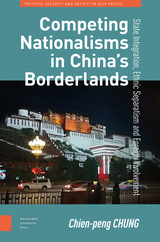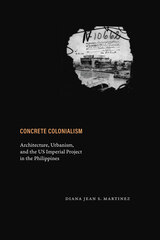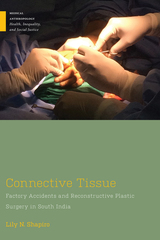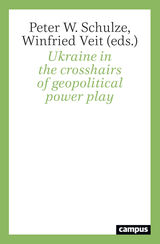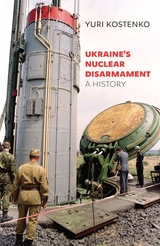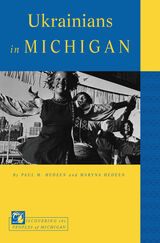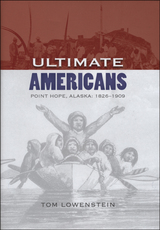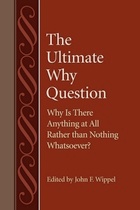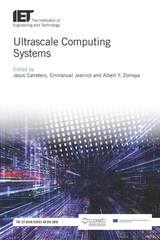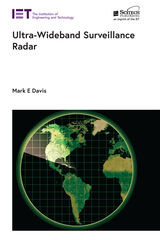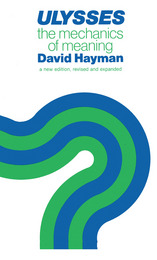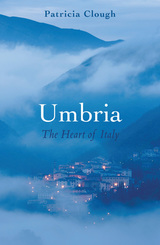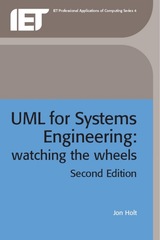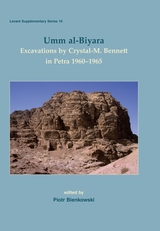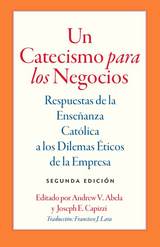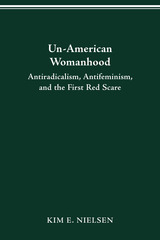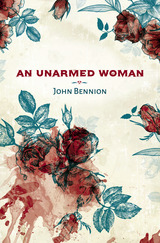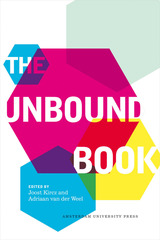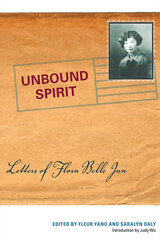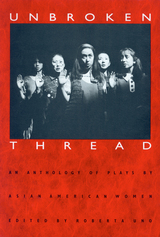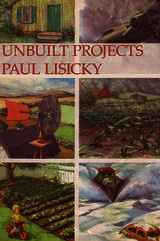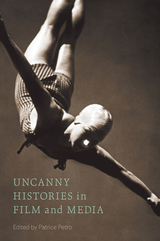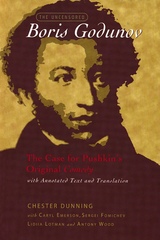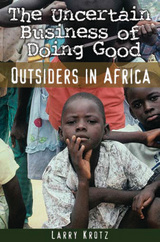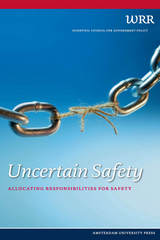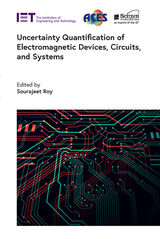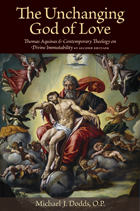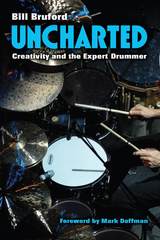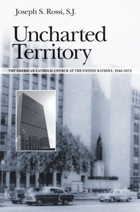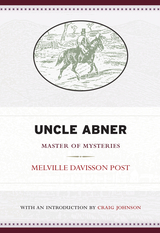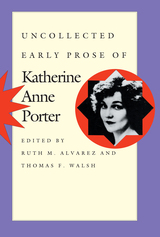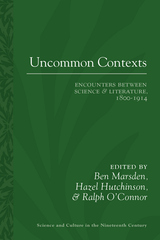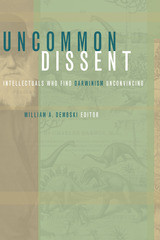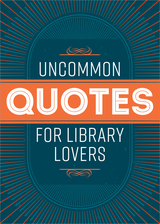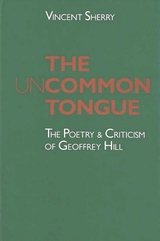 U S Catholic Press On Central America
Brett
University of Notre Dame Press, 2003 The U.S. Catholic Press on Central America traces the remarkable transformation in reports on Central America by popular Catholic periodicals in the second half of the twentieth century. In the 1950s writers for these periodicals vigorously opposed the Arbenz government in Guatemala. Influenced by McCarthyism, secular media coverage, and reports from the archdiocese of Guatemala City, they called on the U.S. government to overthrow the Arbenz regime before its "communism" infected the Americas. Just fifteen years later, these same writers were lamenting the collapse of the "reformist" Arbenz government and calling for the U.S. to reassess its policies toward the entire Central American isthmus.
What caused such a dramatic shift? In the first half of his compelling study, Edward T. Brett emphasizes the importance of U.S. missionaries in this evolutionary process. He carefully explains the effect of the murders of Archbishop Romero, the four U.S. churchwomen, and the six Jesuits and their housekeepers in El Salvador on reporting in Catholic journals. The second half of the book details the responses of the transformed U.S. Catholic press to the crises arising in Central America in the late 1970s and 80s.
Brett also devotes considerable attention to the methods of a small group of conservative Catholic publications, which, unlike the majority of Catholic periodicals, championed the policies of the Reagan administration on Central America. He concludes by placing the Catholic critique of U.S. Central American policy within the larger context of U.S. Catholic history. In so doing, he demonstrates that the American Catholic response to its government's isthmian policy marks the first time in history that the U.S. Catholic Church publicly opposed its government on an issue of foreign policy.
EDWARD T. BRETT is professor of history and department chair at La Roche College in Pittsburgh, Pennsylvania.
----------
"This is a meticulous and balanced study that chronicles the dramatic changes in Catholic social thinking on Latin America that took place between the overthrow of Guatemala's Jacobo Arbenz in 1954 and the electoral defeat of the Sandinistas in Nicaragua in 1990. More than just of study of the Catholic media, this book offers a clear-eyed alternative history of U.S. involvement in Central America. It is a ‘must read' for anyone seeking to understand Catholic political activism in Central America during the second half of the twentieth century." --Virginia Garrard-Burnett, University of Texas, Austin
"A seasoned commentator on Catholicism and social justice issues, Brett has written an absorbing account of the changing attitudes of U.S. Catholics toward Central America. His reflections on the interplay among the Catholic press, politics in Central America, and American involvement in the region, make this book a valuable contribution to the shaping of American Catholic identity." --Dana L. Robert, Boston University School of Theology
"Edward Brett's book makes a notable contribution to our understanding of Catholic media and U.S. foreign policy. The reader is pulled effortlessly into a fascinating study." --Edward L. Cleary, O.P., Providence College
"This is a truly excellent piece of research and analysis, with a writing style inviting even to the novice to U.S.-Central American relations." --History: Reviews of New Books
"This is a very good book, needed by every Catholic parish, high school, and college library."--American Catholic Studies
"This careful, well-documented study is a significant contribution to an understanding of the events and their interpretations that afflicted Central America between 1954 and 1990." --Catholic Library World
"Brett's book offers a unique, well researched avenue for understanding the complexity of religious, political, and social issues in Guatemala, Nicaragua, Honduras, and El Salvador." --Catholic Historical Review
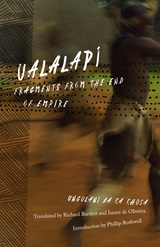 Ualalapi: Fragments from the End of Empire
Ungulani Ba Ka Khosa
Tagus Press, 2017
Ungulani Ba Ka Khosa first published Ualalapi: Fragments from the End of Empire in Portuguese in 1987. Named one of Africa's hundred best books of the twentieth century, it reflects on Mozambique's past and present through interconnected narratives related to the last ruler of the Gaza Empire, Ngungunhane. Defeated by the Portuguese in 1895, Ngungunhane was reclaimed for propaganda purposes by Mozambique's post-independence government as a national and nationalist hero. The regime celebrated his resistance to the colonial occupation of southern Mozambique as a precursor to the twentieth-century struggle for independence. In Ualalapi, Ungulani challenges that ideological celebration and portrays Ngungunhane as a despot, highlighting the violence and tyranny that were hallmarks of the Gaza Empire. This fresh look at the history of late nineteenth-century southeast Africa provides a prism through which to examine the machinations of those in power in Mozambique during the 1980s.
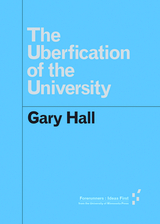 The Uberfication of the University
Gary Hall
University of Minnesota Press, 2016 Even after the 2008 financial crisis, neoliberalism has been able to advance its program of privatization and deregulation. The Uberfication of the University analyzes the emergence of the sharing economy—an economy that has little to do with sharing access to good and services and everything to do with selling this access—and the companies behind it: LinkedIn, Uber, and Airbnb. In this society, we all are encouraged to become microentrepreneurs of the self, acting as if we are our own precarious freelance enterprises at a time when we are being steadily deprived of employment rights, public services, and welfare support. The book considers the contemporary university, itself subject to such entrepreneurial practices, as one polemical site for the affirmative disruption of this model.
Forerunners is a thought-in-process series of breakthrough digital works. Written between fresh ideas and finished books, Forerunners draws on scholarly work initiated in notable blogs, social media, conference plenaries, journal articles, and the synergy of academic exchange. This is gray literature publishing: where intense thinking, change, and speculation take place in scholarship.
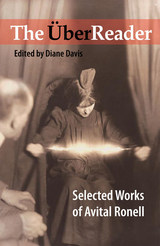 The UberReader: SELECTED WORKS OF AVITAL RONELL
Edited by Diane Davis
University of Illinois Press, 2007 "Avital Ronell has put together what must be one of the most remarkable critical oeuvres of our era… Zeugmatically yoking the slang of pop culture with philosophical analysis, forcing the confrontation of high literature and technology or drug culture, Avital Ronell produces sentences that startle, irritate, illuminate. At once hilarious and refractory, her books are like no others.”--Jonathan Culler, Diacritics
For twenty years Avital Ronell has stood at the forefront of the confrontation between literary study and European philosophy. She has tirelessly investigated the impact of technology on thinking and writing, with groundbreaking work on Heidegger, dependency and drug rhetoric, intelligence and artificial intelligence, and the obsession with testing. Admired for her insights and breadth of field, she has attracted a wide readership by writing with guts, candor, and wit.
Coyly alluding to Nietzsche’s “gay science,” The ÜberReader presents a solid introduction to Avital Ronell’s later oeuvre. It includes at least one selection from each of her books, two classic selections from a collection of her early essays (Finitude’s Score), previously uncollected interviews and essays, and some of her most powerful published and unpublished talks. An introduction by Diane Davis surveys Ronell’s career and the critical response to it thus far.
With its combination of brevity and power, this Ronell “primer” will be immensely useful to scholars, students, and teachers throughout the humanities, but particularly to graduate and undergraduate courses in contemporary theory.
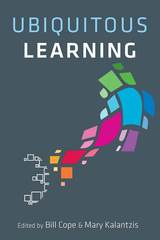 Ubiquitous Learning
Edited by Bill Cope and Mary Kalantzis
University of Illinois Press, 2009 This collection seeks to define the emerging field of "ubiquitous learning," an educational paradigm made possible in part by the omnipresence of digital media, supporting new modes of knowledge creation, communication, and access. As new media empower practically anyone to produce and disseminate knowledge, learning can now occur at any time and any place. The essays in this volume present key concepts, contextual factors, and current practices in this new field. Contributors are Simon J. Appleford, Patrick Berry, Jack Brighton, Bertram C. Bruce, Amber Buck, Nicholas C. Burbules, Orville Vernon Burton, Timothy Cash, Bill Cope, Alan Craig, Lisa Bouillion Diaz, Elizabeth M. Delacruz, Steve Downey, Guy Garnett, Steven E. Gump, Gail E. Hawisher, Caroline Haythornthwaite, Cory Holding, Wenhao David Huang, Eric Jakobsson, Tristan E. Johnson, Mary Kalantzis, Samuel Kamin, Karrie G. Karahalios, Joycelyn Landrum-Brown, Hannah Lee, Faye L. Lesht, Maria Lovett, Cheryl McFadden, Robert E. McGrath, James D. Myers, Christa Olson, James Onderdonk, Michael A. Peters, Evangeline S. Pianfetti, Paul Prior, Fazal Rizvi, Mei-Li Shih, Janine Solberg, Joseph Squier, Kona Taylor, Sharon Tettegah, Michael Twidale, Edee Norman Wiziecki, and Hanna Zhong.
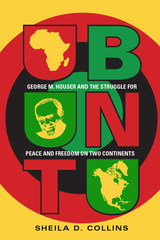 Ubuntu: George M. Houser and the Struggle for Peace and Freedom on Two Continents
Sheila D. Collins
Ohio University Press, 2020 This remarkable biography features a white American pacifist minister whose tireless work for justice and human rights helped reshape Black civil rights in the U.S. and Africa. George M. Houser (1916–2015) was one of the most important civil rights and antiwar activists of the twentieth century. A conscientious objector during World War II, in 1942 Houser cofounded and led the Congress of Racial Equality (CORE), whose embrace of nonviolent protest strategies and tactics characterized the modern American Civil Rights Movement. Beginning in the 1950s, Houser played a critical role in pan-Africanist anticolonial movements, and his more than thirty-year dedication to the cause of human rights and self-determination helped prepare the ground for the toppling of the South African apartheid regime. Throughout his life, Houser shunned publicity, preferring to let his actions speak his faith. Sheila Collins’s well-researched biography recounts the events that informed Houser’s life of activism—from his childhood experiences as the son of missionaries in the Philippines to his early grounding in the Social Gospel and the teachings of Mohandas Gandhi. In light of the corruption the U.S. and the world face today, Houser’s story of faith and decisive action for human rights and social justice is one for our time.
 Uchida Hyakken: A Critique of Modernity and Militarism in Prewar Japan
Rachel DiNitto
Harvard University Press, 2008 The literary career of Uchida Hyakken (1889–1971) encompassed a wide variety of styles and genres, including fiction, zuihitsu (essays), war diaries, poetry, travelogues, and children’s stories. In discussing his oeuvre, critics have circumscribed Hyakken to a private literary realm detached from the era in which he wrote.
Rachel DiNitto provides a critical corrective by locating in Hyakken’s simple yet powerful literary language a new way to appreciate the various literary reactions to the modernization of the early decades of the twentieth century and a means to open up a literary space of protest, an alternate intellectual response to the era of militarism.
This book takes up Hyakken’s fiction and essays written during Japan’s prewar years to investigate the intersection of his literature with the material and discursive surroundings of the time: a consumer-oriented print culture; the popular entertainment of film; the capitalist and cultural force of an emergent middle class; a planned, yet sprawling metropolis; and the war machine of an expanding Japanese empire. Emerging from this analysis is a writer who relied on the quotidian language of the everyday and the symbols of cultural modernism to counter the harsh realities of modernization and imperialism and to express sentiments contrary to the mainstream ideological rhetoric of the time.
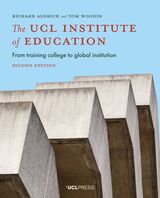 The UCL Institute of Education: From Training College to Global Institution, Second Edition
Richard Aldrich and Tom Woodin
University College London, 2021 The history of the Institute of Education at University College London from 1902 to 2020.
From its founding in 1902 as the London Day Training College to its establishment as a university institute and merger with University College London, the Institute of Education (IOE) has constantly grown into new areas of learning and social research. As a locus for leadership, it has exerted an influence upon the nature and direction of education nationally and internationally. Drawing upon a wide range of sources, the authors carefully develop the connections between the organization’s internal history and external historical developments. The result is an elegantly written history, characterized by substantial scholarship and analysis, and enlivened by illustrations and anecdotes. The pages of this book are studded with appearances by some of the most influential—and at times controversial—figures of education, including Sidney Webb, Cyril Burt, Susan Isaacs, Sophie Bryant, Richard Peters, Basil Bernstein, Ann Oakley, Celia Hoyles, and Stephen Ball. This edition extends Richard Aldrich’s text with two new chapters that speak to the extraordinary years of growth in the last two decades. The IOE is unique in successfully pursuing a world-leading research agenda while also supporting a wide range of teacher education, having an impact in London, across Britain, and the world.
 Uganda Now: Between Decay and Development
Hölger Bernt Hansen
Ohio University Press, 1988 Can the revolutionary government of Yoweri Museveni’s National Resistance Movement put Uganda back on the road from decay to development? These informed assessments put the present situation in context. The contributors assembled as Museveni’s guerrillas were launching their final bid for power. They have finalized their contributions in the light of the Museveni government’s initial period of power. Contributions by Ugandan academics and politicians interlock with those by scholars from across the world who have a concern for Uganda. Historians examine the period of colonialism. There are political studies of the quarter century since independence. There are detailed analyses of the economic realities for the Ugandan government in the period of international debt. The central role of education in national development is given due prominence. Ali A. Mazrui ends the book by asking ‘Is Africa Decaying?’ The editors have put the consideration of the case of Uganda’s recent history within the context of Africa’s development crisis. Uganda has presented in an aggravated form the crisis common to many other African countries: infrastructural breakdown, mounting foreign debt, military regimes and waves of refugees.
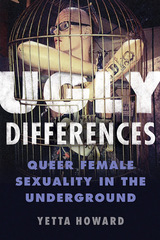 Ugly Differences: Queer Female Sexuality in the Underground
Yetta Howard
University of Illinois Press, 2018 What would it mean to turn to ugliness rather than turn away from it? Indeed, the idea of ugly often becomes synonymous with non-white, non-male, and non-heterosexual physicality and experience. That same pejorative migrates to become a label for practices within underground culture. In Ugly Differences, Yetta Howard uses underground contexts to theorize queer difference by locating ugliness at the intersection of the physical, experiential, and textual. From that nexus, Howard contends that ugliness—as a mode of pejorative identification—is fundamental to the cultural formations of queer female sexuality. Slava Tsukerman's postpunk film Liquid Sky, Sapphire's poetry, Roberta Gregory's Bitchy Butch comix, New Queer Cinema such as High Art—these and other non-canonical works contribute to an audacious critique. Howard reveals how the things we see, read as, or experience as ugly productively account for non-dominant sexual identities and creative practices. Ugly Differences offers eye-opening ways to approach queerness and its myriad underground representations.
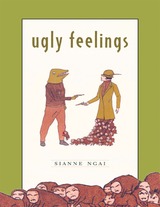 Ugly Feelings
Sianne Ngai
Harvard University Press, 2004 Envy, irritation, paranoia—in contrast to powerful and dynamic negative emotions like anger, these non-cathartic states of feeling are associated with situations in which action is blocked or suspended. In her examination of the cultural forms to which these affects give rise, Sianne Ngai suggests that these minor and more politically ambiguous feelings become all the more suited for diagnosing the character of late modernity.
Along with her inquiry into the aesthetics of unprestigious negative affects such as irritation, envy, and disgust, Ngai examines a racialized affect called “animatedness,” and a paradoxical synthesis of shock and boredom called “stuplimity.” She explores the politically equivocal work of these affective concepts in the cultural contexts where they seem most at stake, from academic feminist debates to the Harlem Renaissance, from late-twentieth-century American poetry to Hollywood film and network television. Through readings of Herman Melville, Nella Larsen, Sigmund Freud, Alfred Hitchcock, Gertrude Stein, Ralph Ellison, John Yau, and Bruce Andrews, among others, Ngai shows how art turns to ugly feelings as a site for interrogating its own suspended agency in the affirmative culture of a market society, where art is tolerated as essentially unthreatening.
Ngai mobilizes the aesthetics of ugly feelings to investigate not only ideological and representational dilemmas in literature—with a particular focus on those inflected by gender and race—but also blind spots in contemporary literary and cultural criticism. Her work maps a major intersection of literary studies, media and cultural studies, feminist studies, and aesthetic theory.
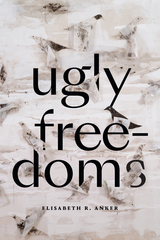 Ugly Freedoms
Elisabeth R. Anker
Duke University Press, 2022 In Ugly Freedoms Elisabeth R. Anker reckons with the complex legacy of freedom offered by liberal American democracy, outlining how the emphasis of individual liberty has always been entangled with white supremacy, settler colonialism, climate destruction, economic exploitation, and patriarchy. These “ugly freedoms” legitimate the right to exploit and subjugate others. At the same time, Anker locates an unexpected second type of ugly freedom in practices and situations often dismissed as demeaning, offensive, gross, and ineffectual but that provide sources of emancipatory potential. She analyzes both types of ugly freedom at work in a number of texts and locations, from political theory, art, and film to food, toxic dumps, and multispecies interactions. Whether examining how Kara Walker’s sugar sculpture A Subtlety, Or the Marvelous Sugar Baby reveals the importance of sugar plantations to liberal thought or how the impoverished neighborhoods in The Wire blunt neoliberalism’s violence, Anker shifts our perspective of freedom by contesting its idealized expressions and expanding the visions for what freedom can look like, who can exercise it, and how to build a world free from domination.
 Ugly Productions: An Aesthetics of Greek Drama
A. C. Duncan
University of Michigan Press, 2025 Amidst a culture otherwise obsessed with beauty, the Greek theater provided a unique space for Athenians to play with ugliness—to try these anti-ideals on for size. Such imaginative play was considered dangerous by some, such as Plato, who feared its corrupting influence; others, including Aristotle, saw the theater’s provocation and release of emotions as educational and even therapeutic. Sophocles’ and Euripides’ fifth-century audiences could not help but directly confront the ugliness of their drama, but as cultural memory of embodied productions faded, an abstracted contrast emerged between beautiful tragedy and ugly comedy—a pernicious aesthetic polarization that persists to this day. A. C. Duncan’s Ugly Productions embraces the materiality of the theater, arguing that dramatic aesthetics are best understood within affective frameworks where beauty or ugliness are produced through a dynamic interplay of verbal and visual modalities. Duncan reframes the Greek concept of “the ugly” not as mere “anti-beauty,” but as an affective disposition positively associated with such painful emotions as pity, fear, grief, and abjection.
Through studies of the figures of Xerxes, Electra, Philoctetes, Ajax, Heracles, and other tragic figures, Ugly Productions offers detailed analyses of the various ways ugliness was produced in performance with each chapter serving as an in-depth guide for studying the aesthetics of these works. Duncan confronts the historical neglect of ugliness in critical discourses, calling for a revaluation of negative aesthetics and renewed interest in the uglier aspects of these canonical works of theater.
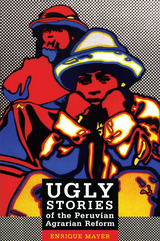 Ugly Stories of the Peruvian Agrarian Reform
Enrique Mayer
Duke University Press, 2009 Ugly Stories of the Peruvian Agrarian Reform reveals the human drama behind the radical agrarian reform that unfolded in Peru during the final three decades of the twentieth century. That process began in 1969, when the left-leaning military government implemented a drastic program of land expropriation. Seized lands were turned into worker-managed cooperatives. After those cooperatives began to falter and the country returned to civilian rule in the 1980s, members distributed the land among themselves. In 1995–96, as the agrarian reform process was winding down and neoliberal policies were undoing leftist reforms, the Peruvian anthropologist Enrique Mayer traveled throughout the country, interviewing people who had lived through the most tumultuous years of agrarian reform, recording their memories and their stories. While agrarian reform caused enormous upheaval, controversy, and disappointment, it did succeed in breaking up the unjust and oppressive hacienda system. Mayer contends that the demise of that system is as important as the liberation of slaves in the Americas. Mayer interviewed ex-landlords, land expropriators, politicians, government bureaucrats, intellectuals, peasant leaders, activists, ranchers, members of farming families, and others. Weaving their impassioned recollections with his own commentary, he offers a series of dramatic narratives, each one centered around a specific instance of land expropriation, collective enterprise, and disillusion. Although the reform began with high hopes, it was quickly complicated by difficulties including corruption, rural and urban unrest, fights over land, and delays in modernization. As he provides insight into how important historical events are remembered, Mayer re-evaluates Peru’s military government (1969–79), its audacious agrarian reform program, and what that reform meant to Peruvians from all walks of life.
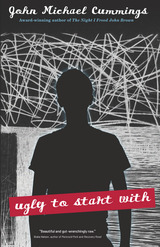 Ugly to Start With
John Michael Cummings
West Virginia University Press, 2011 Jason Stevens is growing up in picturesque, historic Harpers Ferry, West Virginia in the 1970s. Back when the roads are smaller, the cars slower, the people more colorful, and Washington, D.C. is way across the mountains—a winding sixty-five miles away.
Jason dreams of going to art school in the city, but he must first survive his teenage years. He witnesses a street artist from Italy charm his mother from the backseat of the family car. He stands up to an abusive husband—and then feels sorry for the jerk. He puts up with his father’s hard-skulled backwoods ways, his grandfather’s showy younger wife, and the fist-throwing schoolmates and eccentric mountain characters that make up Harpers Ferry—all topped off by a basement art project with a girl from the poor side of town. Ugly to Start With punctuates the exuberant highs, bewildering midpoints, and painful lows of growing up, and affirms that adolescent dreams and desires are often fulfilled in surprising ways.
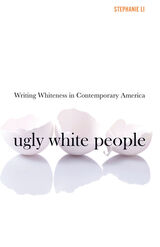 Ugly White People: Writing Whiteness in Contemporary America
Stephanie Li
University of Minnesota Press, 2023 Whiteness revealed: an analysis of the destructive complacency of white self-consciousness White Americans are confronting their whiteness more than ever before, with political and social shifts ushering in a newfound racial awareness. And with white people increasingly seeing themselves as distinctly racialized (not simply as American or human), white writers are exposing a self-awareness of white racialized behavior—from staunch antiracism to virulent forms of xenophobic nationalism. Ugly White People explores representations of whiteness from twenty-first-century white American authors, revealing white recognition of the ugly forms whiteness can take. Stephanie Li argues that much of the twenty-first century has been defined by this rising consciousness of whiteness because of the imminent shift to a “majority minority” population and the growing diversification of America’s political, social, and cultural institutions. The result is literature that more directly grapples with whiteness as its own construct rather than a wrongly assumed norm. Li contextualizes a series of literary novels as collectively influenced by changes in racial and political attitudes. Turning to works by Dave Eggers, Sarah Smarsh, J. D. Vance, Claire Messud, Ben Lerner, and others, she traces the responses to white consciousness that breed shared manifestations of ugliness. The tension between acknowledging whiteness as an identity built on domination and the failure to remedy inequalities that have proliferated from this founding injustice is often the source of the ugly whiteness portrayed through these narratives. The questions posed in Ugly White People about the nature and future of whiteness are vital to understanding contemporary race relations in America. From the election of Trump and the rise of white nationalism to Karen memes and the war against critical race theory to the pervasive pattern of behavior among largely liberal-leaning whites, Li elucidates truths about whiteness that challenge any hope of national unity and, most devastatingly, the basic humanity of others. Retail e-book files for this title are screen-reader friendly.
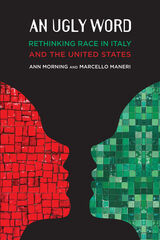 An Ugly Word: Rethinking Race in Italy and the United States
Ann Morning
Russell Sage Foundation, 2022 Scholars and politicians often assume a significant gap between the ways that Americans and Europeans think about race. According to this template, in the U.S. race is associated with physical characteristics, while in Western Europe race has disappeared, and discrimination is based on insurmountable cultural differences. However, little research has addressed how average Americans and Europeans actually think and talk about race. In An Ugly Word, sociologists Ann Morning and Marcello Maneri examine American and Italian understandings of group difference in order to determine if and how they may differ.
Morning and Maneri interviewed over 150 people across the two countries about differences among what they refer to as “descent-based groups.” Using this concept allowed them to sidestep the language of “race” and “ethnicity,” which can be unnecessarily narrow, poorly defined, or even offensive to some. Drawing on these interviews, the authors find that while ways of speaking about group difference vary considerably across the Atlantic, underlying beliefs about it do not. The similarity in American and Italian understandings of difference was particularly evident when discussing sports. Both groups relied heavily on traditional stereotypes of Black physicality to explain Black athletes’ overrepresentation in sports like U.S. football and their underrepresentation in sports like swimming – contradicting the claims that a biological notion of race is a distinctly American phenomenon.
While American and Italian concepts of difference may overlap extensively, they are not identical. Interviews in Italy were more likely to reveal beliefs about groups’ innate, unchangeable temperaments, such as friendly Senegalese and dishonest Roma. And where physical difference was seen by Italians as superficial and unimportant, cultural difference was perceived as deeply meaningful and consequential. In contrast, U.S. interviewees saw cultural difference as supremely malleable—and often ascribed the same fluidity to racial identity, which they believed stemmed from culture as well as biology. In light of their findings, Morning and Maneri propose a new approach to understanding cross-cultural beliefs about descent-based difference that includes identifying the traits people believe differentiate groups, how they believe those traits are acquired, and whether they believe these traits can change.
An Ugly Word is an illuminating, cross-national examination of the ways in which people around the world make sense of race and difference.
u&i
Cassandra Smith
Omnidawn, 2015 u&i is a meditation on the imaginary—what exists and what doesn’t, how does something exist when it knows it is imaginary, how is it to be reckoned with. u&i asks what exists when a book is written. u&i is telling a story to the things that are actual loss. Things that are gone become further proof of existence and not. u&i asks what are the can and can’t of existence, as well as the cant of existence—the domestic and repeating cant, as things circle themselves until they think they exist a little more. There is, in u&i, cant as incantation.
 Ujamaa’s Army: The Creation and Evolution of the Tanzania People's Defence Force, 1964–1979
Charles G. Thomas
Ohio University Press, 2024 The immediate postcolonial moment brought both promise and peril for the states of Africa and their security. The process of decolonization generated instability, and the emergent Cold War caught up the still-fragile independent states in a global ideological struggle between superpowers. While the political story of these states has been written in detail, the story of their militaries has been largely inaccessible, leaving only sketches of the coups, mutinies, and overall failures of security that outside observers could chronicle. Ujamaa’s Army traces the evolution of the Tanzania People’s Defence Force from its inception in 1964 following the broader East African uprisings to its fully realized form on the eve of Tanzania’s 1978 conflict with Uganda. The book gathers primary interviews with key military actors within Tanzania and interweaves their narratives with archival sources to produce a detailed history of the culmination of President Julius Nyerere’s ideological project and the military leadership’s vision of a professional and effective force for guarding the nation and supporting liberation struggles across Southern Africa.
The Ukraine, 1917–1921: A Study in Revolution
Taras Hunczak
Harvard University Press, 1977 The Ukraine, which had for centuries been ruled by other nations, finally gained its independence for a brief period after the First World War. During this revolutionary era, a series of Ukrainian governments were established whose political spectrum ranged from anarchism to monarchical rule. This comprehensive volume edited by Taras Hunczak includes fourteen articles by leading specialists, and is the first scholarly treatment of the problem to appear in twenty-five years.
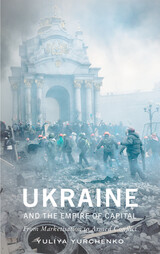 Ukraine and the Empire of Capital: From Marketisation to Armed Conflict
Yuliya Yurchenko
Pluto Press, 2017 Since 1991, nominally independent Ukraine has been in turmoil, with the Orange Revolution and the Maidan protests marking its most critical moments. Now, its borders are threatened and the civil unrest and armed conflict continue to destabilise the country. In order to understand these dramatic events, Yuliya Yurchenko looks to the country’s post-Soviet past in this ambitious analysis of contemporary Ukrainian political economy.
Providing distinctive and unexplored reflections on the origins of the conflict, Yurchenko unpacks the four central myths that underlie Ukraine's post-Soviet reality: the myth of transition, the myth of democracy, the myth of two Ukraines, and the myth of 'the other'. In doing so, she sheds light on the current intensification of class rivalries in Ukraine, the kleptocracy, resource wars and analyses existing and potential dangers of the rightwing shift in Ukraine's polity, stressing a historic opportunity for change.
Critiquing the concept of Ukraine as ‘transition space’, she provides a sweeping analysis which includes the wider neoliberal restructuring of global political economy since the 1970s, with particular focus on Ukraine's relations with the US, the EU and Russia. This is a book for those wanting to understand the current conflict as a dangerous product of neoliberalism, of the empire of capital.
 Ukraine as a Migration Nexus: Perspectives on Historical and Current Population Movements
Oleksii Chebotarov
Central European University Press, 2025 This OER project examines Ukraine as a central hub in global migration and mobility, offering critical perspectives on both historical and contemporary population movements. The volume brings together case studies focused on the migration dynamics within Ukraine and its surrounding territories, integrating these with broader global migration processes. The authors critically engage with migration studies methodologies, offering fresh, empirical insights into issues like displacement, migration governance, and identity formation in the context of Ukraine's socio-political landscape. By combining historical narratives with modern theoretical approaches, the book explores how migration has shaped and continues to shape, the region’s cultural, political, and social fabric. It provides an innovative contribution to migration research, highlighting the intersection of mobility, belonging, and political contexts, particularly within East Central Europe. This collection challenges traditional migration frameworks and invites a reevaluation of established migration paradigms through the lens of Ukrainian lands.
Ukraine in the Crosshairs of Geopolitical Power Play
Edited by Peter W. Schulze and Winfried Veit
Campus Verlag, 2020 An overview of both European and Russian objectives in Ukraine.
Peace in Ukraine seemed possible following Volodymyr Zelensky’s 2019 election. The new president reopened conversations with both the European Union and separatist authorities, bringing an end to the Donbass conflict in sight. Such an achievement promised revitalized talks between Europe and Russia, and so the nearly forgotten conflict returned to global prominence. Ukraine in the Crosshairs of Geopolitical Power Play analyzes why European and Russian objectives in Ukraine place daunting limits of any potential compromise.
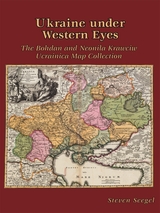 Ukraine under Western Eyes: The Bohdan and Neonila Krawciw Ucrainica Map Collection
Steven Seegel
Harvard University Press From the Renaissance to the Enlightenment, the geopolitical placement of Ukraine drew the attention of some of Europe’s most influential cartographers. Many of these maps, including ones of exceptional rarity, were collected by the Ukrainian scholar and journalist Bohdan Krawciw.
Krawciw traced the physical and aesthetic depiction of Ukraine across its changing borders as a means of self-recognition and as a cultural and political history of the contested nation and its peoples. Of special interest are his maps of Ukraine from the nineteenth and twentieth centuries, at the crossroads of four empires: Habsburg, Ottoman, Russian, and Soviet.
As part of his personal archive, Krawciw’s maps were bequeathed to Harvard University upon his death in 1975. This book serves as both a catalog of his collection and a description of how the maps he collected serve as an invaluable source for Ukraine’s history and a symbol of Ukrainian national identity. The book contains nearly 100 examples from the collection, many in full color, as well as indices listing maps by cartographer and by place name.
 Ukraine, War, Love: A Donetsk Diary
Olena Stiazhkina
Harvard University Press, 2024 In Ukraine, War, Love, Olena Stiazhkina depicts day-to-day developments in and around her beloved hometown Donetsk during Russia’s 2014 invasion and occupation of the Ukrainian city. An award-winning fiction writer, Stiazhkina chronicles an increasingly harrowing series of events with sarcasm, anger, humor, and love.
The diary opens on March 2, 2014, as the first wave of pro-Russian protest washes over eastern Ukraine in the wake of Euromaidan, the Revolution of Dignity, and it closes on August 18, 2014, the day a convoy of civilian Ukrainian refugees is deliberately slaughtered by Russian forces. Early on, Stiazhkina is captured by pro-Russian forces while she browses for books but is freed when one of her captors turns out to be a former student. Vignettes from her personal life intermingle with current events, and she examines ordinary people in extraordinary circumstances. We walk with local dogs and their owners; we meet a formidable apartment building manager who shames occupiers and dismantles their artillery from the roof of her building; we follow a family evacuated to Kyiv whose young son builds checkpoints out of Legos. Olena Stiazhkina’s Ukraine, War, Love: A Donetsk Diary is a fierce love letter to her country, her city, and her people.
Ukraine’s Nuclear Disarmament: A History
Yuri Kostenko
Harvard University Press, 2021 In December 1994, Ukraine gave up the third-largest nuclear arsenal in the world and signed the Non-Proliferation Treaty, having received assurances that its sovereignty would be respected and secured by Russia, the United States, and the United Kingdom. Based on original and heretofore unavailable documents, Yuri Kostenko’s account of the negotiations between Ukraine, Russia, and the US reveals for the first time the internal debates of the Ukrainian government as well as the pressure exerted upon it by its international partners.
Kostenko presents an insider’s view on the issue of nuclear disarmament and raises the question of whether the complete and immediate dismantlement of the country’s enormous nuclear arsenal was strategically the right decision, especially in view of the 2014 annexation of Crimea by Russia, one of the guarantors of Ukraine’s sovereignty under denuclearization.
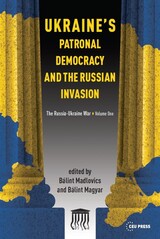 Ukraine's Patronal Democracy and the Russian Invasion: The Russia-Ukraine War, Volume One
Bálint Madlovics
Central European University Press, 2023 The Russian invasion of Ukraine in 2022 jeopardizes the country's independence and its chances for Western-style development. However, the heroic attitude of the Ukrainian people, combined with a solidifying national identity, makes the domestic foundations for a western turn stronger than ever. After the invasion, building strong foundations of liberal democracy will be a top priority. In addition to alleviating immediate problems, the country must also address its post-communist legacy and address the constraints of patronalism. The authors of this edited volume, leading Ukrainian scholars supplemented by colleagues from Hungary, examine the chances of an anti-patronal transformation after the war. The book provides an overview of the development of Ukraine's political-economic system: color revolutions in 2004 and 2014 brought democratic transformation, but no change in the patronage system The result was patronal regime cycles instead of the emergence of a Western-type liberal democracy in the country. Building on the conceptual framework of the editors' The Anatomy of Post-Communist Regimes (CEU Press, 2020), the 12 chapters examine the impact of the war on patronal democracy, the relational economy, clientelist society, and the international environment in which Ukraine operates. This collection is complemented by the book entitled Russia. Imperial Endeavor and Geopolitical Consequences.
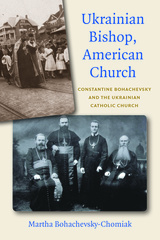 Ukrainian Bishop, American Church
Martha Bohachevsky-Chomiak
Catholic University of America Press, 2018 Constantine Bohachevsky was not a typical bishop. On the eve of his unexpected nomination as bishop to the Ukrainian Catholics in America, in March 1924, the Vatican secretly whisked him from Warsaw to Rome to be ordained. He arrived in America that August to a bankrupt church and a hostile clergy. He stood his ground, and chose to live а simple missionary life. He eschewed public pomp, as did his immigrant congregations. He regularly visited his scattered churches. He fought a bitter fight for the independence of the church from outside interference – a kind of struggle between the Church and the state, absent both. He refashioned a failing immigrant church in America into a self-sustaining institution that half a century after his death could help resurrect the underground Catholic Church in Ukraine, which became the largest Eastern Catholic church today. This trailblazing biography, based on recently opened sources from the Vatican, Ukraine and the United States, brings the reader from the placid life of the married Catholic Ukrainian clergy in the Habsburg Empire to industrial America.
The Ukrainian Challenge: Reforming Labour Market and Social Policy
ILO-CEET ILO-CEET
Central European University Press, 1995 In the coming period it will be essential for Ukraine, which currently has to face a combination of massive economic decline, hyperinflation and growing open as well as hidden unemployment, to give a very high priority to the substantial reform of labour market and social policy. This book attempts to assess the trends in social and labour market policy in Ukraine and to help to identify the priorities to follow in the restructuring of the Ukrainian economy and the reform of social policy.
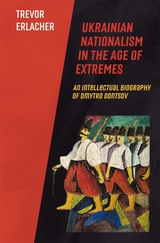 Ukrainian Nationalism in the Age of Extremes: An Intellectual Biography of Dmytro Dontsov
Trevor Erlacher
Harvard University Press, 2021 Ukrainian nationalism made worldwide news after the Euromaidan revolution and the outbreak of the Russo-Ukrainian war in 2014. Invoked by regional actors and international commentators, the “integral” Ukrainian nationalism of the 1930s has moved to the center of debates about Eastern Europe, but the history of this divisive ideology remains poorly understood.
This timely book by Trevor Erlacher is the first English-language biography of the doctrine’s founder, Dmytro Dontsov (1883–1973), the “spiritual father” of the Organization of Ukrainian Nationalists. Organizing his research of the period around Dontsov’s life, Erlacher has written a global intellectual history of Ukrainian integral nationalism from late imperial Russia to postwar North America, with relevance for every student of the history of modern Europe and the diaspora.
Thanks to the circumstances of Dontsov’s itinerant, ninety-year life, this microhistorical approach allows for a geographically, chronologically, and thematically broad yet personal view on the topic. Dontsov shaped and embodied Ukrainian politics and culture as a journalist, diplomat, literary critic, publicist, and ideologue, progressing from heterodox Marxism, to avant-garde fascism, to theocratic traditionalism.
Drawing upon archival research in Ukraine, Poland, and Canada, this book contextualizes Dontsov’s works, activities, and identity formation diachronically, reconstructing the cultural, political, urban, and intellectual milieus within which he developed and disseminated his worldview.
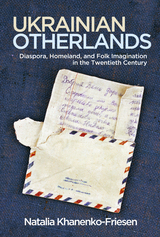 Ukrainian Otherlands: Diaspora, Homeland, and Folk Imagination in the Twentieth Century
Natalia Khanenko-Friesen
University of Wisconsin Press, 2015 What happens to ethnic communities when they have two homelands to love—one real and immediate, the other distant but treasured in the heart and imagination?
Ukrainian Otherlands is an innovative exploration of modern ethnic identity, focused on diaspora/homeland understandings of each other in Ukraine and in Ukrainian ethnic communities around the globe. Exploring a rich array of folk songs, poetry and stories, trans-Atlantic correspondence, family histories, and rituals of homecoming and hosting that developed in the Ukrainian diaspora and Ukraine during the twentieth century, Natalia Khanenko-Friesen asserts that many important aspects of modern ethnic identity form, develop, and reveal themselves not only through the diaspora's continued yearning for the homeland, but also in a homeland's deeply felt connection to its diaspora. Yet, she finds each group imagines the "otherland" and ethnic identity differently, leading to misunderstandings between Ukrainians and their ethnic-Ukrainian "brothers and sisters" abroad.
An innovative exploration of the persistence of vernacular culture in the modern world, Ukrainian Otherlands, amply informed by theory and fieldwork, will appeal to those interested in folklore, ethnic and diaspora studies, modernity, migration, folk psychology, history, and cultural anthropology.
The Ukrainian Question: Russian Empire and Nationalism in the 19th Century
Alexei Miller
Central European University Press, 2003 This pioneering work treats the Ukrainian question in Russian imperial policy and its importance for the intelligentsia of the empire. Miller sets the Russian Empire in the context of modernizing and occasionally nationalizing great power states and discusses the process of incorporating the Ukraine, better known as "Little Russia" in that time, into the Romanov Empire in the late 18th and 19th centuries. This territorial expansion evolved into a competition of mutually exclusive concepts of Russian and Ukrainian nation-building projects.
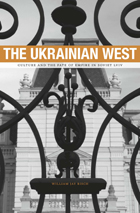 The Ukrainian West: Culture and the Fate of Empire in Soviet Lviv
William Jay Risch
Harvard University Press, 2011 In 1990, months before crowds in Moscow and other major cities dismantled their monuments to Lenin, residents of the western Ukrainian city of Lviv toppled theirs. William Jay Risch argues that Soviet politics of empire inadvertently shaped this anti-Soviet city, and that opposition from the periphery as much as from the imperial center was instrumental in unraveling the Soviet Union.
Lviv’s borderlands identity was defined by complicated relationships with its Polish neighbor, its imperial Soviet occupier, and the real and imagined West. The city’s intellectuals—working through compromise rather than overt opposition—strained the limits of censorship in order to achieve greater public use of Ukrainian language and literary expression, and challenged state-sanctioned histories with their collective memory of the recent past. Lviv’s post–Stalin-generation youth, to which Risch pays particular attention, forged alternative social spaces where their enthusiasm for high culture, politics, soccer, music, and film could be shared.
The Ukrainian West enriches our understanding not only of the Soviet Union’s postwar evolution but also of the role urban spaces, cosmopolitan identities, and border regions play in the development of nations and empires. And it calls into question many of our assumptions about the regional divisions that have characterized politics in Ukraine. Risch shines a bright light on the political, social, and cultural history that turned this once-peripheral city into a Soviet window on the West.
 Ukrainian Witchcraft Trials: Volhynia, Podolia, and Ruthenia, 17th–18th Centuries
Kateryna Dysa
Central European University Press, 2020 Drawing on quantitative data drawn from a range of trials Kateryna Dysa first describes the ideological background of the tribunals based on works written by priests and theologians that reflect attitudes toward the devil and witches. The main focus of her work, however, is the process leading to witchcraft accusations. From the stories of participants of the trials she shows what led people to enunciate first suspicions then accusations of witchcraft. Finally, she presents a microhistory from one Volhynian village, comparing attitudes toward two “female crimes” in the Ukrainian courts. The study is based on archival research including witch trials transcripts. Dysa approaches the trials as indications of belief and practice, attempting to understand the actors involved rather than dismiss or condemn them. She takes care to situate early modern Ukrainian witchcraft and its accompanying trials in a broader European context, with comparisons to some African cases as well.
Ukrainians in Michigan
Paul M. Hedeen
Michigan State University Press, 2023 This history of Ukrainian immigrants in Michigan and their American descendants examines both the choices people made and the social forces that impelled their decisions to migrate and to make new homes in the state. Michigan’s Ukrainians came in four waves, each unique in time and character, beginning in the late nineteenth century and continuing in the twenty-first. Detroit attracted many of them with the opportunities it offered in its booming automobile industry. Yet others put down roots in cities and towns across the state. Wherever they settled, they established churches and community centers and continued to practice the customs of their homeland. Many Ukrainian Americans have made significant contributions to Michigan and the United States, including those who are showcased in this book. This comprehensive text also highlights cultural practices and traditional foods cherished by community members.
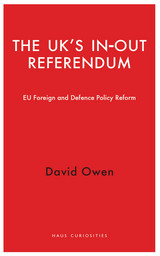 The UK's In-Out Referendum: EU Foreign and Defence Policy Reform
David Owen
Haus Publishing, 2016 As David Owen notes in The UK’s In-Out Referendum, the European Union’s attempts at conflict resolution have left much to be desired. In the Ukraine, Baltic States, Turkey, and much of the Middle East, a lack of coherent policy has dominated. This book argues that the negotiations around the United Kingdom’s referendum vote represent an opportunity to enact wide-scale reform, not least to ensure that the nations of an increasingly politically integrated Eurozone do not come to dominate the foreign and security policy of the European Union in the years to come. To allow them to do so, Owen argues, would almost certainly see the policy of “common defense” advance at the expense of a lasting US commitment to NATO. Ultimately, Owen contends, Britain’s continued membership of a largely unreformed European Union would have serious implications for the United Kingdom’s security, and that foreign policy and security belong at the heart of the reforms the European Union so desperately needs.
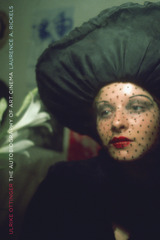 Ulrike Ottinger: The Autobiography of Art Cinema
Laurence A. Rickels
University of Minnesota Press, 2008
Since 1974, German filmmaker Ulrike Ottinger has created a substantial body of films that explore a world of difference defined by the tension and transfer between settled and nomadic ways of life. In many of her films, including Exile Shanghai, an experimental documentary about the Jews of Shanghai, and Joan of Arc of Mongolia, in which passengers on the Trans-Siberian Express are abducted by Mongolian bandits, she also probes the encounter with the other, whether exotic or simply unpredictable.
In Ulrike Ottinger Laurence A. Rickels offers a series of sensitive and original analyses of Ottinger’s films, as well as her more recent photographic artworks, situated within a dazzling thought experiment centered on the history of art cinema through the turn of the twenty-first century. In addition to commemorating the death of a once-vital art form, this book also affirms Ottinger’s defiantly optimistic turn toward the documentary film as a means of mediating present clashes between tradition and modernity, between the local and the global.
Widely regarded as a singular and provocative talent, Ottinger’s conspicuous absence from critical discourse is, for Rickels, symptomatic of the art cinema’s demise. Incorporating interviews he conducted with Ottinger and illustrated with stunning examples from her photographic oeuvre, this book takes up the challenges posed by Ottinger’s filmography to interrogate, ultimately, the very practice-and possibility-of art cinema today.
Laurence A. Rickels is professor of German and comparative literature at the University of California, Santa Barbara, and the author of several books, including The Case of California, The Vampire Lectures, and the three-volume Nazi Psychoanalysis (all published by Minnesota). He is a recognized art writer whose reflections on contemporary visual art appear regularly in numerous exhibition catalogues as well as in Artforum, artUS, and Flash Art.
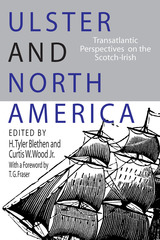 Ulster and North America: Transatlantic Perspectives on the Scotch Irish
H. Tyler Blethen
University of Alabama Press, 2001 This collection of thought-provoking essays addresses the complex issues of Ulster Scots history and ethnic identity by viewing them from a transatlantic and comparative perspective. The 11 essays in this volume, originally presented at meetings of the Ulster-American Heritage Symposium by scholars from Scotland, Ireland, Canada, and the United States, explore the nature of Scotch-Irish culture by examining values, traditions, demographics, and language. The essays also investigate the process of migration, which transmitted that culture to the New World, and the subsequent assimilation of Celtic ways into American culture. The themes presented are wide-ranging and complex. First is the dynamic nature of Ulster society in the 17th and 18th centuries and the rapid changes occurring there, especially those affecting Presbyterianism and community cohesiveness. Also examined is the experience of migration, asking such questions as who migrated and when, what their expectations were, and how closely colonial reality matched those expectations. A third theme is the development of economic strategies and community-building both in Ulster and North America, making important contributions to the "new rural history" and explaining the success of the Scotch-Irish on the American frontier. Finally, the volume addresses ethnic identity and cultural diffusion, advancing the ongoing debate initiated by Forrest McDonald and Grady McWhiney and elaborated on by David Hackett Fischer. Ulster and North America illustrates the value of transatlantic dialog and of comparative studies for the understanding of ethnicity and migration history.
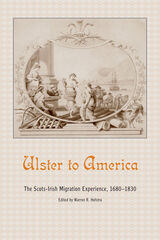 Ulster to America: The Scots-Irish Migration Experience, 1680–1830
Warren R. Hofstra
University of Tennessee Press, 2021
In Ulster to America: The Scots-Irish Migration Experience, 1680–1830, editor Warren R. Hofstra has gathered contributions from pioneering scholars who are rewriting the history of the Scots-Irish. In addition to presenting fresh information based on thorough and detailed research, they offer cutting-edge interpretations that help explain the Scots-Irish experience in the United States. In place of implacable Scots-Irish individualism, the writers stress the urge to build communities among Ulster immigrants. In place of rootlessness and isolation, the authors point to the trans-Atlantic continuity of Scots-Irish settlement and the presence of Germans and Anglo-Americans in so-called Scots-Irish areas. In a variety of ways, the book asserts, the Scots-Irish actually modified or abandoned some of their own cultural traits as a result of interacting with people of other backgrounds and in response to many of the main themes defining American history.
While the Scots-Irish myth has proved useful over time to various groups with their own agendas—including modern-day conservatives and fundamentalist Christians—this book, by clearing away long-standing but erroneous ideas about the Scots-Irish, represents a major advance in our understanding of these immigrants. It also places Scots-Irish migration within the broader context of the historiographical construct of the Atlantic world.
Organized in chronological and migratory order, this volume includes contributions on specific U.S. centers for Ulster immigrants: New Castle, Delaware; Donegal Springs, Pennsylvania; Carlisle, Pennsylvania; Opequon, Virginia; the Virginia frontier; the Carolina backcountry; southwestern Pennsylvania, and Kentucky. Ulster to America is essential reading for scholars and students of American history, immigration history, local history, and the colonial era, as well as all those who seek a fuller understanding of the Scots-Irish immigrant story.
 Ultima and Worldbuilding in the Computer Role-Playing Game
Carly A. Kocurek and Matthew Thomas Payne
Amherst College Press, 2024 Ultima and World-Building in the Computer Role-Playing Game is the first scholarly book to focus exclusively on the long-running Ultima series of computer role-playing games (RPG) and to assess its lasting impact on the RPG genre and video game industry. Through archival and popular media sources, examinations of fan communities, and the game itself, this book historicizes the games and their authors. By attending to the salient moments and sites of game creation throughout the series’ storied past, authors Carly A. Kocurek and Matthew Thomas Payne detail the creative choices and structural forces that brought Ultima’s celebrated brand of role-playing to fruition.
This book first considers the contributions of series founder and lead designer, Richard Garriott, examining how his fame and notoriety as a pioneering computer game auteur shaped Ultima’s reception and paved the way for the evolution of the series. Next, the authors retrace the steps that Garriott took in fusing analog, tabletop role-playing with his self-taught lessons in computer programming. Close textual analyses of Ultima I outline how its gameplay elements offered a foundational framework for subsequent innovations in design and storytelling. Moving beyond the game itself, the authors assess how marketing materials and physical collectibles amplified its immersive hold and how the series’ legions of fans have preserved the series. Game designers, long-time gamers, and fans will enjoy digging into the games’ production history and mechanics while media studies and game scholars will find Ultima and World-Building in the Computer Role-Playing Game a useful extension of inquiry into authorship, media history, and the role of fantasy in computer game design.
Ultimate Americans: Point Hope Alaska: 1826-1909
Tom Lowenstein
University of Alaska Press, 2008 The third volume in a series on Point Hope, Alaska, Ultimate Americans examines the first encounters between the native Tikigaq people and Anglo-Americans during the nineteenth century. Tom Lowenstein investigates the interactions between Native Alaskans, commercial whalemen, and missionaries in Point Hope, charting the destabilizing elements of alcohol and disease among Native populations, as well as cultural collisions and the eventual mutual assimilation of the groups. An in-depth historical chronicle, Ultimate Americans will be invaluable reading for historians, ethnographers, and anthropologists alike.
 The Ultimate Chicago Pizza Guide: A History of Squares & Slices in the Windy City
Steve Dolinsky
Northwestern University Press, 2021 The Ultimate Chicago Pizza Guide is your comprehensive guide to the history of the styles, locales, and people that make the Windy City a prime destination for slices and pies. Most locals have strong opinions about whether thin, tavern-style, or deep-dish takes the crown, which toppings are essential, and who makes the best pie in town—and in Chicago, there's a destination for every preference. During the COVID-19 pandemic, Chicago saw an unprecedented number of new pizzerias opening their doors, very few of which focused on the proverbial deep-dish. Several high-end chefs made the pivot to pizza, and in many cases, brought new ideas and styles, like East Coast Sicilians and thin, crispy (and cheeseless) Roman pies. With so many slices to try in the city’s seventy-seven neighborhoods, it would seem impossible to find the best of the best.
Enter renowned food journalist Steve Dolinsky. He embarked on a memorable quest for his first book, Pizza City, USA: 101 Reasons Why Chicago Is America’s Greatest Pizza Town, tasting more than 185 pizzas all over the region. For his follow-up, Dolinsky focuses on the city’s pizzerias, while still honoring a few suburban stalwarts.
This user-friendly guide is organized by pizza style—including thin, tavern, artisan, Neapolitan, deep-dish, stuffed, by-the-slice, Roman, and Detroit—so you can find the right recommendation for every family member, visitor, and occasion. Dolinsky highlights his favorites, offers a pizza lover’s glossary so you can order like a pro, and shows you every pie he ate, so you can compare notes and cook up your next pizza night. With recipes, local beer pairings, gluten-free options, and more, The Ultimate Chicago Pizza Guide is an essential resource both for locals and for visitors in search of a serious pizza getaway.
 The Ultimate Guide to the Jersey Shore: Where to Eat, What to Do, and so Much More
Peter Genovese
Rutgers University Press, 2023 The Jersey Shore, our most treasured asset, the envy of forty-nine other states, comes alive in this new book by the reporter and writer who knows New Jersey—and the Jersey Shore—best. Every conceivable topic—where to eat, where to stay, landmarks and attractions, what to do with the kids—is covered with the kind of inside information you just won’t find on tourism web sites or Facebook. All one hundred-plus Shore towns are included, from Sandy Hook to Cape May. There are hundreds of restaurant listings and recommendations. The book also contains engaging profiles and vignettes of the people and places that give the Shore its special character and charm. A throwback five-and-dime store on Long Beach Island. Banner pilots. Birders. Baby parades. And more. You want lists and rankings? The book is full of them—twenty best Shore towns, twenty-one secret spots down the Shore, twenty essential Jersey Shore experiences, fifty things we bet you didn’t know about the Shore, and so on. The book is the next best thing to being at the Shore; actually, it may be better than being there (think of those epic traffic jams on the Parkway, and all the money you’ll save on tolls, beach fees, and bad boardwalk pizza).
 The Ultimate Minnesota Cookie Book: 100 Best Recipes from the Star Tribune's Holiday Cookie Contest
Lee Svitak Dean
University of Minnesota Press, 2024 A fresh batch of deliciously distinctive recipes from the Star Tribune’s beloved annual cookie contest—with even more recipes, enticing photographs, and bakers’ stories
Cold winters call for warm kitchens and cookie baking, especially around the holidays. The Ultimate Minnesota Cookie Book, a compendium of Minnesota’s rich baking traditions and innovative recipes, stirs up winning treats from twenty years of the Star Tribune’s popular holiday cookie contest. Significantly expanding and updating its 2018 predecessor, The Great Minnesota Cookie Book, this collection features thirty-five new recipes, including Grasshoppers and Dark Chocolate Fig Rolls, Tiramisu Twists and Cardamom Cherry Buttons, Diablo Snowballs, Spumoni Squares, and Maple-Roasted Walnut Delights. This sweet-tooth treasure trove of cookie recipes will inspire bakers to discover how many ways flour, sugar, butter, and eggs (plus several unexpected ingredients) can be combined to create new favorites for the holidays—or any time of year. The best of the best, these contest-winning cookies are accompanied by beautiful photographs and baking tips, insights, and essays. Indulge in these delightful, mouth-watering recipes while Minnesota’s best bakers share stories of cherished holiday traditions, recall memorable cookie moments, and celebrate how baking brings us together.
The Ultimate Terrorists
Jessica Stern
Harvard University Press, 1999 As bad as they are, why aren't terrorists worse? With biological, chemical, and nuclear weapons at hand, they easily could be. And, as this chilling book suggests, they soon may well be. A former member of the National Security Council staff, Jessica Stern guides us expertly through a post-Cold War world in which the threat of all-out nuclear war, devastating but highly unlikely, is being replaced by the less costly but much more imminent threat of terrorist attacks with weapons of mass destruction.
According to SternThe Ultimate Terrorists depicts a not-very-distant future in which both independent and state-sponsored terrorism using weapons of mass destruction could actually occur. But Stern also holds out hope for new technologies that might combat this trend, and for legal and political remedies that would improve public safety without compromising basic constitutional rights.
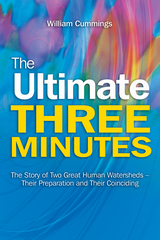 The Ultimate Three Minutes: The Story of Two Great Human Watersheds - Their Preparation and Their Coinciding
William Cummings
Sussex Academic Press, 2022 The Ultimate Three Minutes is a statement of Christian theology in terms of "Salvation History", introducing the functions of Abraham, Moses, Second Isaiah and the Psalms; and placing in historical context the life, crucifixion and resurrection of Jesus Christ - his uniqueness, the formation of the Gospels, and the Eucharist as the identifying thread which binds the redemptive or salvation process into a coherent whole and vivifies the Christian hope. This presentation of basic Christian Gospel theology is carried within a simplistic account of the history of the Ancient World, written in the style of a continuous narrative, with digressions into special topics such as the Psalms, Augustus and Providence, the Sixth Chapter of St John's Gospel, and the Northern Frontier. It also features a parable drawn from modern science. The title of the book borrows from two distinguished scientists. In The First Three Minutes Steven Weinberg describes the developments of the first three minutes of the universe, following the explosion of the "Big Bang" 13.8 billion years ago. In The Last Three Minutes Paul Davies describes the final subsidence of the universe into entropy and heat death. The Ultimate Three Minutes: The Story of Two Great Human Watersheds -Their Preparation and Their Coinciding provides a humanitarian parallel. The title embodies a value judgement, namely the need of the human race for redemption, and the achievement of that redemption by Jesus Christ, the Anointed Saviour, on his Cross. The "Ultimate Three Minutes" is the final three minutes before Jesus Christ expelled his final breath, when the suffering and the cost of the redemption of mankind was at its most heavy and precarious.
 Ultracapacitor Applications
John M. Miller
The Institution of Engineering and Technology, 2011 Energy storage and in particular electrical storage of energy has become a very talked about topics in circles, ranging from lay person in regard to hybrid and battery electric vehicles, to professional and certainly by legislators and energy policy makers in government. But even to professional the distinction between physical and chemical forms of electric energy storage are unclear and at times poorly understood, if at all. This book takes a critical look at physical storage of electricity in the devices known collectively as electrochemical capacitors and particularly as ultracapacitors. In its 12 chapters, this text covers ultracapacitors and advances battery topics with emphasis on clear understanding of fundamental principles, models and applications. The reader will appreciates the case studies ranging from commercial to industrial to automotive applications of not only ultracapacitors but these power device components in combination with energy dense battery technologies.
Ultrascale Computing Systems
Jesus Carretero
The Institution of Engineering and Technology, 2019 The needs of future digital data and computer systems are expected to be two to three orders of magnitude larger than for today's systems, to take account of unprecedented amounts of heterogeneous hardware, lines of source code, numbers of users, and volumes of data. Ultrascale computing systems (UCS) are a solution. Envisioned as large-scale complex systems joining parallel and distributed computing systems, which can be located at multiple sites and cooperate to provide the required resources and performance to the users, these technologies will extend individual systems to provide the resources that are very much needed.
Ultrawideband Radar Measurements: Analysis and processing
L.Y. Astanin
The Institution of Engineering and Technology, 1997 Interest in the applications of ultrawideband (UWB) radar systems is increasing rapidly all over the world. This is evident from the number of monographs recently published on the subject and from the many papers presented at international conferences on the general problems involved in UWB radar and on its promising new applications. Conventional (classical) methods seem to have exhausted their potential and studies in the field are undergoing a profound change. This book presents some of the novel approaches to radar system analysis now being investigated.
Ultra-Wideband Surveillance Radar
Mark E. Davis
The Institution of Engineering and Technology, 2021 Ultra-Wideband Surveillance Radar is an emerging technology for detecting and characterizing targets and cultural features for military and geosciences applications. To characterize objects near and under severe clutter, it is necessary to have fine range and cross range resolution. The resultant wide bandwidth classifies the systems as ultra-wideband, requiring special treatment in system technology and frequency allocation.
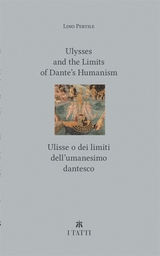 Ulysses and the Limits of Dante’s Humanism / Ulisse o dei limiti dell’umanesimo dantesco
Lino Pertile
Harvard University Press In his description of Ulysses in Canto XXVI of the Inferno, Dante subjected the legendary Greek hero to a thoroughgoing revision. The Homeric Ulysses, after ten years of war and a further ten of fabulous adventures throughout the Mediterranean, returns home to Ithaca and resumes his position as son, father, husband, and king of the island. In contrast, Dante’s Ulysses—and that of Tennyson, inspired by Dante and so beloved in America—is an ingenious but profoundly restless character who, in his unceasing quest for knowledge, novelty, and happiness, finds not fulfillment but death. His tragic story embodies the dilemma that human intelligence poses for our civilization today, torn between the endless pursuit of innovation and its ever more catastrophic risks. Ulysses and the Limits of Dante’s Humanism / Ulisse o dei limiti dell’umanesimo dantesco offers a bilingual English and Italian examination of that revision.
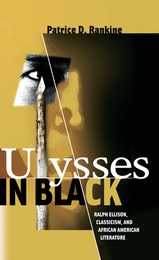 Ulysses in Black: Ralph Ellison, Classicism, and African American Literature
Patrice D. Rankine
University of Wisconsin Press, 2008 In this groundbreaking work, Patrice D. Rankine asserts that the classics need not be a mark of Eurocentrism, as they have long been considered. Instead, the classical tradition can be part of a self-conscious, prideful approach to African American culture, esthetics, and identity. Ulysses in Black demonstrates that, similar to their white counterparts, African American authors have been students of classical languages, literature, and mythologies by such writers as Homer, Euripides, and Seneca.
Ulysses in Black closely analyzes classical themes (the nature of love and its relationship to the social, Dionysus in myth as a parallel to the black protagonist in the American scene, misplaced Ulyssean manhood) as seen in the works of such African American writers as Ralph Ellison, Toni Morrison, and Countee Cullen. Rankine finds that the merging of a black esthetic with the classics—contrary to expectations throughout American culture—has often been a radical addressing of concerns including violence against blacks, racism, and oppression. Ultimately, this unique study of black classicism becomes an exploration of America’s broader cultural integrity, one that is inclusive and historic. Outstanding Academic Title, Choice Magazine
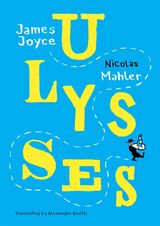 Ulysses: Mahler after Joyce
Nicolas Mahler
Seagull Books, 2022 A twist on the Irish literary classic Ulysses, told through Nicolas Mahler’s distinctive graphic novel style.
Dublin, 16 June 1904: through a day in the life of the advertising agent Leopold Bloom and the sensations of the ordinary, James Joyce created a maximal book from a minimum of matter. Ulysses, the most important novel of modernity, is a defining book of the twentieth century. Joyce’s creation—also spectacularly innovative in form—inspired Nicolas Mahler to attempt a literary retelling that is not a mere illustration or adaption of the novel but an independent and equally as inventive work. Using comics, Mahler transforms the various literary techniques of the original. He assembles his images with humorous and philosophical verve, quoting and rambling along in the spirit of Joyce.
With this graphic interpretation of the modern classic, which also constitutes a homage to the golden era of the newspaper comic strip, Ulysses can be newly discovered in a delightfully unexpected form.
 Ulysses S. Grant: A Photographic History
James Bultema, with a Foreword by Frank J. Willilams
Southern Illinois University Press, 2022 The most photographed American of the nineteenth century
As Grant battled relentlessly down the Tennessee River and across Tennessee, defending Shiloh, he was followed by an enterprising group of studio photographers hoping to profit from the public’s demand for images of the rising general from the West. They never stopped because Grant never stopped. Thus far, 307 distinct photographs have been found of Ulysses S. Grant, revealing him to be the most photographed American of the nineteenth century.
Readers of Ulysses S. Grant: A Photographic History travel alongside Grant through the Civil War and his two terms as president, on his unusual two-year journey around the world, and to his final days on Mount McGregor. The sheer volume of exposure shows the toll of duty, war, and command. From every angle, this collection captures Grant’s regard for soldier and family, his disregard of uniform, and his disheveled appearance that reflected his resilience. The reader will look into the eyes of a man who saw the worst and labored for the best.
This curated volume opens the largest collection of Grant photos to the public for the first time. Excerpts from Grant’s personal writings divulge his candid thoughts about the people he posed with and the situations he faced around the time the photographs were taken. An extraordinary addition to Grant scholarship, Ulysses S. Grant: A Photographic History will be the photographic reference work on Grant for decades to come as the simple man from Ohio continues to astonish the world.
Ulysses: The Mechanics of Meaning
David Hayman
University of Wisconsin Press, 1982 Since its original publication in 1970, Ulysses: the Mechanics of Meaning has become one of the most talked about, cited, and respected of commentaries on Joyce's classic work. Its compact format and its crisp, lucid style make David Hayman's book an essential one for all new readers of Ulysses. For this new edition Hayman has added a convenient chapter-by-chapter account of the action and a substantial afterword extending and amplifying ideas presented in the original edition and briefly summarizing the current critical scene. This makes the book of additional value both to sudents and to the many Joyce scholars who have long depended on the Prentice-Hall edition, now out of print.
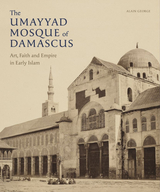 The Umayyad Mosque of Damascus: Art, Faith and Empire in Early Islam
Alain George
Gingko, 2020 An expansive illustrated history of the historic Umayyad Mosque in Damascus.
The Umayyad Mosque of Damascus is one of the oldest continuously used religious sites in the world. The mosque we see today was built in 705 CE by the Umayyad caliph al-Walid on top of a fourth-century Christian church that had been erected over a temple of Jupiter. Incredibly, despite the recent war, the mosque has remained almost unscathed, but over the centuries has been continuously rebuilt after damage from earthquakes and fires. In this comprehensive biography of the Umayyad Mosque, Alain George explores a wide range of sources to excavate the dense layers of the mosque’s history, also uncovering what the structure looked like when it was first built with its impressive marble and mosaic-clad walls. George incorporates a range of sources, including new information he found in three previously untranslated poems written at the time the mosque was built, as well as in descriptions left by medieval scholars. He also looks carefully at the many photographs and paintings made by nineteenth-century European travelers, particularly those who recorded the building before the catastrophic fire of 1893.
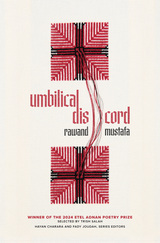 Umbilical Discord
Rawand Mustafa
University of Arkansas Press, 2024 Winner, 2024 Etel Adnan Poetry Prize
At its core, Rawand Mustafa’s Umbilical Discord is an impossible attempt. Ambitious in scope, it strives to trace the billion-branched reach of the Palestinian context within a fixed yet flowing form—columnar, helical, intertwining, tense, intense. Incorporating testimonies by elder Palestinian women who survived the Nakba, or Palestinian Catastrophe of 1948, Mustafa re-presents the ongoing shockwaves from this historical upheaval by interlacing witnesses’ stories with related recollections from her own family history. The overlapping accounts from Palestinian women that Mustafa has painstakingly translated or gathered from family members recall moments of supreme perseverance in the face of unimaginable violence, separation, and loss, while weaving together past and present, collective and individual, Arabic and English, memory and imagination, homeland and host country. As Trish Salah observes in the foreword for Umbilical Discord, “these are poems of yearning and of being, both in spite of and fractured by an impossible history. [. . .] Mustafa offers resistant traces of the geographies and names dis/re-membered in [. . .] efforts to erase the material architecture and cultural memory of Arab life in Palestine. What must be traversed in order to come to tell a history? As Mustafa writes in ‘dis cord,’ her opening poem, [. . .] ‘I attempt / my story / on a lost / foundation.’ ”
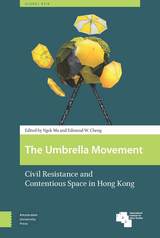 The Umbrella Movement: Civil Resistance and Contentious Space in Hong Kong
Ngok Ma
Amsterdam University Press, 2019 This volume examines the most spectacular struggle for democracy in post-handover Hong Kong. Bringing together scholars with different disciplinary focuses and comparative perspectives from mainland China, Taiwan and Macau, one common thread that stitches the chapters is the use of first-hand data collected through on-site fieldwork. This study unearths how trajectories can create favourable conditions for the spontaneous civil resistance despite the absence of political opportunities and surveys the dynamics through which the protestors, the regime and the wider public responses differently to the prolonged contentious space. The Umbrella Movement: Civil Resistance and Contentious Space in Hong Kong offers an informed analysis of the political future of Hong Kong and its relations with the authoritarian sovereignty as well as sheds light on the methodological challenges and promises in studying modern-day protests.
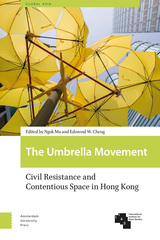 The Umbrella Movement: Civil Resistance and Contentious Space in Hong Kong, Revised Edition
Ngok Ma
Amsterdam University Press, 2020 This volume examines the most spectacular struggle for democracy in post-handover Hong Kong. Bringing together scholars with different disciplinary focuses and comparative perspectives from mainland China, Taiwan and Macau, one common thread that stitches the chapters is the use of first-hand data collected through on-site fieldwork. This study unearths how trajectories can create favourable conditions for the spontaneous civil resistance despite the absence of political opportunities and surveys the dynamics through which the protestors, the regime and the wider public responses differently to the prolonged contentious space. The Umbrella Movement: Civil Resistance and Contentious Space in Hong Kong offers an informed analysis of the political future of Hong Kong and its relations with the authoritarian sovereignty as well as sheds light on the methodological challenges and promises in studying modern-day protests.
Umbria: The Heart of Italy
Patricia Clough
Haus Publishing, 2017 When Patricia Clough, a former foreign correspondent, bought a house in Umbria, she knew that buying her dream home did not mean that life would become a dream. By the end of this book, in which she describes the journey of making Umbria her home, she is sure that 'if one has basic requirements for being happy, then Umbria provides some of the best surroundings for happiness.' Clough pores over Umbria's enchanting countryside, its tumultuous history, its ancient culture and sumptuous food, and laments that for a long time Umbria was mistaken for its fashionable neighbour, Tuscany. This is not a guide to buying a home in Italy, nor a guidebook for your holiday - though it would be useful as both of these things - but a story in which a woman discovers and marvels at the place she begins to call home.
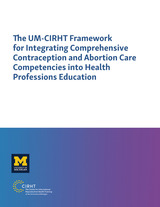 The UM-CIRHT Framework for Integrating Comprehensive Contraception and Abortion Care Competencies into Health Professions Education
Solomon W. Beza
Michigan Publishing, 2018 This framework document describes the strategy used by the Center for International Reproductive Health Training at the University of Michigan (UM-CIRHT) to integrate preservice family planning and comprehensive abortion care training into health professional schools' curricula. The program is designed to ensure acquisition of requisite competencies so that partner schools can graduate competent health professionals able to deliver high-quality, comprehensive reproductive health services to women.
The framework is intended to provide guidance on how the programmatic and operational strategies for family planning and comprehensive abortion care could be extended in countries or institutions that seek to replicate the UM-CIRHT model in their settings. It may be adapted to the local context of individual countries and institutions.
This framework document is produced by UM-CIRHT with funding from an anonymous donor.
UML for Systems Engineering: Watching the wheels
Jon Holt
The Institution of Engineering and Technology, 2004 Up until a few years ago there were many different modelling languages available to software developers. However, this vast array of choice only served to hinder communication and as a result the Unified Modelling Language (UML) was born. Although the UML has its roots firmly in the software world, the benefits of adopting a standard visual notation have been recognised in many other fields, not least of which is the field of systems engineering. This book concentrates on systems-based applications, rather than the traditional software applications that are more usually associated with the UML. Now fully updated to reflect the changes to UML for its version 2.0 release, this new edition has been substantially re-written and includes new material on systems architectures and life cycle management.
Umm al-Biyara: Excavations by Crystal-M. Bennett in Petra 1960-1965
P. Bienkwoski
Council for British Research in the Levant, 2011 Umm al-Biyara, the highest mountain in Petra, southern Jordan, was the first Iron Age Edomite site to be extensively excavated. It was a domestic, unwalled site of stone-built longhouses dating to the 7th-6th centuries BCE. The stratigraphy, pottery, small finds and inscribed material, including the important bulla of Qos-Gabr, King of Edom are described, supplemented by chapters on the use of space and a landscape study of mountain-top sites in the Petra region. The later Nabataean remains on the edge of the summit indicate a major Nabataean complex of buildings, possibly a palace, which would make this the first Nabataean palace in Petra to be explicitly identified.
Un Catecismo para los Negocios
Andrew V. Abela
Catholic University of America Press, 2016 This second edition, translated into Spanish, streamlines some of the editing from the first addition, and more importantly, includes material from Pope Francis's encyclical, Laudato Si, and his apostolic exhortation, Evangelii Gaudium. A Catechism for Business presents the teachings of the Catholic Church as they relate to more than one hundred specific and challenging moral questions as they have been asked by business leaders. Andrew V. Abela and Joseph E. Capizzi have assembled the relevant quotations from recent Catholic social teaching as responses to these questions. Questions and answers are grouped together under major topics such as marketing, finance and investment. The book's easy-to-use question and answer approach invites quick reference for tough questions and serves as a basis for reflection and deeper study in the rich Catholic tradition of social doctrine.
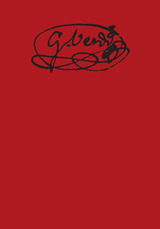 Un giorno di regno: Melodramma giocoso in Two Acts by Felice Romani
Giuseppe Verdi
University of Chicago Press, 2021 Un giorno di regno, which premiered at Milan’s Teatro alla Scala in September 1840, is Verdi’s second opera and one of only two comedies (with Falstaff) ever written by the composer. Rooted in Felice Romani’s libretto Il finto Stanislao, Un giorno di regno experienced a tumultuous history: the opera’s first performance was poorly received, a result that has been often attributed to a personal tragedy—the sudden death of his first wife—that befell Verdi during the work’s composition. Research for this edition, however, reveals that Verdi worked on it with the utmost care. In recent times, new audiences have embraced revivals of Un giorno di regno, and the opera is now celebrated as a fine expression of Verdi’s robust style, offering enticing glimpses into the world of comedy at mid-century.
This critical edition, based on Verdi’s autograph manuscript, offers the first publication of the opera in full score. Editor Francesco Izzo contextualizes Un giorno di regno in his introductory discussion of the work’s origins, sources, and performances. In addition, appendices provide alternative musical readings and reconstruct lost versions of segments of the musical numbers, while the critical commentary explores editorial problems and answers.
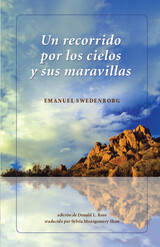 Un recorrido por los cielos y sus maravillas
Emanuel Swedenborg
Swedenborg Foundation Publishers, 2010 This Spanish edition of the English-language Afterlife takes the essence of Emanuel Swedenborg’s classic Heaven and Hell and presents it chronologically, starting with the process of awakening after death and then taking the reader on a journey through both heaven and hell. This shorter format provides an eye-opening introduction to Swedenborg’s philosophy. “A través de mucha experiencia, se me ha demostrado que cuando somos trasladados del mundo natural al espiritual, lo cual ocurre al morirnos, nos llevamos todo lo que pertenece a nuestro carácter menos el cuerpo terrenal. Lo que es más, cuando entramos en el mundo espiritual o en nuestra vida después de la muerte, estamos en un cuerpo como cuando estábamos en este mundo. No parece haber ninguna diferencia, puesto que no sentimos ni vemos que nada haya cambiado. . . . Entonces, cuando nos hemos convertido en espíritus, no tenemos la sensación de que ya no estamos en el cuerpo que habitamos en el mundo, y por consiguiente, no nos damos cuenta de que hemos muerto.” – Emanuel Swedenborg, Un recorrido por los cielos y sus maravillas
 The UN Secretary-General and Moral Authority: Ethics and Religion in International Leadership
Kent J. Kille, Editor
Georgetown University Press, 2007 Once described by Trygve Lie as the "most impossible job on earth," the position of UN Secretary-General is as frustratingly constrained as it is prestigious. The Secretary-General's ability to influence global affairs often depends on how the international community regards his moral authority. In relation to such moral authority, past office-holders have drawn on their own ethics and religious backgrounds—as diverse as Lutheranism, Catholicism, Buddhism, and Coptic Christianity—to guide the role that they played in addressing the UN's goals in the international arena, such as the maintenance of international peace and security and the promotion of human rights.
In The UN Secretary-General and Moral Authority, contributors provide case studies of all seven former secretaries-general, establishing a much-needed comparative survey of each office-holder's personal religious and moral values. From Trygve Lie's forbearance during the UN's turbulent formative years to the Nobel committee's awarding Kofi Annan and the United Nations the prize for peace in 2001, the case studies all follow the same format, first detailing the environmental and experiential factors that forged these men's ethical frameworks, then analyzing how their "inner code" engaged with the duties of office and the global events particular to their terms. Balanced and unbiased in its approach, this study provides valuable insight into how religious and moral leadership functions in the realm of international relations, and how the promotion of ethical values works to diffuse international tensions and improve the quality of human life around the world.
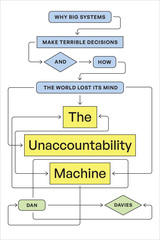 The Unaccountability Machine: Why Big Systems Make Terrible Decisions—and How the World Lost Its Mind
Dan Davies
University of Chicago Press, 2025 Longlisted for the 2024 Financial Times Book of the Year. How life and the economy became a black box—a collection of systems no one understands, producing outcomes no one likes.
Passengers get bumped from flights. Phone menus disconnect. Automated financial trades produce market collapse. Of all the challenges in modern life, some of the most vexing come from our relationships with automation: a large system does us wrong, and there’s nothing we can do about it.
The problem, economist Dan Davies shows, is accountability sinks: systems in which decisions are delegated to a complex rule book or set of standard procedures, making it impossible to identify the source of mistakes when they happen. In our increasingly unhuman world—lives dominated by algorithms, artificial intelligence, and large organizations—these accountability sinks produce more than just aggravation. They make life and economy unknowable—a black box for no reason.
In The Unaccountability Machine, Davies lays bare how markets, institutions, and even governments systematically generate outcomes that no one—not even those involved in making them—seems to want. Since the earliest days of the computer age, theorists have foreseen the dangers of complex systems without personal accountability. In response, British business scholar Stafford Beer developed an accountability-first approach to management called “cybernetics,” which might have taken off had his biggest client (the Chilean government) not fallen to a bloody coup in 1973.
With his signature blend of economic and journalistic rigor, Davies examines what’s gone wrong since Beer, including what might have been had the world embraced cybernetics when it had the chance. The Unaccountability Machine is a revelatory and resonant account of how modern life became predisposed to dysfunction.
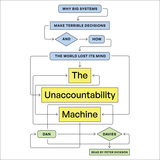 The Unaccountability Machine: Why Big Systems Make Terrible Decisions—and How the World Lost Its Mind
Dan Davies
University of Chicago Press, 2025 This is an audiobook version of this book.
Longlisted for the 2024 Financial Times Book of the Year. How life and the economy became a black box—a collection of systems no one understands, producing outcomes no one likes.
Passengers get bumped from flights. Phone menus disconnect. Automated financial trades produce market collapse. Of all the challenges in modern life, some of the most vexing come from our relationships with automation: a large system does us wrong, and there’s nothing we can do about it.
The problem, economist Dan Davies shows, is accountability sinks: systems in which decisions are delegated to a complex rule book or set of standard procedures, making it impossible to identify the source of mistakes when they happen. In our increasingly unhuman world—lives dominated by algorithms, artificial intelligence, and large organizations—these accountability sinks produce more than just aggravation. They make life and economy unknowable—a black box for no reason.
In The Unaccountability Machine, Davies lays bare how markets, institutions, and even governments systematically generate outcomes that no one—not even those involved in making them—seems to want. Since the earliest days of the computer age, theorists have foreseen the dangers of complex systems without personal accountability. In response, British business scholar Stafford Beer developed an accountability-first approach to management called “cybernetics,” which might have taken off had his biggest client (the Chilean government) not fallen to a bloody coup in 1973.
With his signature blend of economic and journalistic rigor, Davies examines what’s gone wrong since Beer, including what might have been had the world embraced cybernetics when it had the chance. The Unaccountability Machine is a revelatory and resonant account of how modern life became predisposed to dysfunction.
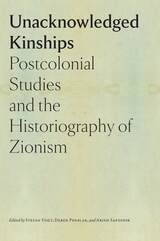 Unacknowledged Kinships: Postcolonial Studies and the Historiography of Zionism
Edited by Stefan Vogt, Derek Penslar, and Arieh Saposnik
Brandeis University Press, 2023 The first work to systematically investigate the potential for a dialogue between postcolonial studies and the history of Zionism.
There is an “unacknowledged kinship” between studies of Zionism and post-colonial studies, a kinship that deserves to be both discovered and acknowledged. Unacknowledged Kinships strives to facilitate a conversation between the historiography of Zionism and postcolonial studies by identifying and exploring possible linkages and affiliations between their subjects as well as the limits of such connections. The contributors to this volume discuss central theoretical concepts developed within the field of postcolonial studies, and they use these concepts to analyze crucial aspects of the history of Zionism while contextualizing Zionist thought, politics, and culture within colonial and postcolonial histories. This book also argues that postcolonial studies could gain from looking at the history of Zionism as an example of not only colonial domination but also the seemingly contradictory processes of national liberation and self-empowerment.
Unacknowledged Kinships is the first work to systematically investigate the potential for a dialogue between postcolonial studies and Zionist historiography. It is also unique in suggesting that postcolonial concepts can be applied to the history of European Zionism just as comprehensively as to the history of Zionism in Palestine and Israel or Arab countries. Most importantly, the book is an overture for a dialogue between postcolonial studies and the historiography of Zionism.
 Unaffordable: American Healthcare from Johnson to Trump
Jonathan Engel
University of Wisconsin Press, 2018 Written for nonexperts, this is a brisk, engaging history of American healthcare from the advent of Medicare and Medicaid in the 1960s to the impact of the Affordable Care Act in the 2010s. Step by step, Jonathan Engel shows how we arrived at our present convoluted situation, where generic drugs prices can jump 1,000 percent in a day and primary care physicians can lose 20 percent of their income at the stroke of a Congressional pen.
Unaffordable covers, in a conversational style punctuated by apt examples, topics ranging from health insurance, pharmaceutical pricing, and physician training to health maintenance organizations and hospital networks. Along the way, Engel introduces approaches that other nations have taken in organizing and paying for healthcare and offers insights on ethical quandaries around end-of-life decisions, neonatal care, life-sustaining treatments, and the limits of our ability to define death. While describing the political origins of many of the federal and state laws that govern our healthcare system today, he never loses sight of the impact that healthcare delivery has on our wallets and on the balance sheets of hospitals, doctors' offices, government agencies, and private companies.
 unalone
Jessica Jacobs
Four Way Books, 2024 “Make a fence, said the rabbis, around the Torah,” reads the first line of Jessica Jacobs' unalone. By the end of this opening poem, however, Jacobs has defined her engagement with religious texts as an act of devotion to living fully in the world’s complexity: “Here, love, is fruit with the sun still inside it. Let me // thumb the juice from your chin. Let us honor what we love / by taking it in.” Structured around the twelve parshiyot (portions) of Genesis, the trajectory of unalone parallels immersion in Jewish teachings with the contemporary world. Whether conversing with the sacred texts she reads or writing from her subjects' perspectives, Jacobs navigates an abundance of experiences: growing up queer, embracing one's sexuality, reversing roles as the adult child of aging parents, wrestling with religious history and the imposed roles of womanhood, exploring how the past foreshadows our current climate crisis, and revisiting the blush of new love while cataloging the profound, though more familiar, joys of a long relationship.
Deeply personal and yet universal in its truths, unalone draws on the Book of Genesis as a living document whose stories, wisdom, and ethical knots can engage us more fully with our own lives — whatever your religious tradition or spiritual beliefs. In this stunning and ambitious book, Jacobs reminds us that all poetry serves as a kind of prayer – a recognition of beauty, a spoken bid for connection, a yearning toward an understanding that might better guide us through our days. When you “dive / from the twin heights of your eyes,” “that tiny pool below” isn’t God. “Well, not exactly,” Jacobs comforts us. “It’s you. One breath deeper than you’ve / ever been, one breath closer to the heeded, heedful world.”
 unalone
Jessica Jacobs
Four Way Books, 2024 “Make a fence, said the rabbis, around the Torah,” reads the first line of Jessica Jacobs' unalone. By the end of this opening poem, however, Jacobs has defined her engagement with religious texts as an act of devotion to living fully in the world’s complexity: “Here, love, is fruit with the sun still inside it. Let me // thumb the juice from your chin. Let us honor what we love / by taking it in.” Structured around the twelve parshiyot (portions) of Genesis, the trajectory of unalone parallels immersion in Jewish teachings with the contemporary world. Whether conversing with the sacred texts she reads or writing from her subjects' perspectives, Jacobs navigates an abundance of experiences: growing up queer, embracing one's sexuality, reversing roles as the adult child of aging parents, wrestling with religious history and the imposed roles of womanhood, exploring how the past foreshadows our current climate crisis, and revisiting the blush of new love while cataloging the profound, though more familiar, joys of a long relationship.
Deeply personal and yet universal in its truths, unalone draws on the Book of Genesis as a living document whose stories, wisdom, and ethical knots can engage us more fully with our own lives — whatever your religious tradition or spiritual beliefs. In this stunning and ambitious book, Jacobs reminds us that all poetry serves as a kind of prayer – a recognition of beauty, a spoken bid for connection, a yearning toward an understanding that might better guide us through our days. When you “dive / from the twin heights of your eyes,” “that tiny pool below” isn’t God. “Well, not exactly,” Jacobs comforts us. “It’s you. One breath deeper than you’ve / ever been, one breath closer to the heeded, heedful world.”
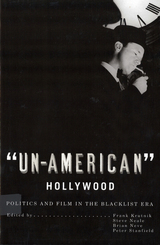 'Un-American' Hollywood: Politics and Film in the Blacklist Era
Stanfield, Peter
Rutgers University Press, 2007 The concept of “un-Americanism,” so vital to the HUAC crusade of the 1940s and 1950s, was resoundingly revived in the emotional rhetoric that followed the September 11th terrorist attacks. Today’s political and cultural climate makes it more crucial than ever to come to terms with the consequences of this earlier period of repression and with the contested claims of Americanism that it generated. “Un-American” Hollywood reopens the intense critical debate on the blacklist era and on the aesthetic and political work of the Hollywood Left. In a series of fresh case studies focusing on contexts of production and reception, the contributors offer exciting and original perspectives on the role of progressive politics within a capitalist media industry. Original essays scrutinize the work of individual practitioners, such as Robert Rossen, Joseph Losey, Jules Dassin, and Edward Dmytryk, and examine key films, including The Robe, Christ in Concrete, The House I Live In, The Lawless, The Naked City, The Prowler, Body and Soul, and FTA.
Un-American Psycho: Brian De Palma and the Political Invisible
Chris Dumas
Intellect Books, 2012 Brian De Palma is perhaps best known as the director behind the gangster classic Scarface. Yet as ingrained as Scarface is in American popular culture, it is but one of a sizeable number of controversial films—many of which are consistently misread or ignored—directed by De Palma over his more than four-decade career. In Un-American Psycho, Chris Dumas places De Palma’s body of work in dialogue with the works of other provocative filmmakers, including Alfred Hitchcock, Jean-Luc Godard, and Francis Ford Coppola with the aim of providing a broader understanding of the narrative, stylistic, and political gestures that characterize De Palma’s filmmaking. De Palma’s films engage with a wide range of issues surrounding American political and social culture, and this volume offers a rethinking of the received wisdom on his work.
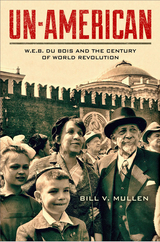 Un-American: W.E.B. Du Bois and the Century of World Revolution
Bill V Mullen
Temple University Press, 2015 Un-American is Bill Mullen’s revisionist account of renowned author and activist W.E.B. Du Bois’s political thought toward the end of his life, a period largely dismissed and neglected by scholars. He describes Du Bois’s support for what the Communist International called “world revolution” as the primary objective of this aged radical’s activism. Du Bois was a champion of the world’s laboring millions and critic of the Cold War, a man dedicated to animating global political revolution. Mullen argues that Du Bois believed that the Cold War stalemate could create the conditions in which the world powers could achieve not only peace but workers’ democracy. Un-American shows Du Bois to be deeply engaged in international networks and personal relationships with revolutionaries in India, China, and Africa. Mullen explores how thinkers like Karl Marx, Jawaharlal Nehru, Mohandas Gandhi, and C.L.R. James helped him develop a theory of world revolution at a stage in his life when most commentators regard him as marginalized. This original political biography also challenges assessments of Du Bois as an American “race man.”
Un-American Womanhood: Antiradicalism, Antifeminism, and the First Red Scare
Kim Nielsen
Ohio State University Press, 2001 Un-American Womanhood studies the Red Scare of the 1920s through the lens of gender. Kim Nielsen describes the methods antifeminists used to subdue feminism and other movements they viewed as radical. By tapping into widespread anxieties about Bolshevism and the expansion of the state, antifeminist women fought against certain social welfare programs such as the Sheppard-Towner Act and the Children’s Bureau and resisted efforts to legitimize the female citizen as an autonomous political figure. The book also considers the seeming contradictions of outspoken antifeminists who broke with traditional gender norms to assume forceful and public roles in their efforts to denounce feminism.
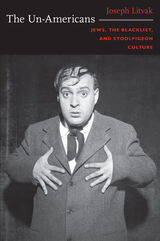 The Un-Americans: Jews, the Blacklist, and Stoolpigeon Culture
Joseph Litvak
Duke University Press, 2009 In a bold rethinking of the Hollywood blacklist and McCarthyite America, Joseph Litvak reveals a political regime that did not end with the 1950s or even with the Cold War: a regime of compulsory sycophancy, in which the good citizen is an informer, ready to denounce anyone who will not play the part of the earnest, patriotic American. While many scholars have noted the anti-Semitism underlying the House Un-American Activities Committee’s (HUAC’s) anti-Communism, Litvak draws on the work of Theodor W. Adorno, Hannah Arendt, Alain Badiou, and Max Horkheimer to show how the committee conflated Jewishness with what he calls “comic cosmopolitanism,” an intolerably seductive happiness, centered in Hollywood and New York, in show business and intellectual circles. He maintains that HUAC took the comic irreverence of the “uncooperative” witnesses as a crime against an American identity based on self-repudiation and the willingness to “name names.” Litvak proposes that sycophancy was (and continues to be) the price exacted for assimilation into mainstream American culture, not just for Jews, but also for homosexuals, immigrants, and other groups deemed threatening to American rectitude. Litvak traces the outlines of comic cosmopolitanism in a series of performances in film and theater and before HUAC, performances by Jewish artists and intellectuals such as Zero Mostel, Judy Holliday, and Abraham Polonsky. At the same time, through an uncompromising analysis of work by informers including Jerome Robbins, Elia Kazan, and Budd Schulberg, he explains the triumph of a stoolpigeon culture that still thrives in the America of the early twenty-first century.
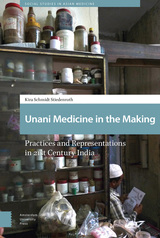 Unani Medicine in the Making: Practices and Representations in 21st-century India
Kira Schmidt-Stiedenroth
Amsterdam University Press, 2020 Unani Medicine in the Making examines the institutions and practices of Unani medicine, the Graeco-Islamic healing practice based on the humoral theory attributed to Hippocrates and officially recognized as a system of medicine in India. Drawing on diverse materials, including Urdu sources, interviews with practitioners, and observations in clinics, the book explores what Unani medicine is today by attending to its multiplicity, scrutinizing apparent tensions between the understanding of Unani as a system of medicine and its multiple enactments as Islamic medicine, medical science, or alternative medicine. Ethnographic details provide vivid descriptions of the current practice of Unani in India, and invite readers to rethink the idea that humoral medicine is incommensurable with modern medicine and science, and that the modernization of Asian medicines invariably leads to their biomedicalization. Ultimately, the book also discusses the relationship of Unani with Muslim communities, examining the growing practice of Prophetic Medicine in Urban India and increasing representations of Unani as Islamic Medicine.
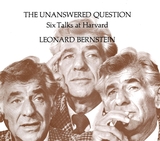 The Unanswered Question: Six Talks at Harvard
Leonard Bernstein
Harvard University Press, 1976 “A summation of his beliefs about music as he looked into the final quarter of the 20th century...Bernstein’s talks still seem surprisingly fresh. But words were nearly as much Bernstein’s métier as music.”—New York Times
Six in-depth lessons on the language of music from the legendary, Grammy Award–winning conductor.
The varied forms of Leonard Bernstein’s musical creativity have been recognized and enjoyed by millions. These lectures, a special monument in Bernstein's legacy, also make fascinating reading. “Nobody anywhere presents this material so warmly, so sincerely, so skillfully,” says the composer Virgil Thomson. “As musical mind-openers they are first class; as pedagogy they are matchless.”
Bernstein considers genres ranging from folk and pop to Hindu ragas, along with symphonic works from Mozart and Ravel to Ives and Copland. Drawing on Noam Chomsky’s linguistic theory, he suggests that each has roots in a “worldwide, inborn musical grammar,” and explores how this grammar generates such a staggeringly diverse array of musical dialects. He also mines his own experience as a master composer and conductor to delve beneath music’s aesthetic surface, discovering the hidden acoustic transformations that create unconscious resonance for listeners. Finally, examining twentieth-century crises in the music of Schoenberg and Stravinsky, Bernstein discovers a new iteration of the deep poetry of musical expression—finding, even in the throes of experimentalism, echoes of all that had come before.
Armed with nearly one hundred notated examples and abundant charisma, Bernstein shows here that, in addition to being a consummate musical prodigy, he was also a master teacher. These talks remain among the composer’s greatest achievements.
An Unarmed Woman
John Bennion
Signature Books, 2019 Rachel O’Brien Rockwood, like her stepfather J. D., longs to hunt criminals and other miscreants. So when, in 1887, during the height of US anti-polygamy legislation, two federal deputies on the lookout for Mormon polygamists are murdered in the small village of Centre, west of Salt Lake City, she jumps at the chance to join the investigation. But detecting never runs smoothly—Rachel and J. D. butt heads regularly over method and approach. Rachel favors talking and uncovering motives. J. D. prefers tracking and searching for the murder weapon. Also there are too many suspects—nearly every villager wanted the deputies gone. As fast as J. D. and Rachel can uncover clues, the local Mormon bishop brushes them aside, insisting instead that the deputies committed thievery and fled westward. Whose theory is true—Rachel’s, J. D.’s, the bishop’s? Or will the story be shaped by the federal marshal, openly hostile to all things Mormon?
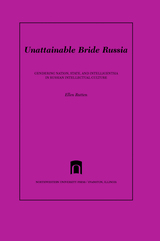 Unattainable Bride Russia: Gendering Nation, State, and Intelligentsia in Russian Intellectual Culture
Ellen Rutten
Northwestern University Press, 2010 Throughout the twentieth century and continuing today, personifications of Russia as a bride occur in a wide range of Russian texts and visual representations, from literature and political and philosophical treatises to cartoons and tattoos. Invariably, this metaphor functions in the context of a political gender allegory, which represents the relationships between Russia, the intelligentsia, and the Russian state, as a competition of two male suitors for the former’s love. In Unattainable Bride Russia, Ellen Rutten focuses on the metaphorical role the intelligentsia plays as Russia’s rejected or ineffectual suitor. Rutten finds that this metaphor, which she covers from its prehistory in folklore to present-day pop culture references to Vladimir Putin, is still powerful, but has generated scarce scholarly consideration. Unattainable Bride Russia locates the cultural thread and places the political metaphor in a broad contemporary and social context, thus paying it the attention to which it is entitled as one of Russia’s modern cultural myths.
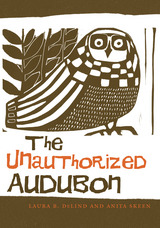 The Unauthorized Audubon
Anita Skeen and Laura B. DeLind
Michigan State University Press, 2014 In an age of experts and individualism, metrics and competition, The Unauthorized Audubon is something of an anachronism. In fact, its creators, printmaker Laura B. DeLind and poet Anita Skeen, never set out to produce a book at all when they began exchanging prints and poems, but something happened along the way. As they began to appreciate at a deeper level the skill involved in each other’s work, they began to find meaning in small things—a pattern, a memory, a carefully chosen word. In his essay “Plugging into Essential Sources,” Eric Booth introduces the concept of “response-ability.” He describes it as the capacity to connect with the artful work of another. It represents both our need and our promise to respond in an open, eager, and multi-sensual way to a world of possibility. Without this capacity we are crippled in our ability to imagine and to grow. This book is all about response-ability as experienced by the two artists and the visitors to an exhibit of their work at the Michigan State University Museum. This concept and activity animates the twenty-two bird-like spirits found herein, reminding us that there are other such spirits hovering expectantly just beyond the pages, simply waiting for the imagining.
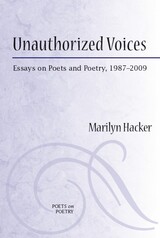 Unauthorized Voices: Essays on Poets and Poetry, 1987-2009
Marilyn Hacker
University of Michigan Press, 2010 Praise for Marilyn Hacker: "How piercing the duet we're offered between Marilyn Hacker and the reality principle. Reality saying, it’s impossible, something's always sacrificed: you can't be so merry and so raw; so learned and earthy; so gut-wrenching, so danceable at once. Can you? To which, steadily, the voice of Marilyn Hacker: Yes. Evidently; Evidently so."
---Eve Kosofsky Sedgwick, author of Epistemology of the Closet and Touching Feeling "Hacker is one of our best singers---by turns elegiac and fierce, sweet and witty. With each new collection her voice grows richer, more resonant, sorrowing and lovely."
---Julia Alvarez, author of In the Time of the Butterflies and How the García Girls Lost Their Accents "Marilyn Hacker joins a marvelous facility with poetic forms to a shockingly intense sensuality. Not unlike Baudelaire, you might say, and indeed like him, she shares a taste for excess, drink, Paris, women, crowds. 'Enivrez-vous!' Baudelaire ordered his readers, and Marilyn Hacker has taken his advice seriously."
---Edmund White, author of Hotel de Dream, City Boy, and Le Flâneur "Everything is thrilling and true, fast and witty, deep and wise; her vitality is the pulse of life itself."
---Derek Mahon, author of Harbour Lights and An Autumn Wind A volume in the Poets on Poetry series, which collects critical works by contemporary poets, gathering together the articles, interviews, and book reviews by which they have articulated the poetics of a new generation. For over twenty years, award-winning poet, translator, and editor Marilyn Hacker has been writing incisive criticism and reviews of contemporary poetry, with particular attention to the work of feminist poets, poets of color, and any poets whose work she judged worthy of more attention from the American (and sometimes British) reading public. Unauthorized Voices is Hacker’s first collection of critical prose, bringing together her essays on American, British, Irish, and French poets. It includes pieces on Adrienne Rich, Hayden Carruth, Elizabeth Bishop, Tony Harrison, Marilyn Nelson, and June Jordan; on French and Francophone poets including Vénus Khoury-Ghata and Guy Goffette; on poetry and politics; and on the contemporary sonnet, all affirming Hacker as a lively, unabashedly opinionated American critical voice. Marilyn Hacker is the author of twelve books of poems, most recently Names and Essays on Departure, and of ten collections of poetry translated from the French, including Marie Étienne's King of a Hundred Horsemen, recipient of the 2009 PEN Award for Poetry in Translation. She has been the recipient of the Lenore Marshall Poetry Prize, two Lambda Literary Awards, and the National Book Award for her own poetry and is a Chancellor of the Academy of American Poets.
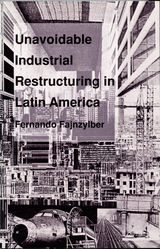 Unavoidable Industrial Restructuring in Latin America
Fernando Fajnzylber
Duke University Press, 1990 In the recent economic history of Latin America no country has yet found the means to combine effectively economic growth with equity. Unavoidable Industrial Restructuring in Latin America compares the development path of Latin America with that of the East Asian newly industrialized countries (NICs), the United States, and Europe in the 1970s and 1980s to show the national policies and international cooperation necessary to set Latin American countries on the road to healthy economies.
Fernando Fajnzylber argues that technological and industrial progress is the driving force of a positive relationship among dynamism, competitiveness, austerity, and equity. Latin America’s failure to master this technological progress underlies its economic difficulties. To overcome the inheritance of past mistakes, the author maintains, Latin America must undergo not only macroeconomic stabilization and a reduction of the debt burden, but also a complete transformation of the production structure. The role of the state and the institutional setup need to be modified and new social and sectoral policies devised. Fajnzylber sees this radical restructuring as an unavoidable step if Latin America is ever to achieve a workable balance between growth and equity.
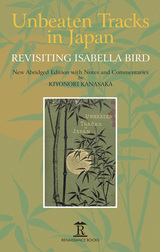 Unbeaten Tracks in Japan: Revisiting Isabella Bird
Kiyonori Kanasaka
Amsterdam University Press, 2018 Isabella Bird’s best-selling book on Japan is republished here, but with a difference: for the first time, it is now fully annotated with supporting commentaries, providing the twenty-first century reader with an enhanced informed view of the new ‘modern Japan’ as Bird experienced it in 1878. Originally published as a two-volume work in 1880, this later abridged version, first published in 1885 and promoted as ‘a tale of travel and adventure’, became one of the best-selling travel books published by John Murray; it was reprinted numerous times and by different publishers. This volume is the original 1885 edition. It is not a facsimile, but has been reprocessed digitally to enable the annotations to be inserted, as well as the 40 copperplate illustrations to be restored to their original quality. The commentaries and notes have been written by Kiyonori Kanasaka, Japan’s leading expert on Isabella Bird who, over the past nearly 30 years, has retraced Isabella Bird’s footsteps in all the parts of the world she visited, and knows her travels in Japan intimately. (See Isabella Bird and Japan: A Reassessment>, Renaissance Books 2017.) This book will be essential reading for all those interested in the Bird legacy, the birth of modern Japan, travel writings of the Far East, the topography of Japan and Japan’s social and political history.
Unbecoming
Eric Michaels
Duke University Press, 1997 In 1982, the American-born anthropologist Eric Michaels went to Australia to research the impact of television on remote aboriginal communities. Over the next five years, until his death, he became a major intellectual presence in Australia. Unbecoming is Michaels’s gritty, provocative, and intellectually powerful account of living with AIDS—a chronicle of the last year of his life as he became increasingly ill. Michaels’s diary offers a forceful and ironic rumination on the cultural phenomenon of AIDS, how it relates to his concerns as both an anthropologist and a gay man, and the failure of medical and governmental institutions to come to terms with the disease. Like the AIDS testimony of artist David Wojnarowicz and filmmaker Derek Jarman, Unbecoming provides a view of the AIDS epidemic from a distinctly new vantage point.
 Unbecoming Americans: Writing Race and Nation from the Shadows of Citizenship, 1945-1960
Keith, Joseph
Rutgers University Press, 2013 During the Cold War, Ellis Island no longer served as the largest port of entry for immigrants, but as a prison for holding aliens the state wished to deport. The government criminalized those it considered un-assimilable (from left-wing intellectuals and black radicals to racialized migrant laborers) through the denial, annulment, and curtailment of citizenship and its rights. The island, ceasing to represent the iconic ideal of immigrant America, came to symbolize its very limits. Unbecoming Americans sets out to recover the shadow narratives of un-American writers forged out of the racial and political limits of citizenship. In this collection of Afro-Caribbean, Filipino, and African American writers—C.L.R. James, Carlos Bulosan, Claudia Jones, and Richard Wright—Joseph Keith examines how they used their exclusion from the nation, a condition he terms “alienage,” as a standpoint from which to imagine alternative global solidarities and to interrogate the contradictions of the United States as a country, a republic, and an empire at the dawn of the "American Century.”
Building on scholarship linking the forms of the novel to those of the nation, the book explores how these writers employed alternative aesthetic forms, including memoir, cultural criticism, and travel narrative, to contest prevailing notions of race, nation, and citizenship. Ultimately they produced a vital counter-discourse of freedom in opposition to the new formations of empire emerging in the years after World War II, forms that continue to shape our world today.
 Unbecoming Cinema: Unsettling Encounters with Ethical Event Films
David H. Fleming
Intellect Books, 2017 Unbecoming Cinema explores the notion of cinema as a living, active agent, capable of unsettling and reconfiguring a person’s thoughts, senses, and ethics. Film, according to David H. Fleming, is a dynamic force, arming audiences with the ability to see and make a difference in the world. Drawing heavily on Deleuze’s philosophical insights, as well as those of Guattari and Badiou, the book critically examines unsettling and taboo footage, from suicide documentaries to art therapy films, from portrayals of mental health and autism to torture porn. In investigating the effect of film on the mind and body, Fleming’s shrewd analysis unites transgressive cinema with metaphysical concepts of the body and mind. A PDF version of this book is available for free in open access via the OAPEN Library platform, www.oapen.org It has been made available under a Creative Commons Attribution 4.0 International Public License and is part of Knowledge Unlatched.
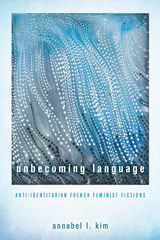 Unbecoming Language: Anti-Identitarian French Feminist Fictions
Annabel L. Kim
Ohio State University Press, 2018 In Unbecoming Language, Annabel L. Kim examines a corpus of French writing against difference. Inaugurated by Nathalie Sarraute and sustained in the work of Monique Wittig and Anne Garréta, this corpus highlights three generations of the twentieth and recent twenty-first centuries and the direct chain of influence between them. Kim considers these writers, and the story of literature’s political potential, as a way of rereading and reinterpreting each writer’s individual corpus—rearticulating the strain of anti-difference feminist thought that has been largely forgotten in our (Anglo-American) histories of French feminisms.
Kim’s close readings ultimately enliven the current conversation in French studies by serving as a provocation to return to reading literary texts deeply and closely, without subordinating literature to a pre-existing ideological framework—to let literature speak, to let it theorize. Tracking the influence of these writers on each other, Kim provides a new, original French feminist poetics and demonstrates that Sarraute, Wittig, and Garréta’s work allows for a hollowing out of difference from within, allowing writers and readers to unbecome—to break free of identity and exist as subjectivities without subjecthood. In looking at these writers together, Kim provides a defense of literature as liberatory— capable of effecting personal and political change—and gives readers an experience of literature’s revolutionary possibilities.
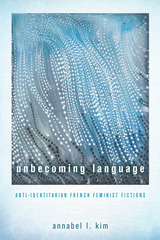 Unbecoming Language: Anti-Identitarian French Feminist Fictions
Annabel L. Kim
Ohio State University Press, 2018 In Unbecoming Language, Annabel L. Kim examines a corpus of French writing against difference. Inaugurated by Nathalie Sarraute and sustained in the work of Monique Wittig and Anne Garréta, this corpus highlights three generations of the twentieth and recent twenty-first centuries and the direct chain of influence between them. Kim considers these writers, and the story of literature’s political potential, as a way of rereading and reinterpreting each writer’s individual corpus—rearticulating the strain of anti-difference feminist thought that has been largely forgotten in our (Anglo-American) histories of French feminisms.
Kim’s close readings ultimately enliven the current conversation in French studies by serving as a provocation to return to reading literary texts deeply and closely, without subordinating literature to a pre-existing ideological framework—to let literature speak, to let it theorize. Tracking the influence of these writers on each other, Kim provides a new, original French feminist poetics and demonstrates that Sarraute, Wittig, and Garréta’s work allows for a hollowing out of difference from within, allowing writers and readers to unbecome—to break free of identity and exist as subjectivities without subjecthood. In looking at these writers together, Kim provides a defense of literature as liberatory— capable of effecting personal and political change—and gives readers an experience of literature’s revolutionary possibilities.
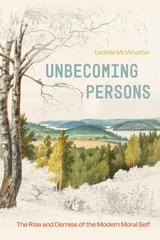 Unbecoming Persons: The Rise and Demise of the Modern Moral Self
Ladelle McWhorter
University of Chicago Press, 2025 A damning genealogy of modern personhood and a bold vision for a new ethics rooted in belonging rather than individuality.
In the face of ecological crisis, economic injustice, and political violence, the moral demands of being a good person are almost too much to bear. In Unbecoming Persons, Ladelle McWhorter argues that this strain is by design. Our ideas about personhood, she shows, emerged to sustain centuries of colonialism, slavery, and environmental destruction. We must look elsewhere to find our way out.
This history raises a hard question: Should we be persons at all, or might we live a good life without the constraints of individualism or the illusion of autonomy? In seeking an answer, McWhorter pushes back on the notion of our own personhood—our obsession with identity, self-improvement, and salvation—in search of a better way to live together in this world. Although she finds no easy answers, McWhorter ultimately proposes a new ethics that rejects both self-interest and self-sacrifice and embraces perpetual dependence, community, and the Earth
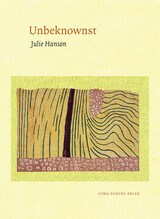 Unbeknownst
Julie Hanson
University of Iowa Press, 2011 Julie Hanson’s award-winning collection, Unbeknownst, gives us plainspoken poems of unstoppable candor. They are astonished and sobered by the incoming data; they are funny; they are psychologically accurate and beautifully made. Hanson’s is a mind interested in human responsibility—to ourselves and to each other—and unhappy about the disappointments that are bound to transpire (“We’ve been like gods, our powers wasted”). These poems are lonely with spiritual longing and wise with remorse for all that cannot last. “The Kindergartners” begins, “All their lives they’ve waited for / the yellow bus to come for them,” then moves directly to the present reality: “Now it’s February and the mat / is wet.” Settings and events are local and familiar, never more exotic than a yoga session at the Y, one of several instances where the body is central to the report and to the net result (“I slip in and fold / behind the wheel into the driver’s seat like a thin young thing: / My organs are surely glistening. This car was made for me.“). These poems are intimate revelations, thinking as they go, including the reader in the progress of their thoughts.
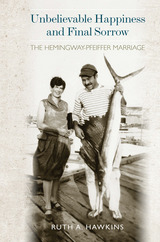 Unbelievable Happiness and Final Sorrow: The Hemingway-Pfeiffer Marriage
Ruth A. Hawkins
University of Arkansas Press, 2012 It was the glittering intellectual world of 1920s Paris expatriates in which Pauline Pfeiffer, a writer for Vogue, met Ernest Hemingway and his wife Hadley among a circle of friends that included Gertrude Stein, F. Scott Fitzgerald, John Dos Passos, and Dorothy Parker. Pauline grew close to Hadley but eventually forged a stronger bond with Hemingway himself; with her stylish looks and dedication to Hemingway's writing, Pauline became the source of "unbelievable happiness" for Hemingway and, by 1927, his second wife. Pauline was her husband's best editor and critic, and her wealthy family provided moral and financial support, including the conversion of an old barn to a dedicated writing studio at the family home in Piggott, Arkansas. The marriage lasted thirteen years, some of Hemingway's most productive, and the couple had two children. But the "unbelievable happiness" met with "final sorrow," as Hemingway wrote, and Pauline would be the second of Hemingway's four wives. Unbelievable Happiness and Final Sorrow paints a full picture of Pauline and the role she played in Ernest Hemingway's becoming one of our greatest literary figures.
The Unbeliever: THE POETRY OF ELIZABETH BISHOP
Robert Dale Parker
University of Illinois Press, 1988 Robert Parker ranges widely through
literary history and theory to give the poems of Elizabeth Bishop (1911-79)
the serious critical attention they deserve. The Unbeliever shows that
Bishop's poems, already famous for their clear and quiet tone, also struggle
with confusion and wonder about things she can never make quiet or clear.
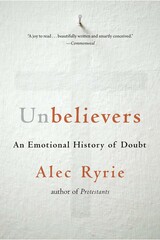 Unbelievers: An Emotional History of Doubt
Alec Ryrie
Harvard University Press, 2019 “How has unbelief come to dominate so many Western societies? The usual account invokes the advance of science and rational knowledge. Ryrie’s alternative, in which emotions are the driving force, offers new and interesting insights into our past and present.”
—Charles Taylor, author of A Secular Age
Why have societies that were once overwhelmingly Christian become so secular? We think we know the answer, pointing to science and reason as the twin culprits, but in this lively, startlingly original reconsideration, Alec Ryrie argues that people embraced unbelief much as they have always chosen their worldviews: through the heart more than the mind.
Looking back to the crisis of the Reformation and beyond, he shows how, long before philosophers started to make the case for atheism, powerful cultural currents were challenging traditional faith. As Protestant radicals eroded time-honored certainties and ushered in an age of anger and anxiety, some defended their faith by redefining it in terms of ethics, setting in motion secularizing forces that soon became transformational. Unbelievers tells a powerful emotional history of doubt with potent lessons for our own angry and anxious times.
“Well-researched and thought-provoking…Ryrie is definitely on to something right and important.”
—Christianity Today
“A beautifully crafted history of early doubt…Unbelievers covers much ground in a short space with deep erudition and considerable wit.”
—The Spectator
“Ryrie traces the root of religious skepticism to the anger, the anxiety, and the ‘desperate search for certainty’ that drove thinkers like…John Donne to grapple with church dogma.”
—New Yorker
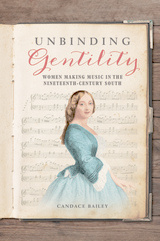 Unbinding Gentility: Women Making Music in the Nineteenth-Century South
Candace Bailey
University of Illinois Press, 2021 A Choice Outstanding Academic Title for 2022 Hearing southern women in the pauses of history
Southern women of all classes, races, and walks of life practiced music during and after the Civil War. Candace L. Bailey examines the history of southern women through the lens of these musical pursuits, uncovering the ways that music's transmission, education, circulation, and repertory help us understand its meaning in the women's culture of the time. Bailey pays particular attention to the space between music as an ideal accomplishment—part of how people expected women to perform gentility—and a real practice—what women actually did. At the same time, her ethnographic reading of binder’s volumes, letters and diaries, and a wealth of other archival material informs new and vital interpretations of women’s place in southern culture. A fascinating collective portrait of women's artistic and personal lives, Unbinding Gentility challenges entrenched assumptions about nineteenth century music and the experiences of the southern women who made it.
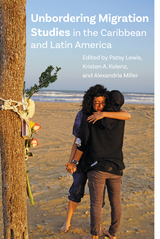 Unbordering Migration Studies in the Caribbean and Latin America
Patsy Lewis
Rutgers University Press, 2026 Unbordering Migration Studies in the Caribbean and Latin America brings together scholars and artists across regions, generations, disciplines, and modes of expression to decenter the US-Mexico border as both a site and a concept. Calling for renewed attention to the spaces, identities, and conflicts that remain understudied and excluded from our hemispheric knowledge of forced movement, the volume reveals a wider diversity of migratory realities and considers race, ethnicity, and class beyond the hegemonic formations that eclipse non-US histories. Through multidisciplinary and geographically expansive essays that draw from history, social anthropology, environmental studies, feminist studies, and lived experience, the volume examines diverse migratory flows from Chile and Argentina in the South to Georgia and New York in the North. Individually and collectively, the essays remap migratory movements other than through the most studied South-to-North trajectories and remove the US and US-based racial formations from the center of analysis. By tracking East-West flows, intraregional mobilities, and changing conceptions of racial identity, Unbordering Migration Studies in the Caribbean and Latin America complicates the concepts of forced mobility and border crossing by highlighting alternative liminalities in sites of transit, destination, and return. Demanding engagement with the submerged histories of racism and the production of ethnoracial categories beyond the Black/white binary, the collection brings into focus identities, sites, and forces that have not yet occupied the foreground of global migration study.
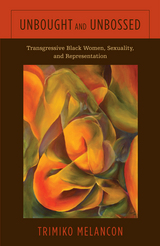 Unbought and Unbossed: Transgressive Black Women, Sexuality, and Representation
Trimiko Melancon
Temple University Press, 2014 Unbought and Unbossed critically examines the ways black women writers in the 1970s and early 1980s deploy black female characters that transgress racial, gender, and especially sexual boundaries. Trimiko Melancon analyzes literary and cultural texts, including Toni Morrison’s Sula and Gloria Naylor’s The Women of Brewster Place, in the socio-cultural and historical moments of their production. She shows how representations of black women in the American literary and cultural imagination diverge from stereotypes and constructions of “whiteness,” as well as constructions of female identity imposed by black nationalism.
Drawing from black feminist and critical race theories, historical discourses on gender and sexuality, and literary criticism, Melancon explores the variety and complexity of black female identity. She illuminates how authors including Ann Allen Shockley, Alice Walker, and Gayl Jones engage issues of desire, intimacy, and independence to shed light on a more complex black identity, one ungoverned by rigid politics over-determined by race, gender and sexuality.
The Unbound Book
Edited by Adriaan van der Weel and Joost Kircz
Amsterdam University Press, 2014 For centuries, the physical book has been the ideal reading machine. So as books are increasingly supplanted by digital, onscreen reading, it is only natural that we find ourselves wondering what will be lost in the transition. This collection, edited by scholars with expertise in electronic publishing and the digital humanities, focuses instead on what we might gain—how screen technology might shape and improve the very activities for which we have always used paper.
 Unbound: How Inequality Constricts Our Economy and What We Can Do about It
Heather Boushey
Harvard University Press, 2019 A Financial Times Book of the Year
“The strongest documentation I have seen for the many ways in which inequality is harmful to economic growth.”
—Jason Furman
“A timely and very useful guide…Boushey assimilates a great deal of recent economic research and argues that it amounts to a paradigm shift.”
—New Yorker
Do we have to choose between equality and prosperity? Decisions made over the past fifty years have created underlying fragilities in our society that make our economy less effective in good times and less resilient to shocks, such as today’s coronavirus pandemic. Many think tackling inequality would require such heavy-handed interference that it would stifle economic growth. But a careful look at the data suggests nothing could be further from the truth—and that reducing inequality is in fact key to delivering future prosperity.
Presenting cutting-edge economics with verve, Heather Boushey shows how rising inequality is a drain on talent, ideas, and innovation, leading to a concentration of capital and a damaging under-investment in schools, infrastructure, and other public goods. We know inequality is fueling social unrest. Boushey shows persuasively that it is also a serious drag on growth.
“In this outstanding book, Heather Boushey…shows that, beyond a point, inequality damages the economy by limiting the quantity and quality of human capital and skills, blocking access to opportunity, underfunding public services, facilitating predatory rent-seeking, weakening aggregate demand, and increasing reliance on unsustainable credit.”
—Martin Wolf, Financial Times
“Think rising levels of inequality are just an inevitable outcome of our market-driven economy? Then you should read Boushey’s well-argued, well-documented explanation of why you’re wrong.”
—David Rotman, MIT Technology Review
Unbound Spirit: Letters of Flora Belle Jan
Flora Belle Jan. Edited by Fleur Yano and Saralyn Daly. Introduction by Judy Wu.
University of Illinois Press, 2008 This volume collects the letters written over a thirty-year period by a second generation Chinese American woman, Flora Belle Jan (1906–50). Born in California to immigrant parents and educated at Berkeley and the University of Chicago, Jan raised three children with her husband Charles Wang and worked as a journalist in both the United States and China. Written during the years 1918–48, these letters offer unique insight into the social and political situation of educated, middle-class, professional Chinese American women in the early twentieth century. Literate, candid, and charming, they convey the intellectual curiosity and perspicacity of a vivacious and ambitious woman while tracing her engagement with two different worlds.
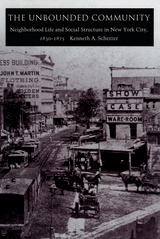 The Unbounded Community: Neighborhood Life and Social Structure in New York City, 1830–1875
Kenneth A. Scherzer
Duke University Press, 1992 Stick ball, stoop sitting, pickle barrel colloquys: The neighborhood occupies a warm place in our cultural memory—a place that Kenneth A. Scherzer contends may have more to do with ideology and nostalgia than with historical accuracy. In this remarkably detailed analysis of neighborhood life in New York City between 1830 and 1875, Scherzer gives the neighborhood its due as a complex, richly textured social phenomenon and helps to clarify its role in the evolution of cities.
After a critical examination of recent historical renderings of neighborhood life, Scherzer focuses on the ecological, symbolic, and social aspects of nineteenth-century community life in New York City. Employing a wide array of sources, from census reports and church records to police blotters and brothel guides, he documents the complex composition of neighborhoods that defy simple categorization by class or ethnicity. From his account, the New York City neighborhood emerges as a community in flux, born out of the chaos of May Day, the traditional moving day. The fluid geography and heterogeneity of these neighborhoods kept most city residents from developing strong local attachments. Scherzer shows how such weak spatial consciousness, along with the fast pace of residential change, diminished the community function of the neighborhood. New Yorkers, he suggests, relied instead upon the "unbounded community," a collection of friends and social relations that extended throughout the city.
With pointed argument and weighty evidence, The Unbounded Community replaces the neighborhood of nostalgia with a broader, multifaceted conception of community life. Depicting the neighborhood in its full scope and diversity, the book will enhance future forays into urban history.
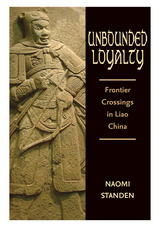 Unbounded Loyalty: Frontier Crossings in Liao China
Naomi Standen
University of Hawaii Press, 2007 Unbounded Loyalty investigates how frontiers worked before the modern nation-state was invented. The perspective is that of the people in the borderlands who shifted their allegiance from the post-Tang regimes in North China to the new Liao empire (907–1125). Naomi Standen offers new ways of thinking about borders, loyalty, and identity in premodern China. She takes as her starting point the recognition that, at the time, "China" did not exist as a coherent entity, neither politically nor geographically, neither ethnically nor ideologically. Political borders were not the fixed geographical divisions of the modern world, but a function of relationships between leaders and followers. When local leaders changed allegiance, the borderline moved with them. Cultural identity did not determine people’s actions: Ethnicity did not exist. In this context, she argues, collaboration, resistance, and accommodation were not meaningful concepts, and tenth-century understandings of loyalty were broad and various.
Unbounded Loyalty sheds fresh light on the Tang-Song transition by focusing on the much-neglected tenth century and by treating the Liao as the preeminent Tang successor state. It fills several important gaps in scholarship on premodern China as well as uncovering new questions regarding the early modern period. It will be regarded as critically important to all scholars of the Tang, Liao, Five Dynasties, and Song periods and will be read widely by those working on Chinese history from the Han to the Qing.
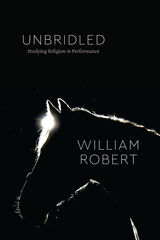 Unbridled: Studying Religion in Performance
William Robert
University of Chicago Press, 2022 A study of religion through the lens of Peter Shaffer’s play Equus.
In Unbridled, William Robert uses Equus, Peter Shaffer’s enigmatic play about a boy passionately devoted to horses, to think differently about religion. For several years, Robert has used Equus to introduce students to the study of religion, provoking them to conceive of religion in unfamiliar, even uncomfortable ways. In Unbridled, he is inviting readers to do the same.
A play like Equus tangles together text, performance, practice, embodiment, and reception. Studying a play involves us in playing different roles, as ourselves and others, and those roles, as well as the imaginative work they require, are critical to the study of religion. By approaching Equus with the reader, turning the play around and upside-down, Unbridled transforms standard approaches to the study of religion, engaging with themes including ritual, sacrifice, worship, power, desire, violence, and sexuality, as well as thinkers including Judith Butler, Sigmund Freud, Karl Marx, Friedrich Nietzsche, and Jonathan Z. Smith. As Unbridled shows, the way themes and theories play out in Equus challenges us to reimagine the study of religion through open questions, contrasting perspectives, and alternative modes of interpretation and appreciation.
 Unbroken Nostalgia: Haitian Kreyòl Poetry in Cuba
Written by Hilario Batista Félix, edited and translated by Mariana F. Past
Amherst College Press, 2026 Unbroken Nostalgia: Haitian Kreyòl Poetry in Cuba is the first English translation and scholarly edition of the collection Nostalji san pwen ni vigil: pwezi kreyòl nan peyi Kiba (2016) by Hilario Batista Félix. A poet, journalist, and language activist, Batista (1955– ) embodies and expresses Cuba’s cultural and linguistic diversity as a descendant of Haitian migrant workers to Eastern Cuba during the mid-twentieth century; his poems bridge regions usually separated by language—the Spanish and Creolophone/Francophone Caribbean—and vividly depict the distinct heritage of Haitian Cubans and their shared dreams and challenges. A scholarly introduction by translator and editor Mariana F. Past provides biographical information about the author, situates his work within Haitian diasporic literature, and addresses patterns of Haitian migration to Cuba. Batista’s original poems appear alongside facing-page English translations with annotations that clarify historical figures and events, geographical features, and Haitian cultural and religious practices. Grounded in oral storytelling traditions, Unbroken Nostalgia brings to light the collective memory and complicated hybridity of the Haitian community in Cuba and upholds Haitian Kreyòl as a language of resistance.
Unbroken Thread: An Anthology of Plays by Asian American Women
Roberta Uno
University of Massachusetts Press, 1993 This book contains plays by Genny Lim (Paper Angels,) Wakako Yamauchi (The MusicLessons,) Momoko Iko (Gold Watch,) Velina Hasu Houston (Tea,) Jeannie Barroga (Walls,) and Elizabeth Wong (Letters to a Student Revolutionary.) The volume includes an extended introduction, a profile of each playwright, and an appendix. The six plays of this anthology represent some of the best dramatic literature written by Asian American women since the 1970s. Each is a groundbreaking work and addresses in its own way the experiences of Asians in America. All six playwrights are American-born daughters of Asian immigrants, and their voices span the genres of naturalism, impressionism, ritual drama, postmodern collage, and media-influenced episodic drama.
 Unbroken Ties: The State, Interest Associations, and Corporatism in Post-Soviet Ukraine
Paul Kubicek
University of Michigan Press, 2000 Unbroken Ties examines the relationship between the state and economic interest groups representing labor, capital, and agriculture in Ukraine. The author argues that the absence of "civil society" helps to explain why, in Ukraine, the much-anticipated transition to democracy and the market has not yet been achieved.
Since the collapse of communism in Eastern Europe and the former Soviet Union, there has been a spate of books--optimistic at first--highlighting the transitions to democracy in these countries and the leading role of "civil society" in pushing forward political and economic reform. This study explains why this transition did not take place as anticipated. In essence, organized labor in Ukraine is weak and has been co-opted by the state; in the meantime, leading groups of industrialists and agricultural collectives have strong political influence and shape policies in accordance with their interests. This is very similar to the situation in Russia.
In contrast to works that implicitly assume a pluralist model of development for state-society relations, Unbroken Ties employs corporatism as the basic organizing structure for the study of state-interest group relations in post-Soviet Ukraine. Finding that much of the Soviet "residue" still functions in Ukraine, it argues that a form of state corporatism, which envisions a major role for the state in structuring and controlling interest associations, captures much of the post-Soviet Ukrainian reality. Old groups persist and prosper due to a variety of ties with state elites, whereas new and independent groups find themselves marginalized.
This book will appeal to political scientists, economists, and sociologists studying the transformation of post-communist societies, as well as those interested in the broader, more comparative aspects of democratization and economic reform.
Paul Kubicek is Kenneth Boulding Post-Doctoral Fellow, University of Colorado, Boulder.
Unbuilt Projects
Paul Lisicky
Four Way Books, 2012 The many subjects of the individual short fiction pieces within Unbuilt Projects intersect God, sex, family, childhood, and adulthood. Fluctuating between descriptions of the exterior world and the speaker’s interior world, these stories are at once lyric and narrative, funny and heartbreaking, beautifully rich and stark. Here the subjective collides with the objective. These short, compelling stories show Lisicky at the top of his form.
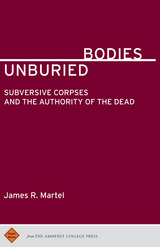 Unburied Bodies: Subversive Corpses and the Authority of the Dead
James R. Martel
Amherst College Press, 2018 The human body is the locus of meaning, personhood, and our sense of the possibility of sanctity. The desecration of the human corpse is a matter of universal revulsion, taboo in virtually all human cultures. Not least for this reason, the unburied corpse quickly becomes a focal point of political salience, on the one hand seeming to express the contempt of state power toward the basic claims of human dignity—while on the other hand simultaneously bringing into question the very legitimacy of that power. In Unburied Bodies: Subversive Corpses and the Authority of the Dead, James Martel surveys the power of the body left unburied to motivate resistance, to bring forth a radically new form of agency, and to undercut the authority claims made by state power. Ranging across time and space from the battlefields of ancient Thebes to the streets of Ferguson, Missouri, and taking in perspectives from such writers as Sophocles, Machiavelli, Walter Benjamin, Hannah Arendt, James Baldwin, Judith Butler, Thomas Lacqueur, and Bonnie Honig, Martel asks why the presence of the abandoned corpse can be seen by both authorities and protesters as a source of power, and how those who have been abandoned or marginalized by structures of authority can find in a lifeless body fellow accomplices in their aspirations for dignity and humanity.
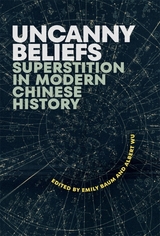 Uncanny Beliefs: Superstition in Modern Chinese History
Emily Baum and Albert Wu
Harvard University Press In the early twentieth century, scholars around the world believed that “superstition” belonged to a bygone era. Yet despite their confident predictions, superstitious beliefs have endured. Perhaps nowhere has the history of superstition been more prolonged and tumultuous than in China. From the late nineteenth century to the present day, intellectuals and politicians have denigrated practices like divination, ancestor worship, and geomancy as unbefitting of a modern nation, and governing regimes have launched a succession of campaigns to replace superstitious thinking with science and rationality. Efforts to eliminate such practices from public life, however, have regularly encountered resistance from people who continue to find meaning in them.
Uncanny Beliefs seeks to understand what “superstition” has meant in modern China—and questions why superstitious thinking has remained such an urgent target of state intervention. Through a range of temporal and thematic perspectives, the chapters in this volume link the study of superstition to the histories of science, religion, gender, state building, and popular culture. In doing so, they collectively broaden our understanding of modern Chinese history by revealing the complex entanglements of superstition with religion, modernity, authority, and everyday life.
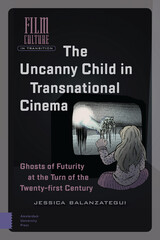 The Uncanny Child in Transnational Cinema: Ghosts of Futurity at the Turn of the Twenty-first Century
Jessica Balanzategui
Amsterdam University Press, 2019 The Uncanny Child in Transnational Cinema illustrates how global horror film depictions of children re-conceptualised childhood at the turn of the twenty-first century. By analysing an influential body of transnational horror films, largely stemming from Spain, Japan, and the US, Jessica Balanzategui shows how millennial uncanny child characters resist embodying growth and futurity, unravelling concepts to which the child's symbolic function is typically bound. The book proposes that complex cultural and industrial shifts at the turn of the millennium resulted in these potent cinematic renegotiations of the concept of childhood. By demonstrating both the culturally specific and globally resonant properties of these frightening visions of children who refuse to grow up, the book outlines the conceptual and aesthetic mechanisms by which long entrenched ideologies of futurity, national progress, and teleological history started to waver at the turn of the twenty-first century.
 Uncanny Creatures: Doll Thinking in Modern German Culture
Christophe Koné
University of Michigan Press, 2024 Germany held a monopoly on the manufacture and export of bisque toy dolls in Europe before WWI. Yet, dolls’ omnipresence in the material, visual, and literary culture of the modern German-speaking world has so far not been properly addressed. In demonstrating this cultural affinity for dolls, Christophe Koné draws upon a range of stories and seminal essays on dolls, as well as toys, sculptures, paintings, and photographs. He examines how E.T.A. Hoffmann’s romantic tale The Sandman (1815) has been a major source of inspiration for German-speaking doll makers because of how it centers imagination and inventiveness. Using Hoffmann’s tale as an early example of an amalgam between doll thinking and making in German culture, Koné shows how it initiated a genealogy of doll thinkers (Freud & Jentsch), writers (Rilke), painters (Kokoschka), photographers (Bellmer), and makers (Pritzel).
Uncanny Creatures then explores how this unusual interest in human-like figures continues a long tradition of thought devoted to conceptualizing “things,” from Immanuel Kant’s theory of the thing-in-itself to Martin Heidegger’s lecture on the thing, and Eduard Mörike or Rainer Maria Rilke’s thing-poems. Because dolls occupy a liminal space—not quite things and more than mere objects—they appear as uncanny creatures which have held a fascination for writers, thinkers, and artists alike. Uncanny Creatures moves past the Freudian discourse of fetishism to propose a new reading of doll artifacts in German culture centered on their ability to evoke a feeling of uncertainty and unsettlement in the viewer.
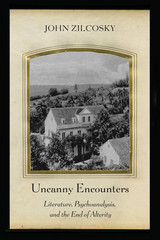 Uncanny Encounters: Literature, Psychoanalysis, and the End of Alterity
John Zilcosky
Northwestern University Press, 2015 Winner of the Friedrich Wilhelm Bessel Research Award
Recipient, 2022 Guggenheim Fellowship
Around 1900, when the last blank spaces on their maps were filled, Europeans traveled to far-flung places hoping to find the spectacularly foreign. They discovered instead what Freud called, several years later, the uncannily familiar: disturbing reflections of themselves—either actual Europeans or Westernized natives. This experience was most extreme for German travelers, who arrived in the contact zones late, on the heels of other European colonialists, and it resulted not in understanding or tolerance but in an increased propensity for violence and destruction. The quest for a “virginal,” exotic existence proved to be ruined at its source, mirroring back to the travelers demonic parodies of their own worst aspects. In this strikingly original book, John Zilcosky demonstrates how these popular “uncanny” encounters influenced Freud’s—and the literary modernists’—use of the term, and how these encounters remain at the heart of our cross-cultural anxieties today.
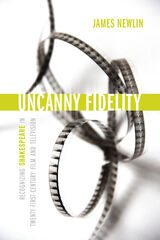 Uncanny Fidelity: Recognizing Shakespeare in Twenty-First-Century Film and Television
James Newlin
University of Alabama Press, 2024 How the study of Shakespeare’s legacy, specifically in film and television, can radically challenge what we consider to be authentically Shakespearean In the field of adaptation studies today, the idea of reading an adapted text as “faithful” or “unfaithful” to its original source strikes many scholars as too simplistic, too conservative, and too moralizing. In Uncanny Fidelity: Recognizing Shakespeare in Twenty-First Century Film and Television, James Newlin challenges these critical orthodoxies. Instead, recognizing how a film or television series closely recalls Shakespeare’s drama encourages an interrogation of what we consider to be “Shakespeare” in the first place. Drawing upon Sigmund Freud’s model of the uncanny—the sudden sensation of peculiar, discomforting familiarity—this book focuses on films and television series that were not marketed as adaptations of Shakespeare. Yet these works unexpectedly invoke lost, even troubling aspects of Shakespeare’s original playtexts, their performance history, or their reception. Broadening the scope of fidelity readings beyond familiar concerns like plot and language, Newlin demonstrates how the study of Shakespeare’s afterlife can clarify both the historical context of his drama and its relevance for the current political moment. Engaging contemporary debates in literary and psychoanalytic theory, this book features provocative close readings of The Tempest, Othello, and The Winter’s Tale alongside recent films and television series, from art-house movies such as The Master and Manchester by the Sea to the cult favorites Brigsby Bear and Vice Principals. These works conjure widely overlooked qualities of Shakespeare’s drama by recalling the casting practices or the generic contexts of the early modern stage or by making a meaningful intervention in the plays’ critical reception. Closely examining these surprisingly faithful adaptations of Shakespeare’s drama helps us to articulate the original experience of the early modern stage and better consider its resonance in the present. This book will benefit students and scholars of Shakespeare on film and psychoanalytic theory. Yet Uncanny Fidelity will also be of interest to scholars of performance history, source studies, and early modern discourses of race and gender—as well as anyone interested in the unexpected connections between canonical literature and contemporary culture. By examining adaptation as an instance of uncanny return, Newlin demonstrates how the study of Shakespeare’s afterlife can radically challenge what we consider to be authentically Shakespearean.
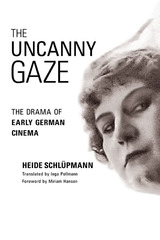 The Uncanny Gaze: The Drama of Early German Cinema
Heide Schlupmann. Translated by Inga Pollmann. Foreword by Miriam Hansen.
University of Illinois Press, 2010 Heide Schlüpmann's classic study of early German cinema was published in German as Unheimlichkeit des Blicks: Das Drama des Frühen deutschen Kinos in 1990. For the first time in English, this translation makes available her feminist examination of German cinema and Germany in the sociopolitical context of Wilhelmine society. By examining then-unknown pre-World War I narrative films, this study paints a picture of the conflicted early years of the German cinema. During this period cinema and film production were able to develop independently from the cultural bourgeoisie and relied on those forces excluded from high "culture": technology, business, performers, showmen, and actors. In cinema, the dime novel and kitsch were exhibited for all, and the internationalism of modernity prevailed over the prevailing nationalism of the period. Featuring a foreword by film scholar Miriam Hansen and a new afterword by Schlüpmann, this volume performs a critical perusal of film commentary and offers an in-depth look at little-known films in early German cinema.
Uncanny Histories in Film and Media
Patrice Petro
Rutgers University Press, 2022 Uncanny Histories in Film and Media brings together a stellar lineup of established and emergent scholars who explore the uncanny twists and turns that are often occluded in larger accounts of film and media. Prompted by fresh archival research and new conceptual approaches, the works included here probe the uncanny as a mode of historical analysis that reveals surprising connections and unsettling continuities. The uncanny stands for what often eludes us, for what remains unfamiliar or mysterious or strange. Whether writing about film movements, individual works, or the legacies of major or forgotten critics and theorists, the contributors remind us that at the heart of the uncanny, and indeed the writing of history, is a troubling of definitions, a challenge to our inherited narratives, and a disturbance of what was once familiar in the uncanny histories of our field.
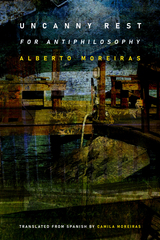 Uncanny Rest: For Antiphilosophy
Alberto Moreiras
Duke University Press, 2022 In Uncanny Rest Alberto Moreiras offers a meditation on intellectual life under the suspension of time and conditions of isolation. Focusing on his personal day-to-day experiences of the “shelter-in-place” period during the first months of the coronavirus pandemic, Moreiras engages with the limits and possibilities of critical thought in the realm of the infrapolitical—the conditions of existence that exceed average understandings of politics and philosophy. In each dated entry he works through the process of formulating a life’s worth of thought and writing while attempting to locate the nature of thought once the coordinates of everyday life have changed. Offering nothing less than a phenomenology of thinking, Moreiras shows how thought happens in and out of a life, at a certain crossroads where memories collide, where conversations with interlocutors both living and dead evolve and thinking during a suspended state becomes provisional and uncertain.
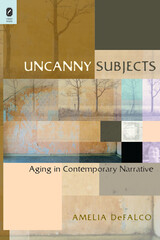 Uncanny Subjects: Aging in Contemporary Narrative
Amelia DeFalco
Ohio State University Press, 2009 In the United States anti-aging is a multibillion-dollar industry, and efforts to combat signs of aging have never been stronger, or more lucrative. Although there are many sociological studies of aging and culture, there are few studies that examine the ways cultural texts construct multiple narratives of aging that intersect and sometimes conflict with existing social theories of aging. In Uncanny Subjects: Aging in Contemporary Narrative, Amelia DeFalco contributes to the ongoing discourse of aging studies by incorporating methodologies and theories derived from the humanities in her investigation into contemporary representations of aging. The movement of aging is the movement of our lives, and this dynamism aligns aging with narrative: both are a function of time, of change, of one event happening after another. Subjects understand their lives through narrative trajectories—through stories—not necessarily as they are living moment to moment, but in reflection, reflection that becomes, many argue, more and more prevalent as one ages. As a result, narrative fiction provides compelling representations of the strange—indeed uncanny—familiarity of the aging self. In Uncanny Subjects, DeFalco explores a thematic similitude in a range of contemporary fiction and film by authors and directors such as John Banville, John Cassavetes, and Alice Munro. As their texts suggest, proceeding into old age involves a growing awareness of the otherness within, an awareness that reveals identity as multiple, shifting, and contradictory—in short, uncanny. Drawing together theories of the uncanny with research on aging and temporality, DeFalco argues that aging is a category of difference integral to a contemporary understanding of identity and alterity. In the United States anti-aging is a multibillion-dollar industry, and efforts to combat signs of aging have never been stronger, or more lucrative. Although there are many sociological studies of aging and culture, there are few studies that examine the ways cultural texts construct multiple narratives of aging that intersect and sometimes conflict with existing social theories of aging. In Uncanny Subjects: Aging in Contemporary Narrative, Amelia DeFalco contributes to the ongoing discourse of aging studies by incorporating methodologies and theories derived from the humanities in her investigation into contemporary representations of aging. The movement of aging is the movement of our lives, and this dynamism aligns aging with narrative: both are a function of time, of change, of one event happening after another. Subjects understand their lives through narrative trajectories—through stories—not necessarily as they are living moment to moment, but in reflection, reflection that becomes, many argue, more and more prevalent as one ages. As a result, narrative fiction provides compelling representations of the strange—indeed uncanny—familiarity of the aging self. In Uncanny Subjects, DeFalco explores a thematic similitude in a range of contemporary fiction and film by authors and directors such as John Banville, John Cassavetes, and Alice Munro. As their texts suggest, proceeding into old age involves a growing awareness of the otherness within, an awareness that reveals identity as multiple, shifting, and contradictory—in short, uncanny. Drawing together theories of the uncanny with research on aging and temporality, DeFalco argues that aging is a category of difference integral to a contemporary understanding of identity and alterity.
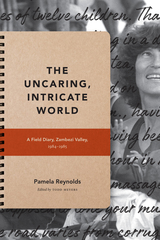 The Uncaring, Intricate World: A Field Diary, Zambezi Valley, 1984-1985
Pamela Reynolds
Duke University Press, 2019 In the 1950s the colonial British government in Northern and Southern Rhodesia (present-day Zambia and Zimbabwe) began construction on a large hydroelectric dam that created Lake Kariba and dislocated nearly 60,000 indigenous residents. Three decades later, Pamela Reynolds began fieldwork with the Tonga people to study the lasting effects of the dispossession of their land on their lives. In The Uncaring, Intricate World Reynolds shares her field diary, in which she records her efforts to study children and their labor and, by doing so, exposes the character of everyday life. More than a memoir, her diary captures the range of pleasures, difficulties, frustrations, contradictions, and grappling with ethical questions that all anthropologists experience in the field. The Uncaring, Intricate World concludes with afterwords by Jane I. Guyer and Julie Livingston, who critically reflect on its context, its meaning for today, and relevance to conducting anthropological work.
The Uncensored Boris Godunov: The Case for Pushkin's Original Comedy
Chester Dunning with Caryl Emerson, Sergei Fomichev, Lidiia Lotman, and Antony Wood
University of Wisconsin Press, 2007 Includes the original Russian text and, for the first time, an English translation of that version.
“Antony Wood’s translation is fluent and idiomatic; analyses by Dunning et al. are incisive; and the ‘case’ they make is skillfully argued. . . . Highly recommended.”—Choice
 The Uncensored Picture of Dorian Gray
Oscar Wilde
Harvard University Press, 2012 “Now, for the first time, we can read the version that Wilde intended…Both the text and Nicholas Frankel’s introduction make for fascinating reading.” —Paris Review
More than 120 years after Oscar Wilde submitted The Picture of Dorian Gray for publication in Lippincott’s Monthly Magazine, the uncensored version of his novel appears here for the first time in a paperback edition. This volume restores all of the material removed by the novel’s first editor.
Upon receipt of the typescript, Wilde’s editor panicked at what he saw. Contained within its pages was material he feared readers would find “offensive”—especially instances of graphic homosexual content. He proceeded to go through the typescript with his pencil, cleaning it up until he made it “acceptable to the most fastidious taste.” Wilde did not see these changes until his novel appeared in print. Wilde’s editor’s concern was well placed. Even in its redacted form, the novel caused public outcry. The British press condemned it as “vulgar,” “unclean,” “poisonous,” “discreditable,” and “a sham.” When Wilde later enlarged the novel for publication in book form, he responded to his critics by further toning down its “immoral” elements.
Wilde famously said that The Picture of Dorian Gray “contains much of me”: Basil Hallward is “what I think I am,” Lord Henry “what the world thinks me,” and “Dorian what I would like to be—in other ages, perhaps.” Wilde’s comment suggests a backward glance to a Greek or Dorian Age, but also a forward-looking view to a more permissive time than his own repressive Victorian era. By implication, Wilde would have preferred we read today the uncensored version of his novel.
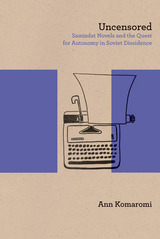 Uncensored: Samizdat Novels and the Quest for Autonomy in Soviet Dissidence
Ann Komaromi
Northwestern University Press, 2015 Literature that was self-published and informally circulated in the former Soviet Union in order to evade censorship, in addition to prosecution of its authors, came to be known as samizdat. Vasilii Aksenov, Andrei Bitov, and Venedikt Erofeev were among its most acclaimed practitioners. In her innovative study, Ann Komaromi uses their work to argue for a far more sophisticated understanding of the phenomenon of samizdat, showing how the material circumstances of its creation and dissemination exercised a profound influence on the very idea of dissidence. When a text comes to life as samizdat, it necessarily reconfigures the relationship between author and reader. Using archival research to fully illustrate samizdat’s social and historical context, Komaromi arrives at a more nuanced theoretical position that breaks down the opposition between the autonomous work of art and direct political engagement. The similarities between samizdat and digital culture give her formulation of dissident subjectivity particular contemporary relevance.
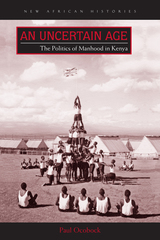 An Uncertain Age: The Politics of Manhood in Kenya
Paul Ocobock
Ohio University Press, 2017 In twentieth-century Kenya, age and gender were powerful cultural and political forces that animated household and generational relationships. They also shaped East Africans’ contact with and influence on emergent colonial and global ideas about age and masculinity. Kenyan men and boys came of age achieving their manhood through changing rites of passage and access to new outlets such as town life, crime, anticolonial violence, and nationalism. And as they did, the colonial government appropriated masculinity and maturity as means of statecraft and control. In An Uncertain Age, Paul Ocobock positions age and gender at the heart of everyday life and state building in Kenya. He excavates in unprecedented ways how the evolving concept of “youth” motivated and energized colonial power and the movements against it, exploring the masculinities boys and young men debated and performed as they crisscrossed the colony in search of wages or took the Mau Mau oath. Yet he also considers how British officials’ own ideas about masculinity shaped not only young African men’s ideas about manhood but the very nature of colonial rule. An Uncertain Age joins a growing number of histories that have begun to break down monolithic male identities to push the historiographies of Kenya and empire into new territory.
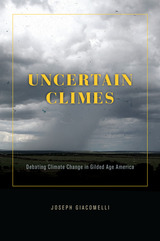 Uncertain Climes: Debating Climate Change in Gilded Age America
Joseph Giacomelli
University of Chicago Press, 2023 Uncertain Climes looks to the late nineteenth century to reveal how climate anxiety was a crucial element in the emergence of American modernity.
Even people who still refuse to accept the reality of human-induced climate change would have to agree that the topic has become inescapable in the United States in recent decades. But as Joseph Giacomelli shows in Uncertain Climes, this is actually nothing new: as far back as Gilded Age America, climate uncertainty has infused major debates on economic growth and national development.
In this ambitious examination of late-nineteenth-century understandings of climate, Giacomelli draws on the work of scientists, foresters, surveyors, and settlers to demonstrate how central the subject was to the emergence of American modernity. Amid constant concerns about volatile weather patterns and the use of natural resources, nineteenth-century Americans developed a multilayered discourse on climate and what it might mean for the nation’s future. Although climate science was still in its nascent stages during the Gilded Age, fears and hopes about climate change animated the overarching political struggles of the time, including expansion into the American West. Giacomelli makes clear that uncertainty was the common theme linking concerns about human-induced climate change with cultural worries about the sustainability of capitalist expansionism in an era remarkably similar to the United States’ unsettled present.
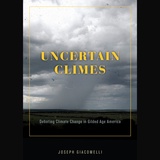 Uncertain Climes: Debating Climate Change in Gilded Age America
Joseph Giacomelli
University of Chicago Press, 2023 This is an auto-narrated audiobook edition of this book.
Uncertain Climes looks to the late nineteenth century to reveal how climate anxiety was a crucial element in the emergence of American modernity.
Even people who still refuse to accept the reality of human-induced climate change would have to agree that the topic has become inescapable in the United States in recent decades. But as Joseph Giacomelli shows in Uncertain Climes, this is actually nothing new: as far back as Gilded Age America, climate uncertainty has infused major debates on economic growth and national development.
In this ambitious examination of late-nineteenth-century understandings of climate, Giacomelli draws on the work of scientists, foresters, surveyors, and settlers to demonstrate how central the subject was to the emergence of American modernity. Amid constant concerns about volatile weather patterns and the use of natural resources, nineteenth-century Americans developed a multilayered discourse on climate and what it might mean for the nation’s future. Although climate science was still in its nascent stages during the Gilded Age, fears and hopes about climate change animated the overarching political struggles of the time, including expansion into the American West. Giacomelli makes clear that uncertainty was the common theme linking concerns about human-induced climate change with cultural worries about the sustainability of capitalist expansionism in an era remarkably similar to the United States’ unsettled present.
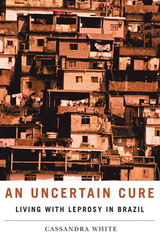 An Uncertain Cure: Living with Leprosy in Brazil
White, Cassandra
Rutgers University Press, 2008 In many cultures, leprosy elicits fear, stigma, and misunderstanding. Historically, people affected by leprosy were banished or isolated from the rest of society. Although the worldwide incidence of leprosy has declined markedly over the past quarter century with the advent of new multidrug therapies, developing nations are still encountering a high number of cases. In An Uncertain Cure, Cassandra White goes deep into the shantytowns of Rio de Janeiro to give a riveting account of the contemporary leprosy experience among poor and working class Brazilians. In this ethnographic treatment of leprosy sufferers, White exposes the web of historical, socioeconomic, religious, and political forces that complicate the path to wellness and perpetuate high rates of infection. Drawing on nearly ten years of research, White shows how anthropological research can contribute to more effective treatment of chronic infectious diseases around the world.
 Uncertain Dimensions: Western Overseas Empires in the Twentieth Century
Raymond F. Betts
University of Minnesota Press, 1985
Uncertain Dimensions was first published in 1985. Minnesota Archive Editions uses digital technology to make long-unavailable books once again accessible, and are published unaltered from the original University of Minnesota Press editions.
World War I battered the Western imperial systems and destroyed one, that of Germany, but it did not sound the death knell of an empire. The "scramble" for overseas territory ha reached a virtual conclusion shortly before the war; afterwards, the main business of empire was to ensure a pax colonia: the often contradictory goals of a stable government and economic development. It is with the years between world wars—the brief age of administrative empire — that Raymond Betts is chiefly concerned in this book. An unsettled time, when individuals coped with empire of uncertain dimensions, the interwar years nonetheless left a material legacy—railroads, motor roads, public buildings — and an ideological one—the voices of protest that led to independence after World War II.
Preeminently a cultural history of the era rather than a political narrative, Uncertain Dimensions centers upon the regions we now call the Third World—Subsaharan Africa and Southeast Asia—and the major colonial powers, Great Britain and France. Betts has structured this book as a group of closely linked interpretive essays, each devoted to a specific aspect of the late colonial experience: World War I and the postwar mandates, colonial administration, the European economic imperative and "technology transfer," urbanization, anti-imperial protest, and decolonization. Throughout, he draws upon the work of novelists, poets, and theoreticians—Aime Cesaire, Claude McKay, Leopold Sedar Senghor, Frantz Fanon, and many others—and recognizes the deep irony at the heart of modern imperialism: that contact between Western and Third worlds was mostly confined to two minorities, the alien European and the socially uprooted African or Asian.
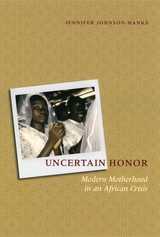 Uncertain Honor: Modern Motherhood in an African Crisis
Jennifer Johnson-Hanks
University of Chicago Press, 2005 In most countries, educated women have fewer children and have them later than uneducated women. In Uncertain Honor, Jennifer Johnson-Hanks argues that this demographic fact has social causes by offering a rich case study of contraception, abortion, and informal adoption among educated, ethnic Beti women in southern Cameroon.
Combining insights from demography and cultural anthropology, Johnson-Hanks argues that Beti women delay motherhood as part of a broader attempt to assert a modern form of honor only recently made possible by formal education, Catholicism, and economic change. Through itinerant school careers and manipulations of marriage, educated Beti women now manage their status as mothers in order to coordinate major life events in the face of social and economic uncertainty.
Carefully researched and clearly written, Uncertain Honor offers an intimate look at the lives of African women trying to reconcile motherhood with new professional roles in a context of dramatic social change.
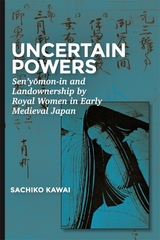 Uncertain Powers: Sen’yōmon-in and Landownership by Royal Women in Early Medieval Japan
Sachiko Kawai
Harvard University Press Uncertain Powers is an original and much-needed analysis of female leadership in medieval Japan. In challenging current scholarship by exploring the important political and economic roles of twelfth- and thirteenth-century Japanese royal women, Sachiko Kawai questions the traditional view of the era as one dominated by male retired monarchs and a warrior government. Instead the author populates it with royal wives and daughters who held the title of premier royal lady (nyoin) and owned extensive estates across the Japanese archipelago. Nyoin, whose power varied according to marital status, networks, and age, used their wealth and human networks to build temples and organize their entourages as salons to assert religious, cultural, and political influence. Confronted with social factors and gender disparities, they were motivated to develop coping strategies, the workings of which Kawai masterfully teases out from the abundant primary sources.
Uncertain Powers presents a nuanced and groundbreaking study of the relationship between a nyoin’s authority (her acknowledged rights) and her actual power (the ability to enforce those rights), demonstrating how, as members of political factions, as landlords, and as religious and cultural patrons, nyoin struggled to transform authority into power by means of cooperation, persuasion, compromise, and coercion.
Uncertain Safety: Allocating Responsibilities for Safety
Netherlands Scientific Council for Government Policy
Amsterdam University Press, 2009
Floods and fires, food safety, hazardous materials, infectious diseases, and many other threats to public health and the environment call for ongoing public alertness. However, the ways in which these safety risks are currently assessed and managed fall short in addressing the uncertainties of future threats. In this vital report, the Netherlands Scientific Council for Government Policy provides an exhaustive overview of the political, economic, and ethical dimensions of various risks and the safety policies aimed at reducing them.
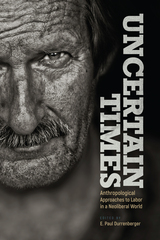 Uncertain Times: Anthropological Approaches to Labor in a Neoliberal World
E. Paul Durrenberger
University Press of Colorado, 2017 In this first-ever collection of labor anthropology from around the world, the contributors to Uncertain Times assert that traditional labor unions have been co-opted by neoliberal policies of corporate capital and have become service organizations rather than drivers of social movements. The current structure of labor unions facilitates corporations’ need for a stable labor force while reducing their power to prevent outsourcing, subcontracting, and other methods of undercutting worker security and union power. Through case studies from Switzerland, Israel, Argentina, Mexico, the United States, Greece, Sweden,Turkey, Brazil and Spain, the authors demonstrate that this process of neutering unions has been uneven across time and space. They also show that the potential exists for renewed union power based on more vociferous and creative collective action. These firsthand accounts—from activist anthropologists in the trenches as union members and staff, as well as academics analyzing policy, law, worker organizing, and community impact—illustrate the many approaches that workers around the world are taking to reclaim their rights in this ever-shifting labor landscape. Uncertain Times is the first book to use this crucial comparative, ethnographic approach for understanding the new rules of the global labor struggle and the power workers have to change those rules. The volume will be of great interest to students and scholars of anthropology, sociology of work, and labor studies; labor union leadership; and others interested in developing innovative methods for organizing working people, fomenting class consciousness, and expanding social movements. Contributors: Alpkan Birelma, Emma Braden, Maria Eugenia de la O, Christopher Kelley, Staffan Löfving, Gadi Nissim, Darcy Pan, Steven Payne, Alicia Reigada, Julia Soul, Manos Spyridakis, Christian Zlolniski
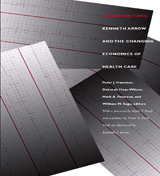 Uncertain Times: Kenneth Arrow and the Changing Economics of Health Care
Peter J. Hammer, Deborah Haas-Wilson, Mark A. Peterson, and William M. Sage, eds.
Duke University Press, 2003 This volume revisits the Nobel Prize-winning economist Kenneth Arrow’s classic 1963 essay “Uncertainty and the Welfare Economics of Medical Care” in light of the many changes in American health care since its publication. Arrow’s groundbreaking piece, reprinted in full here, argued that while medicine was subject to the same models of competition and profit maximization as other industries, concepts of trust and morals also played key roles in understanding medicine as an economic institution and in balancing the asymmetrical relationship between medical providers and their patients. His conclusions about the medical profession’s failures to “insure against uncertainties” helped initiate the reevaluation of insurance as a public and private good. Coming from diverse backgrounds—economics, law, political science, and the health care industry itself—the contributors use Arrow’s article to address a range of present-day health-policy questions. They examine everything from health insurance and technological innovation to the roles of charity, nonprofit institutions, and self-regulation in addressing medical needs. The collection concludes with a new essay by Arrow, in which he reflects on the health care markets of the new millennium. At a time when medical costs continue to rise, the ranks of the uninsured grow, and uncertainty reigns even among those with health insurance, this volume looks back at a seminal work of scholarship to provide critical guidance for the years ahead. Contributors
Linda H. Aiken
Kenneth J. Arrow
Gloria J. Bazzoli
M. Gregg Bloche
Lawrence Casalino
Michael Chernew
Richard A. Cooper
Victor R. Fuchs
Annetine C. Gelijns
Sherry A. Glied
Deborah Haas-Wilson
Mark A. Hall
Peter J. Hammer
Clark C. Havighurst
Peter D. Jacobson
Richard Kronick
Michael L. Millenson
Jack Needleman
Richard R. Nelson
Mark V. Pauly
Mark A. Peterson
Uwe E. Reinhardt
James C. Robinson
William M. Sage
J. B. Silvers
Frank A. Sloan
Joshua Graff Zivin
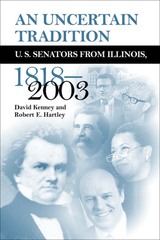 An Uncertain Tradition
David Kenney and Robert E. Hartley
Southern Illinois University Press, 2003 This sweeping survey constitutes the first comprehensive treatment of the forty-seven individuals—forty-six white males and one African American female—who have been chosen to represent Illinois in the United States Senate from 1818 to 2003. David Kenney and Robert E. Hartley underscore nearly two centuries of Illinois history with these biographical and political portraits, compiling an incomparably rich resource for students, scholars, teachers, journalists, historians, politicians, and any Illinoisan interested in the state’s heritage. An Uncertain Tradition:U. S. Senators from Illinois, 1818–2003 is a fresh and careful study of the shifting set of political issues occurring over time and illuminated by the lives of participants in the politics of choice and service in the Senate. Kenney and Hartley plot the course of the state’s varied senatorial leadership, from the state’s founding and the appearance of political parties, through the Civil War and its aftermath, and into the diverse political climate of the twenty-first century. From the notorious to the heroic, the popular to the pioneering, the senatorial roster includes such luminaries as “The Little Giant” Stephen A. Douglas; Lyman Trumbull, who served three terms in the Civil War era; “Uncle Dick” and “Black Jack,” also known as Richard Oglesby and John A. Logan; the “Wizard of Ooze” Everett Dirksen; and modern leaders such as Adlai Stevenson III, Paul Simon, and Carol Moseley-Braun. Kenney and Hartley offer incisive commentary on the quality of senate service in each case, as well as timeline graphs relating to the succession of individuals in each of the two sequences of service, the geographical distribution of senators within the state, and the variations in party voting for senate candidates. Rigorously documented and supremely readable, this convenient reference volume is enhanced by portraits of many of the senators.
 The Uncertain World of Renaissance Geneva and Savoy: Political Life, Factional Conflicts and Religious Turmoil
Mathieu Caesar
Amsterdam University Press, 2025 Uncertainty and instability affected Geneva and the Duchy of Savoy since the mid-fifteenth century. French and Swiss expansionism had turned Savoy into part of a long geopolitical fault line, running from the North Sea to the Mediterranean along the border between France and the Empire. In Geneva, and partially in other towns of Piedmont and the Pays de Vaud, this instability fuelled urban factionalism, confessional conflicts, but also wider discussions about the ways in which society could be reformed. Conflicts were, in the end, the consequence of a struggle about the best political and religious option to reduce uncertainty. The Uncertain World of Renaissance Geneva and Savoy looks at how political life worked in a time of great instability, seeking to answer a straightforward—but not easy—question: how did people face and react to political and religious uncertainty?
Uncertainties Of Knowledge
Immanuel Wallerstein
Temple University Press, 2004 The Uncertainties of Knowledge extends Immanuel Wallerstein's decade-long work of elucidating the crisis of knowledge in current intellectual thought. He argues that the disciplinary divisions of academia have trapped us in a paradigm that assumes knowledge is a certainty and that it can help us explain the social world. This is wrong, he suggests. Instead, Wallerstein offers a new conception of the social sciences, one whose methodology allows for uncertainties.
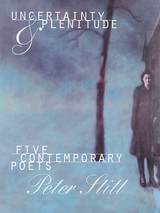 Uncertainty and Plenitude: Five Contemporary Poets
Peter Stitt
University of Iowa Press, 1997 From the extraordinary diversity of contemporary poetry, Peter Stitt, the distinguished critic and editor of the Gettysburg Review, has chosen in this book to write about five poets only, all premier practitioners—John Ashbery, Stephen Dobyns, Charles Simic, Gerald Stern, and Charles Wright, with a special look at Stanley Kunitz in relation to Wright. Stitt's confident and inventive assessments of these fine poets' work help us gain some focus on the “uncertainty and plenitude” of the current poetry scene, demonstrating that concentrated and knowledgeable criticism can show us ways to begin measuring the accomplishments of our poetic age.
Stitt's interest in these five poets is intellectual and aesthetic. As he states, “I chose these particular writers because their work continues to interest me deeply, both intellectually and formally, even after years of familiarity.” He uses his understanding of the philosophical implications inherent in modern physics, as they apply to both content and form, as the basis for his close analysis.
Stitt attends to the poets' writerly strategies so that we may discover in their poetry where “surface form” intersects and complements meaning and thus becomes, in John Berryman's terms, “deep form.” He explains what these poets say and how they say it and what relationships lie between. He also shows how humor plays a part in some of their work.
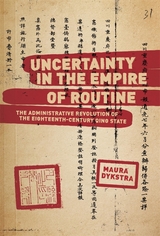 Uncertainty in the Empire of Routine: The Administrative Revolution of the Eighteenth-Century Qing State
Maura Dykstra
Harvard University Press, 2022 Uncertainty in the Empire of Routine investigates the administrative revolution of China’s eighteenth-century Qing state. It begins in the mid-seventeenth century with what seemed, at the time, to be straightforward policies to clean up the bureaucracy: a regulation about deadlines here, a requirement about reporting standards there. Over the course of a hundred years, the central court continued to demand more information from the provinces about local administrative activities. By the middle of the eighteenth century, unprecedented amounts of data about local offices throughout the empire existed.
The result of this information coup was a growing discourse of crisis and decline. Gathering data to ensure that officials were doing their jobs properly, it turned out, repeatedly exposed new issues requiring new forms of scrutiny. Slowly but surely, the thicket of imperial routines and standards binding together local offices, provincial superiors, and central ministries shifted the very epistemological foundations of the state. A vicious cycle arose whereby reporting protocols implemented to solve problems uncovered more problems, necessitating the collection of more information. At the very moment that the Qing knew more about itself than ever before, the central court became certain that it had entered an age of decline.
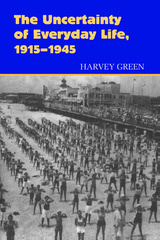 Uncertainty of Everyday Life, 1915–1945
Harvey Green
University of Arkansas Press, 1992 The era between the world wars, from the "roaring 20s" to the grim days of the Great Depression, was a time of tremendous change. The United States became an increasingly urban culture as people left their farms to seek work in the cities. Many blacks moved North to escape the violence and racism of a resurgent Ku Klux Klan in the South. And, while life became more comfortable for many Americans during this period, by 1941 only half the population enjoyed the modern conveniences we now take for granted. With improvements in technology and the rise of consumerism (spurred by the new "science" of advertising) the country was expanding in every direction. However, for many Americans, daily life was fraught with uncertainty. Jobs and wages were unpredictable, labor unrest was constant, and savings vanished in the stock market. In this vividly detailed narrative, Harvey Green recounts an era of unprecedented change in American culture and examines the impact of these uncertain times on such aspects of daily life as employment, home life, gender roles, education, religion, and recreation.
Uncertainty Quantification of Electromagnetic Devices, Circuits, and Systems
Sourajeet Roy
The Institution of Engineering and Technology, 2022 Uncertainty Quantification of Electromagnetic Devices, Circuits, and Systems describes the advances made over the last decade in the topic of uncertainty quantification (UQ) and stochastic analysis. The primary goal of the book is to educate and inform electronics engineers about the most recent numerical techniques, mathematical theories, and computational methods to perform UQ for electromagnetic devices, circuits, and systems.
 Unchanged Trebles: What Boy Choirs Teach Us About Motherhood and Masculinity
Rebekah Peeples
Rutgers University Press, 2026 Boy choirs are one of the oldest musical traditions in the Western world. While audiences admire boy singers for their distinctive treble notes, boys who sing in soprano voices have to contend with the notion that they’re doing something effeminate, even emasculating, because they sing in a vocal range typically reserved for women and girls. Known as the “unchanged trebles” within choirs, boys who sing in soprano voices defy prevailing norms of traditional masculinity. What do boy choirs represent in a culture that increasingly sees gender as an individual choice rather than a fixed, biological category? And is this tradition, which is rooted in exclusion of girls and women, one worth saving?
In Unchanged Trebles, Rebekah Peeples charts an unexpected, thought-provoking, and deeply personal journey into the peculiar world of contemporary boy choirs, where boys learn to do something together that they’re often embarrassed to do alone: sing in their soprano voices. Considering her experience as the unlikely mother of a boy soprano alongside dozens of interviews with current directors and former choristers, she argues that some of the tools for creating a more gender-inclusive future can be found in an ancient tradition that has long recognized gender fluidity within the pre-pubescent male body. With humor, insight, and the voice of a gifted storyteller, Unchanged Trebles explores a cultural tradition in which singing and expressing emotion are encouraged for boys, showing them a more expansive form of masculinity as they transition from boyhood to manhood.
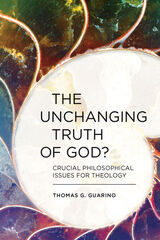 The Unchanging Truth of God? Crucial Philosophical Issues for Theology
Thomas G. Guarino
Catholic University of America Press, 2021 It has long been a cornerstone of Catholic belief that Christians can be intelligent and creative thinkers—inquisitive seekers after truth—as well as men and women of ardent faith. Catholics are entirely committed, then, to the claim that human rationality and religious faith are complementary realities since they are equally gifts of God.
But understanding precisely how faith and reason cohere has not always been a smooth path. At times, theology has allowed philosophy to become the leading (and baleful) partner in the faith-reason relationship, thereby lapsing into rationalism or relativism. At other times, theology has been tempted by fideism, with philosophy now regarded as little more than a pernicious intruder corrupting Christian faith, life and thought.
The essays in this volume display how Catholicism understands the proper confluence between philosophy and theology, between human rationality and Christian faith, between the natural order and supernatural grace. To illustrate these points, the book draws on a long line of Christian thinkers: Origen, Augustine, Anselm, Aquinas and, in our own day, Fides et Ratio of John Paul II and the Regensburg Address of Benedict XVI.
How is theology always a “Jewgreek” enterprise—to borrow a term from Jacques Derrida—always a combination of the biblical (Hebraic) and philosophical (Hellenic) traditions? Why is one particular element of philosophy, metaphysics, essential for the intelligibility and clarity of Catholic theology? Why is this so much the case that John Paul II could state emphatically: “a philosophy which shuns metaphysics would be radically unsuited to the task of mediation in the understanding of Revelation”?
But theology cannot simply be about dialogue with philosophers of yesteryear. Theology must constantly incorporate fresh thinking and remain in lively conversation with an extensive variety of contemporary perspectives. This book displays how reciprocity and absorption has been characteristic of theology’s past and must represent its future as well.
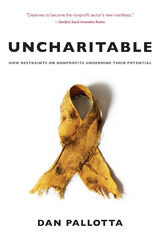 Uncharitable: How Restraints on Nonprofits Undermine Their Potential
Dan Pallotta
University Press of New England, 2010 Uncharitable goes where no other book on the nonprofit sector has dared to tread. Where other texts suggest ways to optimize performance inside the existing paradigm, Uncharitable suggests that the paradigm itself is the problem and calls into question our fundamental canons about charity. Author Dan Pallotta argues that society’s nonprofit ethic acts as a strict regulatory mechanism on the natural economic law. It creates an economic apartheid that denies the nonprofit sector critical tools and permissions that the for-profit sector is allowed to use without restraint (e.g., no risk-reward incentives, no profit, counterproductive limits on compensation, and moral objections to the use of donated dollars for anything other than program expenditures). These double-standards place the nonprofit sector at extreme disadvantage to the for profit sector on every level. While the for profit sector is permitted to use all the tools of capitalism to advance the sale of consumer goods, the nonprofit sector is prohibited from using any of them to fight hunger or disease. Capitalism is blamed for creating the inequities in our society, but charity is prohibited from using the tools of capitalism to rectify them. Ironically, this is all done in the name of charity, but it is a charity whose principal benefit flows to the for-profit sector and one that denies the nonprofit sector the tools and incentives that have built virtually everything of value in society. The very ethic we have cherished as the hallmark of our compassion is in fact what undermines it. This irrational system, Pallotta explains, has its roots in 400-year-old Puritan ethics that banished self-interest from the realm of charity. The ideology is policed today by watchdog agencies and the use of “efficiency” measures, which Pallotta argues are flawed, unjust, and should be abandoned. By declaring our independence from these obsolete ideas, Pallotta theorizes, we can dramatically accelerate progress on the most urgent social issues of our time. Pallotta has written an important, provocative, timely, and accessible book—a manifesto about equal economic rights for charity. Its greatest contribution may be to awaken society to the fact that they were so unequal in the first place.
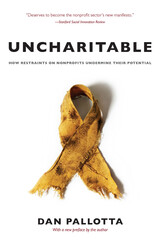 Uncharitable: How Restraints on Nonprofits Undermine Their Potential
Dan Pallotta
Brandeis University Press, 2022 Uncharitable investigates how for-profit strategies could and should be used by nonprofits.
Uncharitable goes where no other book on the nonprofit sector has dared to tread. Where other texts suggest ways to optimize performance inside the existing charity paradigm, Uncharitable suggests that the paradigm itself is the problem and calls into question our fundamental canons about charity. Dan Pallotta argues that society’s nonprofit ethic creates an inequality that denies the nonprofit sector critical tools and permissions that the for-profit sector is allowed to use without restraint. These double standards place the nonprofit sector at an extreme disadvantage. While the for-profit sector is permitted to use all the tools of capitalism, the nonprofit sector is prohibited from using any of them. Capitalism is blamed for creating inequities in our society, but charity is prohibited from using the tools of capitalism to rectify them—and ironically, this is all done in the name of charity. This irrational system, Pallotta explains, has its roots in four-hundred-year-old Puritan ethics that banished self-interest from the realm of charity. The ideology is policed today by watchdog agencies and the use of so-called efficiency measures, which Pallotta argues are flawed, unjust, and should be abandoned. By declaring our independence from these obsolete ideas, Pallotta theorizes, we can dramatically accelerate progress on the most urgent social issues of our time. Uncharitable is an important, provocative, timely, and accessible book—a manifesto about equal economic rights for charity. This edition has a new, updated introduction by the author.
Uncharted: Creativity and the Expert Drummer
Bill Bruford
University of Michigan Press, 2018 What do expert drummers do? Why do they do it? Is there anything creative about it? If so, how might that creativity inform their practice and that of others in related artistic spheres? Applying ideas from cultural psychology to findings from research into the creative behaviors of a specific subset of popular music instrumentalists, Bill Bruford demonstrates the ways in which expert drummers experience creativity in performance and offers fresh insights into in-the-moment interactional processes in music. An expert practitioner himself, Dr. Bruford draws on a cohort of internationally renowned, peak-career professionals and his own experience to guide the reader through the many dimensions of creativity in drummer performance.
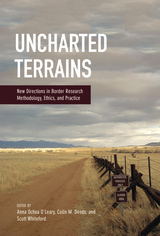 Uncharted Terrains: New Directions in Border Research Methodology, Ethics, and Practice
Edited by Anna Ochoa O’Leary, Colin M. Deeds, and Scott Whiteford
University of Arizona Press, 2013 “We must secure our borders” has become an increasingly common refrain in the United States since 2001. Most of the “securing” has focused on the US–Mexico border. In the process, immigrants have become stigmatized, if not criminalized. This has had significant implications for social scientists who study the lives and needs of immigrants, as well as the effectiveness of programs and policies designed to help them. In this groundbreaking book, researchers describe their experiences in conducting field research along the southern US border and draw larger conclusions about the challenges of contemporary border research.
Each chapter raises methodological and ethical questions relevant to conducting research in transnational contexts, which can frequently be unpredictable or even volatile. The volume addresses the central question of how can scholars work with vulnerable migrant populations along the perilous US–Mexico border and maintain ethical and methodological standards, while also providing useful knowledge to stakeholders? Not only may immigrants be afraid to provide information that could be incriminating, but researchers may also be reluctant to allow their findings to become the basis of harsher law enforcement, unjustly penalize the subjects of their research, and inhibit the formulation of humane and effective immigration policy based on scholarly research.
All of these concerns, which are perfectly legitimate from the social scientists’ point of view, can put researchers into conflict with legal authorities. Contributors acknowledge their quandaries and explain how they have dealt with them. They use specific topics—reproductive health issues and sexually transmitted diseases among immigrant women, a study of undocumented business owners, and the administration of the Mexican Household Survey in Phoenix, among others—to outline research methodology that will be useful for generations of border researchers.
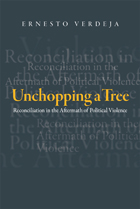 Unchopping a Tree: Reconciliation in the Aftermath of Political Violence
Ernesto Verdeja
Temple University Press, 2009 Political violence does not end with the last death. A common feature of mass murder has been the attempt at destroying any memory of victims, with the aim of eliminating them from history. Perpetrators seek not only to eliminate a perceived threat, but also to eradicate any possibility of alternate, competing social and national histories. In his timely and important book, Unchopping a Tree, Ernesto Verdeja develops a critical justification for why transitional justice works. He asks, “What is the balance between punishment and forgiveness? And, “What are the stakes in reconciling?”
Employing a normative theory of reconciliation that differs from prevailing approaches, Verdeja outlines a concept that emphasizes the importance of shared notions of moral respect and tolerance among adversaries in transitional societies. Drawing heavily from cases such as reconciliation efforts in Latin America and Africa—and interviews with people involved in such efforts—Verdeja debates how best to envision reconciliation while remaining realistic about the very significant practical obstacles such efforts face
Unchopping a Tree addresses the core concept of respect across four different social levels—political, institutional, civil society, and interpersonal—to explain the promise and challenges to securing reconciliation and broader social regeneration.
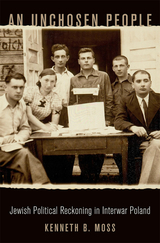 An Unchosen People: Jewish Political Reckoning in Interwar Poland
Kenneth B. Moss
Harvard University Press, 2021 A revisionist account of interwar Europe’s largest Jewish community that upends histories of Jewish agency to rediscover reckonings with nationalism’s pathologies, diaspora’s fragility, Zionism’s promises, and the necessity of choice.
What did the future hold for interwar Europe’s largest Jewish community, the font of global Jewish hopes? When intrepid analysts asked these questions on the cusp of the 1930s, they discovered a Polish Jewry reckoning with “no tomorrow.” Assailed by antisemitism and witnessing liberalism’s collapse, some Polish Jews looked past progressive hopes or religious certainties to investigate what the nation-state was becoming, what powers minority communities really possessed, and where a future might be found—and for whom.
The story of modern Jewry is often told as one of creativity and contestation. Kenneth B. Moss traces instead a late Jewish reckoning with diasporic vulnerability, nationalism’s terrible potencies, Zionism’s promises, and the necessity of choice. Moss examines the works of Polish Jewry’s most searching thinkers as they confronted political irrationality, state crisis, and the limits of resistance. He reconstructs the desperate creativity of activists seeking to counter despair where they could not redress its causes. And he recovers a lost grassroots history of critical thought and political searching among ordinary Jews, young and powerless, as they struggled to find a viable future for themselves—in Palestine if not in Poland, individually if not communally.
Focusing not on ideals but on a search for realism, Moss recasts the history of modern Jewish political thought. Where much scholarship seeks Jewish agency over a collective future, An Unchosen People recovers a darker tradition characterized by painful tradeoffs amid a harrowing political reality, making Polish Jewry a paradigmatic example of the minority experience endemic to the nation-state.
 Uncivil Agreement: How Politics Became Our Identity
Lilliana Mason
University of Chicago Press, 2018 A powerful analysis of the causes of America's dangerously polarized politics
Political polarization in America is at an all-time high, and the conflict has moved beyond disagreements about matters of policy. For the first time in more than twenty years, research has shown that members of both parties hold strongly unfavorable views of their opponents. This is polarization rooted in social identity, and it is growing. The campaign and election of Donald Trump laid bare this fact of the American electorate, its successful rhetoric of “us versus them” tapping into a powerful current of anger and resentment.
With Uncivil Agreement, Lilliana Mason looks at the growing social gulf across racial, religious, and cultural lines, which have recently come to divide neatly between the two major political parties. She argues that group identifications have changed the way we think and feel about ourselves and our opponents. Even when Democrats and Republicans can agree on policy outcomes, they tend to view one other with distrust and to work for party victory over all else. Although the polarizing effects of social divisions have simplified our electoral choices and increased political engagement, they have not been a force that is, on balance, helpful for American democracy. Bringing together theory from political science and social psychology, Uncivil Agreement clearly describes this increasingly “social” type of polarization in American politics and will add much to our understanding of contemporary politics.
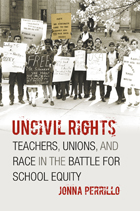 Uncivil Rights: Teachers, Unions, and Race in the Battle for School Equity
Jonna Perrillo
University of Chicago Press, 2012 Almost fifty years after Brown v. Board of Education, a wealth of research shows that minority students continue to receive an unequal education. At the heart of this inequality is a complex and often conflicted relationship between teachers and civil rights activists, examined fully for the first time in Jonna Perrillo’s Uncivil Rights, which traces the tensions between the two groups in New York City from the Great Depression to the present. While movements for teachers’ rights and civil rights were not always in conflict, Perrillo uncovers the ways they have become so, brought about both by teachers who have come to see civil rights efforts as detracting from or competing with their own goals and by civil rights activists whose aims have de-professionalized the role of the educator. Focusing in particular on unionized teachers, Perrillo finds a new vantage point from which to examine the relationship between school and community, showing how in this struggle, educators, activists, and especially our students have lost out.
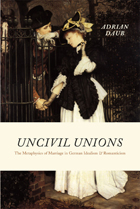 Uncivil Unions: The Metaphysics of Marriage in German Idealism and Romanticism
Adrian Daub
University of Chicago Press, 2012 “What a strange invention marriage is!” wrote Kierkegaard. “Is it the expression of that inexplicable erotic sentiment, that concordant elective affinity of souls, or is it a duty or a partnership . . . or is it a little of all that?” Like Kierkegaard a few decades later, many of Germany’s most influential thinkers at the turn of the eighteenth century wondered about the nature of marriage but rejected the easy answers provided by biology and theology. In Uncivil Unions, Adrian Daub presents a truly interdisciplinary look at the story of a generation of philosophers, poets, and intellectuals who turned away from theology, reason, common sense, and empirical observation to provide a purely metaphysical justification of marriage. Through close readings of philosophers like Fichte and Schlegel, and novelists like Sophie Mereau and Jean Paul, Daub charts the development of this new concept of marriage with an insightful blend of philosophy, cultural studies, and theory. The author delves deeply into the lives and work of the romantic and idealist poets and thinkers whose beliefs about marriage continue to shape ideas about gender, marriage, and sex to the present day.
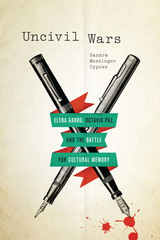 Uncivil Wars: Elena Garro, Octavio Paz, and the Battle for Cultural Memory
By Sandra Messinger Cypess
University of Texas Press, 2012 The first English-language book to place the works of Elena Garro (1916–1998) and Octavio Paz (1914–1998) in dialogue with each other, Uncivil Wars evokes the lives of two celebrated literary figures who wrote about many of the same experiences and contributed to the formation of Mexican national identity but were judged quite differently, primarily because of gender. While Paz’s privileged, prize-winning legacy has endured worldwide, Garro’s literary gifts garnered no international prizes and received less attention in Latin American literary circles. Restoring a dual perspective on these two dynamic writers and their world, Uncivil Wars chronicles a collective memory of wars that shaped Mexico, and in turn shaped Garro and Paz, from the Conquest period to the Mexican Revolution; the Spanish Civil War, which the couple witnessed while traveling abroad; and the student massacre at Tlatelolco Plaza in 1968, which brought about social and political changes and further tensions in the battle of the sexes. The cultural contexts of machismo and ethnicity provide an equally rich ground for Sandra Cypess’s exploration of the tandem between the writers’ personal lives and their literary production. Uncivil Wars illuminates the complexities of Mexican society as seen through a tense marriage of two talented, often oppositional writers. The result is an alternative interpretation of the myths and realities that have shaped Mexican identity, and its literary soul, well into the twenty-first century.
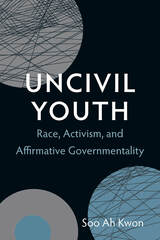 Uncivil Youth: Race, Activism, and Affirmative Governmentality
Soo Ah Kwon
Duke University Press, 2013 In Uncivil Youth, Soo Ah Kwon explores youth of color activism as linked to the making of democratic citizen-subjects. Focusing attention on the relations of power that inform the social and political practices of youth of color, Kwon examines how after-school and community-based programs are often mobilized to prevent potentially "at-risk" youth from turning to "juvenile delinquency" and crime. These sorts of strategic interventions seek to mold young people to become self-empowered and responsible citizens. Theorizing this mode of youth governance as "affirmative governmentality," Kwon investigates the political conditions that both enable youth of color to achieve meaningful change and limit their ability to do so given the entrenchment of nonprofits in the logic of a neoliberal state. She draws on several years of ethnographic research with an Oakland-based, panethnic youth organization that promotes grassroots activism among its second-generation Asian and Pacific Islander members (ages fourteen to eighteen). While analyzing the contradictions of the youth organizing movement, Kwon documents the genuine contributions to social change made by the young people with whom she worked in an era of increased youth criminalization and anti-immigrant legislation.
Uncle Abner: Master of Mysteries
Melville Davisson Post
West Virginia University Press, 2015 First published in 1918, Uncle Abner: Master of Mysteries is an anthology of detective stories written by Melville Davisson Post. The popular stories within this collection were serialized in national magazines such as the Saturday Evening Post in the early 20th century. Uncle Abner is an amateur detective in present-day Harrison County, West Virginia. Throughout his journeys around this antebellum wilderness, long before the nation had a proper police system, the honest Uncle Abner is confronted by murders and mysteries that cannot be ignored. With uncanny intuition, impressive logic, and keen observation of human actions, Uncle Abner is Melville Davisson Post’s most celebrated literary creation and is considered to be one of the most important texts in American detective and crime fiction. This new edition contains an introduction by Craig Johnson, author of the Walt Longmire novels.
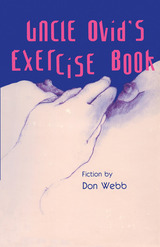 Uncle Ovid's Exercise Book
Don Webb
University of Alabama Press, 1988 In these postmodernist episodes of high comedy, Don Webb turns Ovid's classic work, The Metamorphosis, on its head Awarded the 1988 Illinois State University/Fiction Collective Prize through a nationwide fiction competition, Webb's first book of fiction, Uncle Ovid's Exercise Book, explores the theme of change in hitherto unimagined manifestations—from the everyday to the mysterious to the miraculous. These eight dozen "metamorphoses" are widely funny, profound, and—like change itself—always surprising. With rare originality and breadth, Webb draws upon Egyptian mythology, molecular biology, classical poetry, contemporary pop culture, literary theory, Eastern mysticism, and science fiction, composing them into an offbeat fugue on the theme of transformation. "Metamorphosis No. 39" resurrects the ancient Egyptian gods, Set, Toth, and Osiris, who return to America to mastermind a plot to alter contemporary consciousness. Their scheme includes the broadcast of subliminal archetypal images during returns of "I Love Lucy." In a later metamorphosis, another ancient god—Dionysius—returns to modern day Atlantic City to recruit winos for a new band of satyrs. Ancient gods are not the only agents of change. Metamorphosis also spreads to the White House in an episode describing the clandestine life of the president's drug supplier—who risks death to satisfy the chief executive's taste for organic hallucinogens.
A hilarious New Age western saga unfolds in "Metamorphosis No.5" W.B. Porter, the "Last of the Singing Cowboys"— a hero with a degree in chemical engineering and a proficiency on the sitar—foils the Uzi-toting Mendoza gang—"tough hombres schooled in the Fourteen Mysteries of Toltec Sorcery"—in their attempt to pull a heist on a condo construction project. This theme of transformation extends even to the farming narrative of UOEB itself, which at one point unexpectedly becomes the diary of an Englishwoman who is held captive in a potting shed by a maniacal pastor.
These variations on a theme are sometimes hilarious, sometimes cryptic, sometimes curiously moving—and always disturbingly provocative. With his hat off to Ovid, Don Webb pulls together high-spirited wit, eclecticism, and sheer inventiveness to make Uncle Ovid's Exercise Book a richly comic, absorbing, and singular work of a new order.
Uncle Sam’s Camels: The Journal of May Humphreys Stacey Supplemented by the Report of Edward Fitzgerald Beale (1857–1858)
Lewis Burt Lesley
Harvard University Press In this book is brought together the story of the little-known camel experiment during the fifties of the last century, an episode constituting one step in the consolidation of a nation. Professor Lesley has edited two Journals which, with introductory and concluding chapters, give a complete account of this attempt to solve transportation problems in the Far West. It is an important volume for all who are interested in the Old Frontier, and a most amusing story for the general reader.
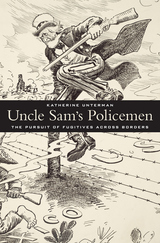 Uncle Sam’s Policemen: The Pursuit of Fugitives across Borders
Katherine Unterman
Harvard University Press, 2015 Extraordinary rendition—the practice of abducting criminal suspects in locations around the world—has been criticized as an unprecedented expansion of U.S. police powers. But America’s aggressive pursuit of fugitives beyond its borders far predates the global war on terror. Uncle Sam’s Policemen investigates the history of international manhunts, arguing that the extension of U.S. law enforcement into foreign jurisdictions at the turn of the twentieth century forms an important chapter in the story of American empire.
In the late 1800s, expanding networks of railroads and steamships made it increasingly easy for criminals to evade justice. Recognizing that domestic law and order depended on projecting legal authority abroad, President Theodore Roosevelt declared in 1903 that the United States would “leave no place on earth” for criminals to hide. Charting the rapid growth of extradition law, Katherine Unterman shows that the United States had fifty-eight treaties with thirty-six nations by 1900—more than any other country. American diplomats put pressure on countries that served as extradition havens, particularly in Latin America, and cloak-and-dagger tactics such as the kidnapping of fugitives by Pinkerton detectives were fair game—a practice explicitly condoned by the U.S. Supreme Court.
The most wanted fugitives of this period were not anarchists and political agitators but embezzlers and defrauders—criminals who threatened the emerging corporate capitalist order. By the early twentieth century, the long arm of American law stretched around the globe, creating an informal empire that complemented both military and economic might.
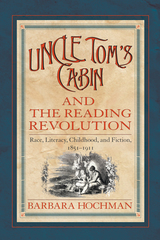 "Uncle Tom's Cabin" and the Reading Revolution: Race, Literacy, Childhood, and Fiction, 1851-1911
Barbara Hochman
University of Massachusetts Press, 2011 "Uncle Tom's Cabin" and the Reading Revolution explores a transformation in the cultural meaning of Stowe's influential book by addressing changes in reading practices and a shift in widely shared cultural assumptions. These changes reshaped interpretive conventions and generated new meanings for Stowe's text in the wake of the Civil War.
During the 1850s, men, women, and children avidly devoured Stowe's novel. White adults wept and could not put the book down, neglecting work and other obligations to complete it. African Americans both celebrated and denounced the book. By the 1890s, readers understood Uncle Tom's Cabin in new ways. Prefaces and retrospectives celebrated Stowe's novel as a historical event that led directly to emancipation and national unity. Commentaries played down the evangelical and polemical messages of the book.
Illustrations and children's editions projected images of entertaining and devoted servants into an open-ended future. In the course of the 1890s, Uncle Tom's Cabin became both a more viciously racialized book than it had been and a less compelling one. White readers no longer consumed the book at one sitting; Uncle Tom's Cabin was now more widely known than read. However, in the growing silence surrounding slavery at the turn of the century, Stowe's book became an increasingly important source of ideas, facts, and images that the children of ex-slaves and other free-black readers could use to make sense of their position in U.S. culture.
Uncle Tom's Cabin: Or, Life Among the Lowly
Harriet Beecher Stowe
Harvard University Press, 2009 Easily the most controversial antislavery novel written in antebellum America, and one of the best-selling books of the nineteenth century, Uncle Tom’s Cabin is often credited with intensifying the sectional conflict that led to the Civil War. In his introduction, David Bromwich places Harriet Beecher Stowe’s novel in its Victorian contexts and reminds us why it is an enduring work of literary and moral imagination.The John Harvard Library text follows the first American edition, published by John P. Jewett & Company.
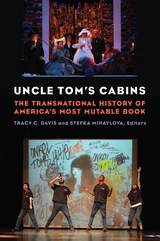 Uncle Tom's Cabins: The Transnational History of America's Most Mutable Book
Tracy C. Davis and Stefka Mihaylova, Editors
University of Michigan Press, 2018 As Harriet Beecher Stowe’s novel Uncle Tom’s Cabin traveled around the world, it was molded by the imaginations and needs of international audiences. For over 150 years it has been coopted for a dazzling array of causes far from what its author envisioned. This book tells thirteen variants of Uncle Tom’s journey, explicating the novel’s significance for Canadian abolitionists and the Liberian political elite that constituted the runaway characters’ landing points; nineteenth-century French theatergoers; liberal Cuban, Romanian, and Spanish intellectuals and social reformers; Dutch colonizers and Filipino nationalists in Southeast Asia; Eastern European Cold War communists; Muslim readers and spectators in the Middle East; Brazilian television audiences; and twentieth-century German holidaymakers.
Throughout these encounters, Stowe’s story of American slavery serves as a paradigm for understanding oppression, selectively and strategically refracting the African American slave onto other iconic victims and freedom fighters. The book brings together performance historians, literary critics, and media theorists to demonstrate how the myriad cultural and political effects of Stowe’s enduring story has transformed it into a global metanarrative with national, regional, and local specificity.
 Unclenching Our Fists: Abusive Men on the Journey to Nonviolence
Sara Elinoff Acker
Vanderbilt University Press, 2013 This book features eleven first-person stories of men from diverse class and racial backgrounds who have made a long-term commitment to end their physical and emotional abuse and controlling behaviors. These men speak frankly about the abuse they inflicted on their families, what it took to get them to face themselves, and how they feel about the damage they have caused. All participated in violence intervention programs, some for as long as ten years. To put a face on violence and to encourage activism for reform, most of the eleven have allowed their photos and real names to be used in the book.
Surrounding this material are chapters that provide context about the disputes among researchers about whether batterer intervention programs work (only a small number of batterers renounce their abuse) and chapters that address the reactions of partners to these stories. "When the Man You Love is Abusive" is designed to caution women not to be manipulated by accounts of change and to outline the stages men need to pass through in the long process of becoming accountable. "The Last Word: Voices of Survivors" ends the book with a focus group discussion in which former abuse victims and advocates respond candidly to the men's stories.
UNCLOS at 40: Essays in Honour of Ambassador Tommy Koh
Edited by Nilufer Oral and Tara Davenport
National University of Singapore Press, 2024 A collection of essays to mark the fortieth anniversary of the 1982 UNCLOS.
To commemorate forty years since the 1982 UN Convention on the Law of the Sea (UNCLOS) and in honor of one of the main architects of UNCLOS, Singapore's Ambassador Tommy Koh, UNCLOS at 40 brings together law of the sea judges, scholars, and practitioners to explore a wide range of issues. It explains the reasons for the continuing endurance of UNCLOS as the foundation for the governance of the oceans and looks ahead to new challenges.
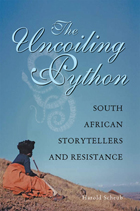 The Uncoiling Python: South African Storytellers and Resistance
Harold Scheub
Ohio University Press, 2010 There are many collections of African oral traditions, but few as carefully organized as The Uncoiling Python. Harold Scheub, one of the world’s leading scholars of African oral traditions and folklore, explores the ways in which oral traditions have served to combat and subvert colonial domination in South Africa. From the time colonial forces first came to southern Africa in 1487, oral and written traditions have been a bulwark against what became 350 years of colonial rule, characterized by the racist policies of apartheid. The Uncoiling Python: South African Storytellers and Resistance is the first in-depth study of oral tradition as a means of survival. In open insurrections and other subversive activities Africans resisted the daily humiliations of colonial rule, but perhaps the most effective and least apparent expression of subversion was through indigenous storytelling and poetic traditions. Harold Scheub has collected the stories and poetry of the Xhosa, Zulu, Swati, and Ndebele peoples to present a fascinating analysis of how the apparently harmless tellers of tales and creators of poetry acted as front-line soldiers.
Uncollected Early Prose of Katherine Anne Porter
Edited by Ruth Moore Alvarez and Thomas F. Walsh
University of Texas Press, 1993 This volume brings together twenty-nine pieces dating from before 1932, none of which appeared in Porter's collected works and many of which are published here for the first time. Both fiction and essays are covered. All these pieces belong to Porter's apprenticeship as a creative writer. Thus, they offer new insights into her artistic development and her relationship with Mexico, a place that, as she later said, "influenced everything I did afterward."
 Uncomfortable Situations: Emotion between Science and the Humanities
Daniel M. Gross
University of Chicago Press, 2017 What is a hostile environment? How exactly can feelings be mixed? What on earth might it mean when someone writes that he was “happily situated” as a slave? The answers, of course, depend upon whom you ask.
Science and the humanities typically offer two different paradigms for thinking about emotion—the first rooted in brain and biology, the second in a social world. With rhetoric as a field guide, Uncomfortable Situations establishes common ground between these two paradigms, focusing on a theory of situated emotion. Daniel M. Gross anchors the argument in Charles Darwin, whose work on emotion has been misunderstood across the disciplines as it has been shoehorned into the perceived science-humanities divide. Then Gross turns to sentimental literature as the single best domain for studying emotional situations. There’s lost composure (Sterne), bearing up (Equiano), environmental hostility (Radcliffe), and feeling mixed (Austen). Rounding out the book, an epilogue written with ecological neuroscientist Stephanie Preston provides a different kind of cross-disciplinary collaboration. Uncomfortable Situations is a conciliatory work across science and the humanities—a groundbreaking model for future studies.
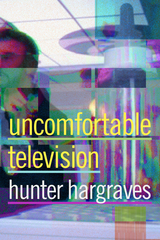 Uncomfortable Television
Hunter Hargraves
Duke University Press, 2023 From The Wire to Intervention to Girls, postmillennial American television has dazzled audiences with novelistic seriality and cinematic aesthetics. Yet this television is also more perverse: it bombards audiences with misogynistic and racialized violence, graphic sex, substance abuse, unlikeable protagonists, and the extraordinary exploitation of ordinary people. In Uncomfortable Television, Hunter Hargraves examines how television makes its audiences find pleasure through feeling disturbed. He shows that this turn to discomfort realigns collective definitions of family and pleasure with the values of neoliberal culture. In viscerally violent dramas, cringeworthy ironic comedies, and trashy reality programs alike, televisual unease trains audiences to survive under late capitalism, which demands that individuals accept a certain amount of discomfort, dread, and irritation into their everyday lives. By highlighting how discomfort has been central to the reorganization and legitimization of television as an art form, Hargraves demonstrates television’s role in assimilating viewers into worlds marked by precarity, perversity, and crisis.
Uncommon Contexts: Encounters between Science and Literature, 1800-1914
Ben Marsden
University of Pittsburgh Press, 2013 Britain in the long nineteenth century developed an increasing interest in science of all kinds. Whilst poets and novelists took inspiration from technical and scientific innovations, those directly engaged in these new disciplines relied on literary techniques to communicate their discoveries to a wider audience. The essays in this collection uncover this symbiotic relationship between literature and science, at the same time bridging the disciplinary gulf between the history of science and literary studies. Specific case studies include the engineering language used by Isambard Kingdom Brunel, the role of physiology in the development of the sensation novel and how mass communication made people lonely.
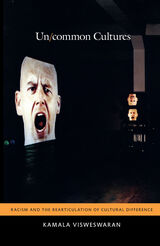 Un/common Cultures: Racism and the Rearticulation of Cultural Difference
Kamala Visweswaran
Duke University Press, 2010 In Un/common Cultures, Kamala Visweswaran develops an incisive critique of the idea of culture at the heart of anthropology, describing how it lends itself to culturalist assumptions. She holds that the new culturalism—the idea that cultural differences are definitive, and thus divisive—produces a view of “uncommon cultures” defined by relations of conflict rather than forms of collaboration. The essays in Un/common Cultures straddle the line between an analysis of how racism works to form the idea of “uncommon cultures” and a reaffirmation of the possibilities of “common cultures,” those that enact new forms of solidarity in seeking common cause. Such “cultures in common” or “cultures of the common” also produce new intellectual formations that demand different analytic frames for understanding their emergence. By tracking the emergence and circulation of the culture concept in American anthropology and Indian and French sociology, Visweswaran offers an alternative to strictly disciplinary histories. She uses critical race theory to locate the intersection between ethnic/diaspora studies and area studies as a generative site for addressing the formation of culturalist discourses. In so doing, she interprets the work of social scientists and intellectuals such as Elsie Clews Parsons, Alice Fletcher, Franz Boas, Louis Dumont, Claude Lévi-Strauss, Clifford Geertz, W. E. B. Du Bois, and B. R. Ambedkar.
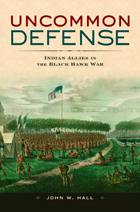 Uncommon Defense: Indian Allies in the Black Hawk War
John W. Hall
Harvard University Press, 2009 In the spring of 1832, when the Indian warrior Black Hawk and a thousand followers marched into Illinois to reoccupy lands earlier ceded to American settlers, the U.S. Army turned to rival tribes for military support. Elements of the Menominee, Dakota, Potawatomi, and Ho Chunk tribes willingly allied themselves with the United States government against their fellow Native Americans in an uncommon defense of their diverse interests. As the Black Hawk War came only two years after the passage of the Indian Removal Act and is widely viewed as a land grab by ravenous settlers, the military participation of these tribes seems bizarre. What explains this alliance?
In order to grasp Indian motives, John Hall explores their alliances in earlier wars with colonial powers as well as in intertribal antagonisms and conflicts. In the crisis of 1832, Indians acted as they had traditionally, leveraging their relationship with a powerful ally to strike tribal enemies, fulfill important male warrior expectations, and pursue political advantage and material gain. However, times had changed and, although the Indians achieved short-term objectives, they helped create conditions that permanently changed their world.
Providing a rare view of Indian attitudes and strategies in war and peace, Hall deepens our understanding of Native Americans and the complex roles they played in the nation’s history. More broadly, he demonstrates the risks and lessons of small wars that entail an “uncommon defense” by unlikely allies in pursuit of diverse, even conflicting, goals.
 Uncommon Goods: Global Dimensions of the Readymade
Jaimey Hamilton Faris
Intellect Books, 2013 Since Marcel Duchamp created his “readymades” a century ago—most famously christening a urinal as a fountain— the practice of incorporating commodity objects into art has become ever more pervasive. Uncommon Goods traces one particularly important aspect of that progression: the shift in artistic concern toward the hidden ethical dimensions of global commerce. Jaimey Hamilton Faris discusses the work of, among many others, Ai Weiwei, Cory Arcangel, Thomas Hirschhorn, and Santiago Sierra, reading their artistic explorations as overlapping with debates about how common goods hold us and our world in common. The use of readymade now registers concerns about international migrant labor, outsourced manufacturing, access to natural resources, intellectual copyright, and the commoditization of virtual space. In each chapter, Hamilton Faris introduces artists who exemplify the focus of readymade aesthetics on aspects of global commodity culture, including consumption, marketing, bureaucracy, labor, and community. She explores how materially intensive, “uncommon” aesthetic situations can offer moments to meditate on the kinds of objects, experiences, and values we ostensibly share in the age of globalization. The resulting volume will be an important contribution to scholarship on readymade art as well as to the study of materiality, embodiment, and globalization.
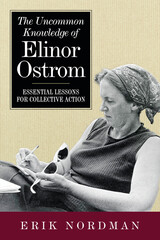 The Uncommon Knowledge of Elinor Ostrom: Essential Lessons for Collective Action
Erik Nordman
Island Press, 2021 In the 1970s, the accepted environmental thinking was that overpopulation was destroying the earth. Prominent economists and environmentalists agreed that the only way to stem the tide was to impose restrictions on how we used resources, such as land, water, and fish, from either the free market or the government. This notion was upended by Elinor Ostrom, whose work to show that regular people could sustainably manage their community resources eventually won her the Nobel Prize. Ostrom’s revolutionary proposition fundamentally changed the way we think about environmental governance.
In The Uncommon Knowledge of Elinor Ostrom, author Erik Nordman brings to life Ostrom’s brilliant mind. Half a century ago, she was rejected from doctoral programs because she was a woman; in 2009, she became the first woman to win the Nobel Prize in Economics. Her research challenged the long-held dogma championed by Garrett Hardin in his famous 1968 essay, “The Tragedy of the Commons,” which argued that only market forces or government regulation can prevent the degradation of common pool resources. The concept of the “Tragedy of the Commons” was built on scarcity and the assumption that individuals only act out of self-interest. Ostrom’s research proved that people can and do act in collective interest, coming from a place of shared abundance. Ostrom’s ideas about common resources have played out around the world, from Maine lobster fisheries, to ancient waterways in Spain, to taxicabs in Nairobi. In writing The Uncommon Knowledge of Elinor Ostrom, Nordman traveled extensively to interview community leaders and stakeholders who have spearheaded innovative resource-sharing systems, some new, some centuries old. Through expressing Ostrom’s ideas and research, he also reveals the remarkable story of her life.
Ostrom broke barriers at a time when women were regularly excluded from academia and her research challenged conventional thinking. Elinor Ostrom proved that regular people can come together to act sustainably—if we let them. This message of shared collective action is more relevant than ever for solving today’s most pressing environmental problems.
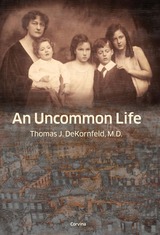 An Uncommon Life
Thomas J. DeKornfeld
Central European University Press, 2015 The pages of this book reveal a truly uncommon life obtained from a highly credible and competent source. The author of the recollections, Tamás Kornfeld, i.e. Thomas DeKornfeld, M.D, was born into one of the richest families in Hungary in 1924. The young man clearly had practically unlimited opportunities but chose a medical career in order to help poor people. These plans came to naught after the German occupation of Hungary in March, 1944. Fortunately he and his family were able to leave Hungary under an agreement with the Germans and were taken safely to Portugal. Thomas came to the United States in 1945 and, after some military service, resumed his education culminating eventually in a professorship in anesthesiology. He was most active in the development of education in respiratory care and is the author of some seventy papers and books. In the present volume he not only clearly demonstrates his deep obligation to his adopted country but also gives a sharp and sometimes incisive picture of his childhood, youth and extended family.
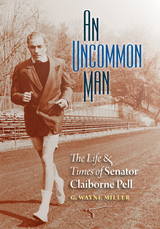 An Uncommon Man: The Life and Times of Senator Claiborne Pell
G. Wayne Miller
University Press of New England, 2011 Claiborne Pell (1918–2009) was Rhode Island’s longest serving U.S. senator, with six consecutive terms from 1961 to 1997. A liberal Democrat, Pell is best known as the sponsor of the Pell Grants. He was also the force behind the creation of the National Endowment for the Arts and the National Endowment for the Humanities, and a visionary in high-speed rail transportation and other areas. An early environmentalist and opponent of the Vietnam War, Pell left his mark on several treaties and peace initiatives. Born into the wealthy family that settled the Bronx, New York, Pell married Nuala O’Donnell, an heiress to the A&P fortune. He lived on the waterfront in exclusive Newport, Rhode Island, yet was a favorite of blue-collar voters. Frugal and quirky, he believed in ESP and UFOs, and was often seen jogging in a sports coat and shorts. Both his hard work and his personality left an indelible mark on this small but influential state—and on America. This lively biography was written with the cooperation of the senator’s family, and with exclusive access to family records and the extensive archives at the University of Rhode Island.
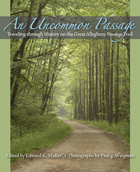 An Uncommon Passage: Traveling through History on the Great Allegheny Passage Trail
Edward K. Muller
University of Pittsburgh Press, 2009 The Great Allegheny Passage Trail forms a hiking and biking route stretching approximately 150 miles from Pittsburgh, Pennsylvania, to Cumberland, Maryland, where it connects with the C&O Canal Towpath to reach Washington, DC. The trail is the culmination of many years of work by the Allegheny Trail Alliance, which joined seven separate trail organizations from Pennsylvania and Maryland to acquire and develop the land. Formerly an Indian path, trade route, military road, railway link, and part of the original National Road-the trail is truly a path to American history.
An Uncommon Passage guides readers through the fascinating story of this trail, as a critical link in the western expansion of colonial America, and a pathway to the development of the Southwestern Pennsylvania region. The book explores the British outposts and forts, early settlers and frontier life, developing towns and cities, rise and predominance of industry, later environmentalism and preservation, natural resources, rivers, flora and geological features that comprise the trail and its environs.
The engaging narrative is complemented by an extensive selection of historical illustrations and the contemporary photography of Paul g. Wiegman, all of which reveal the stunning scenery and pictorial history of the region. An Uncommon Passage offers a journey through both time and space to capture the heritage and surroundings of a region that would grow to prosper and help build a nation.
 Uncommon Prayer: Prayer in Everyday Experience
Michael Plekon
University of Notre Dame Press, 2016 In Uncommon Prayer: Prayer in Everyday Experience, Michael Plekon wants to change our minds on what constitutes prayer. In doing so, he makes a theological claim that to understand different aspects of the Christian life as prayer, one encourages everyday life to be understood as carrying religious import; prayer and the religious life are not restricted to special places and times, but are open to all believers at all times. Plekon examines the works of diverse authors, including many who have challenged the status quo of institutional churches. He asks us to listen to what poets, writers, activists, and others tell us about how they pray at work and at home, with colleagues, family, and friends, in all the experiences of life, from joy to suffering, sadness to hope. Among them are Sarah Coakley, Rowan Williams, Heather Havrilesky, Sara Miles, Thomas Merton, Mary Oliver, Christian Wiman, Mary Karr, Barbara Brown Taylor, Dorothy Day, Maria Skobtsova, Paul Evdokimov, Seraphim of Sarov, and Richard Rohr. Plekon argues that prayer encompasses a much wider variety of activity than formal and liturgical prayers and that, by recognizing such aspects of prayer, the believer is made more receptive to transformative aspects of prayerful attitudes.
"Many books on prayer, even for a more academic audience, are rather thin on contemporary authors. This book does a fine job of looking carefully at a number of important, contemporary theologians (in a broad sense of this term) who write on this topic. This should be an important book for scholars, students, and thoughtful readers in the field of spirituality and spiritual theology. I think that many scholars and students in the various pastoral and practical theological disciplines would find it interesting and worth reading." —Alan G. Padgett, Luther Seminary
Uncommon Quotes for Library Lovers
ALA Editions
American Library Association, 2021 Celebrate librarianship and the love of libraries with this new collection of quotes!
Included are 100 of the most insightful, thought-provoking, and uplifting aphorisms about books, the joy of reading, intellectual freedom, and librarianship. You’ll find quotes from authors such as Celeste Ng, Suheir Hammad, Azar Nafisi, Junot Díaz, and Ta-Nehisi Coates; entertainers like Ziggy Marley and Stephen Colbert; and leaders such as Malala Yousafzai—all highlighting the impact of libraries and librarians.
This diverse and delightful collection makes a perfect gift for showing your appreciation to valued colleagues, volunteers, board members, and bibliophiles. And your purchase funds advocacy, awareness, and accreditation programs for library and information professionals worldwide!
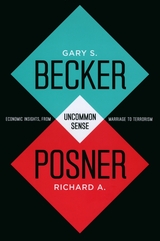 Uncommon Sense: Economic Insights, from Marriage to Terrorism
Gary S. Becker and Richard A. Posner
University of Chicago Press, 2009 On December 5, 2004, the still-developing blogosphere took one of its biggest steps toward mainstream credibility, as Nobel Prize–winning economist Gary S. Becker and renowned jurist and legal scholar Richard A. Posner announced the formation of the Becker-Posner Blog. In no time, the blog had established a wide readership and reputation as a reliable source of lively, thought-provoking commentary on current events, its pithy and profound weekly essays highlighting the value of economic reasoning when applied to unexpected topics. Uncommon Sense gathers the most important and innovative entries from the blog, arranged by topic, along with updates and even reconsiderations when subsequent events have shed new light on a question. Whether it’s Posner making the economic case for the legalization of gay marriage, Becker arguing in favor of the sale of human organs for transplant, or even the pair of scholars vigorously disagreeing about the utility of collective punishment, the writing is always clear, the interplay energetic, and the resulting discussion deeply informed and intellectually substantial. To have a single thinker of the stature of a Becker or Posner addressing questions of this nature would make for fascinating reading; to have both, writing and responding to each other, is an exceptionally rare treat. With Uncommon Sense, they invite the adventurous reader to join them on a whirlwind intellectual journey. All they ask is that you leave your preconceptions behind.
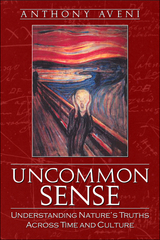 Uncommon Sense: Understanding Nature's Truths Across Time and Culture
Anthony Aveni
University Press of Colorado, 2006 The divide between teaching “intelligent design” and evolution in U.S. schools has brought to the public eye a struggle that archaeoastronomer Anthony Aveni argues is as old as culture itself. All societies seek to understand the natural world, but their search is shaped by culturally distinct views and experiences. In Uncommon Sense, Aveni explores the common and conflicting ways that ancient and contemporary societies have searched for the literal truth about the natural world’s mysteries, from dinosaur bones to the Star of Bethlehem. Aveni demonstrates that a society’s approach to making sense of the natural world can serve as a working definition of its culture, so strongly does it resonate with fundamental values and assumptions. In ten fascinating essays, Aveni examines topics that have absorbed scientists, religious figures, and ordinary citizens over the centuries. He traces the tug of war between astronomy and astrology, reveals the underpinnings of our notions of cartography and the representation of space and time, and much more. Readers interested in science, history, and world cultures will revel in this celebration of different cultures’ common and uncommon questions and conclusions about the natural world.
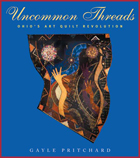 Uncommon Threads: Ohio's Art Quilt Revolution
Gayle A. Pritchard
Ohio University Press, 2006 Ohio’s long quiltmaking heritage prepared the wayfor the contemporary “pioneer” artists of the 1970s and 1980s, who, through individual vision and dedication, have created a new art form and added a new chapter to quilt history. Uncommon Threads: Ohio’s Art Quilt Revolution reveals for the first time the remarkable role Ohio artists, curators, institutions, and organizations have played in the evolution of today’s internationalart quilt movement.
Against the backdrop of America’s counterculture and civil rights movements, author Gayle A. Pritchard’s compelling narrative threads its way through the emergence of the art quilt, from artists working in isolation to the explosive “big bang” of the first Quilt National and its inevitable reverberations. Pritchard provides a fascinating and personal glimpse into the private world of these unique artists through in-depth interviews, rare photographs, and abundant quilt illustrations.
As Uncommon Threads demonstrates, the art quilt movement could not have occurred without Ohio’s unparalleled contribution. Quilt lovers around theworld will relish discovering this tale of the uncommon energy, vision, creativity, and devotion to self-expression that truly made a quilt revolution.
The Uncommon Tongue: The Poetry and Criticism of Geoffrey Hill
Vincent Sherry
University of Michigan Press, 1987 In the analysis of Hill’s poetry and critical ideas, Vincent Sherry illuminates Hill’s often obscure and oblique language, drawing connections between the rich verbal textures of the verse and the poet’s recurring concerns as a critic. The author focuses on Hill’s work in the context of postwar British literature and relates it to American as well as British extensions of literary modernism. The result is an engaging and far-ranging study of one of England’s most contemporary poets.
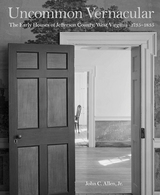 Uncommon Vernacular: The Early Houses of Jefferson County, West Virginia, 1735-1835
John C. Allen, Jr.
West Virginia University Press, 2011 Within the picturesque borders of Jefferson County, West Virginia remain the vestiges of a history filled with Civil War battles and political rebellion. Yet also woven into the historical landscapeof this small county nestled within the Shenandoah Valley is an unusual collection of historic homes. In this fascinating architectural exploration, John C. Allen, Jr. details his expansive seven-year survey of Jefferson County’s historic residences. By focusing on dwellings built from the mid-eighteenth century to the arrival of the railroad and canal in 1835, Allen unfolds the unique story of this area’s early building traditions and architectural innovations. The 250 buildings included in this work—from the plantation homes of the Washington family to the log houses of yeomen farmers—reveal the unique development of this region, as Allen categorizes structures and establishes patterns of construction, plan, and style.
Allen’s refreshing perspective illuminates the vibrant vernacular architecture of Jefferson County, connecting the housing of this area to the rich history of the Shenandoah Valley. Varying features of house siting, plan types, construction techniques, building materials, outbuildings, and exterior and interior detailing illustrate the blending of German, Scots-Irish, English, and African cultures into a distinct, regional style.
Adorned with over seven hundred stylish photographs by Walter Smalling and elegant drawings, floor plans, and maps by Andrew Lewis, Uncommon Vernacular explores and preserves this historic area’s rich architectural heritage.
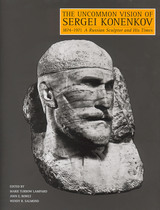 The Uncommon Vision of Sergei Konenkov, 1874-1971: A Russian Sculptor and His Times
Lampard, Marie Turbow
Rutgers University Press, 2001 Sergei Konenkov was one of this century's most distinguished Russian artists. A celebrated sculptor, he was a leading figure of the young Soviet art establishment in the early 1920s. After spending over twenty years in the United States, he returned to the Soviet Union in 1945 to become a respected member of the Soviet art world. The mentor to an entire generation of Soviet sculptors, he was renowned for his personal charisma and artistic versatility. This collection of essays, interviews, and personal reminiscences is the first appraisal of his work and life published outside of Russia. The contributors view Konenkov’s work within a variety of cultural, artistic, and philosophical contexts. With particular attention to his awareness of both indigenous Russian traditions and European innovations, they trace the many stages of his artistic development as he explored and experimented with techniques borrowed from Realism, Symbolism, salon portraiture, African wood carving, Socialist Realism, and Surrealism. The many different historical sources that inspired Konenkov’s artistic expression, from Orthodox Christianity and the folklore of the Russian peasantry to the Egyptian pyramids and pre-classical antiquity are also discussed. The contributors also explore the relationship of Konenkov's life and ideology to art, and the effects of expatriation on creativity. Illustrated with dozens of photographs of Konenkov’s art, this study of one of the most enigmatic and fascinating artists of the modern period will accompany an exhibition at The Jane Voorhees Zimmerli Art Museum.
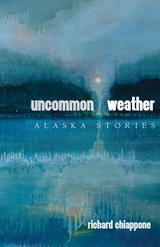 Uncommon Weather: Alaska Stories
Richard Chiappone
University of Alaska Press, 2024 Uncommon Weather is an eclectic mix of character-driven stories that delivers a panoramic picture of Alaska— from the cold city streets of Anchorage to picturesque but emotionally treacherous small Alaska towns; from the rough-and-tumble commercial fishing world of the distant Aleutian Islands to a remote river in the Brooks Range, where the vast and unforgiving Arctic wilderness puts romance to a severe test.
Richard Chiappone’s characters hail from a wide range of socioeconomic strata, each one attempting to figure out the difficult question of how best to live among others. Odd connections abound. In the seriocomic title story, a lonely middle-aged woman, weary of her austere Alaskan life and her crumbling marriage, picks up a hockey stick and a younger man and tries to brawl her way to some better future. A man diagnosed with an apparently terminal illness is caught up in a catastrophic criminal undertaking masterminded by a precocious seventeen-year-old girl. A young boy, determined to fit in with his edgier peers, goes through a metamorphosis, becoming a strange new creature he’s never seen before. With sometimes hilarious missteps, each character stumbles in and out of predicaments that are by turns tender, heartbreaking, dangerous, and even violent.
Told with great empathy and often deeply ironic, wry, and sardonic humor, these stories are a counterpoint to the usual mythos, illuminating an Alaska not usually portrayed in books, on TV, or in movies.
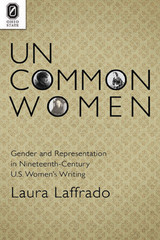 Uncommon Women: Gender and Representation in Nineteenth-Century U.S. Women's Writing
Laura Laffrado
Ohio State University Press, 2009 Uncommon Women discusses provocative, highly readable, nineteenth-century American texts that complicate notions of self-writing and female agency. This feminist study considers the generic forms, language, and illustrations of a group of complex and often daring texts, including Sarah Kemble Knight’s unconventional travel Journal (1825); Fanny Fern’s controversial newspaper essays (1851–72); Civil War nurse Louisa May Alcott’s Hospital Sketches (1863); and cross-dressed soldier’s S. Emma E. Edmonds’s Nurseand Spy in the Union Army (1865), along with later women’s war reminiscences. The study concludes with a fresh reading of neglected aspects of Harriet Jacobs’s Incidents in the Life of a Slave Girl (1861), the primary Black female autobiographical text of the century, which fundamentally displays what whiteness enabled. Uncommon Women reveals attempts of white middle-class women to both violate and align themselves with gendered assumptions. In doing so, it makes visible the ways in which these texts disputed restrictive female constructions, tested boundaries of race and class, and anticipated reaction to their disruptive discourses. The resulting conflicted self-representations illuminate the vexed contours of women’s autobiography. This study’s findings make plain the impact of white/male discourses of gender on women’s self-narrativeand illustrate how unconventional women were pressured to embrace domesticity, heterosexuality, marriage, motherhood, and political passivity.
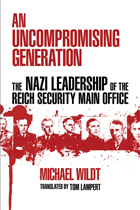 An Uncompromising Generation: The Nazi Leadership of the Reich Security Main Office
Michael Wildt
University of Wisconsin Press, 2009 In An Uncompromising Generation, Michael Wildt follows the journey of a strikingly homogenous group of young academics—who came from the educated, bourgeois stratum of society—as they started to identify with the Nazi concept of Volksgemeinschaft, which labeled Jews as enemies of the people and justified their murder.
Wildt’s study traces the intellectual evolution of key members of the Reich Security Main Office (RSHA) from their days as students until the end of World War II. Established in 1939, this office fused together the Gestapo, the Criminal Police, and the Sicherheitsdienst (Security Service) of the SS. Far from being small cogs in a big bureaucratic machine, Wildt finds that the people who made up the RSHA constructed the concepts and operated the apparatus that carried out the Holocaust.
At the center of both theory and practice of persecution and genocide in Nazi-occupied Europe, these young men of the RSHA—none of whom envisioned the systematic annihilation of the European Jews—became radicalized. How this occurred is the central question of Wildt’s book. Wildt also discusses the postwar careers of the members of the RSHA. Strikingly, he shows how the leaders of the RSHA evaded the consequences of their actions under the Nazi regime and went on to have important careers in the rebuilt West Germany. An alternate selection of the History Book Club and Military Book Club
 Uncompromising Positions: God, Sex, and the U.S. House of Representatives
Elizabeth Anne Oldmixon
Georgetown University Press, 2005 Cultural factions are an intrinsic part of the fabric of American politics. But does this mean that there is no room for compromise when groups hold radically different viewpoints on major issues? Not necessarily. For example, in a June 2003 Time/CNN poll, 49% of respondents identified themselves as pro-choice and 46% identified as pro-life. But in the same poll, 81% indicated that abortion should be "always legal" or "sometimes legal," suggesting that "pro-life" and "pro-choice" are not discrete positions but allow room for compromise. How do legislators legislate policy conflicts that are defined in explicitly cultural terms such as abortion, gay marriage, and school prayer? American political institutions are frequently challenged by the significant conflict between those who embrace religious traditionalism and those who embrace progressive cultural norms. Uncompromising Positions: God, Sex, and the U.S. House of Representatives investigates the politics of that conflict as it is manifested in the proceedings of the U.S. House of Representatives. Oldmixon traces the development of these two distinct cultures in contemporary American politics and discusses the decision-making and leadership tactics used by legislators to respond to this division of values. She argues that cultural conflict produces an absolutist politics that draws on religious values not amenable to compromise politics. One possible strategy to address the problem is to build bipartisan coalitions. Yet, interviews with House staffers and House members, as well as roll calls, all demonstrate that ideologically driven politicians sacrifice compromise and stability to achieve short-term political gain. Noting polls that show Americans tend to support compromise positions, Oldmixon calls on House members to put aside short-term political gain, take their direction from the example of the American public, and focus on finding viable solutions to public policy—not zealous ideology.
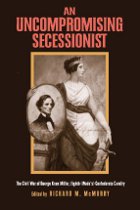 An Uncompromising Secessionist: The Civil War of George Knox Miller, Eighth (Wade's) Confederate Cavalry
George Knox Miller, edited by Richard M. McMurry
University of Alabama Press, 2006 Offers significant insight into the life, heart, mind, and attitudes of an intelligent, educated, young mid-19th-century white Southerner This book contains the letters of George Knox Miller who served as a line officer in the Confederate cavalry and participated in almost all of the major campaigns of the Army of Tennessee. He was, clearly, a very well-educated young man. Born in 1836 in Talladega, Alabama, he developed a great love for reading and the theater and set his sights upon getting an education that would lead to a career in law or medicine; meanwhile he worked as an apprentice in a painting firm to earn tuition. Miller then enrolled in the University of Virginia, where he excelled in his studies.
Eloquent, bordering on the lyrical, the letters provide riveting first-hand accounts of cavalry raids, the monotony of camp life, and the horror of battlefield carnage. Miller gives detailed descriptions of military uniforms, cavalry tactics, and prison conditions. He conveys a deep commitment to the Confederacy, but he was also critical of Confederate policies that he felt hindered the army's efforts. Dispersed among these war-related topics is the story of Miller's budding relationship with Celestine “Cellie” McCann, the love of his life, whom he would eventually marry.
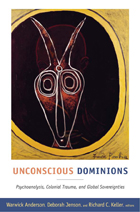 Unconscious Dominions: Psychoanalysis, Colonial Trauma, and Global Sovereignties
Warwick Anderson, Deborah Jenson, and Richard C. Keller, eds.
Duke University Press, 2011 By the 1920s, psychoanalysis was a technology of both the late-colonial state and anti-imperialism. Insights from psychoanalysis shaped European and North American ideas about the colonial world and the character and potential of native cultures. Psychoanalytic discourse, from Freud’s description of female sexuality as a “dark continent” to his conceptualization of primitive societies and the origins of civilization, became inextricable from the ideologies underlying European expansionism. But as it was adapted in the colonies and then the postcolonies, psychoanalysis proved surprisingly useful for theorizing anticolonialism and postcolonial trauma. Our understandings of culture, citizenship, and self have a history that is colonial and psychoanalytic, but, until now, this intersection has scarcely been explored, much less examined in comparative perspective. Taking on that project, Unconscious Dominions assembles essays based on research in Australia, Brazil, France, Haiti, and Indonesia, as well as India, North Africa, and West Africa. Even as they reveal the modern psychoanalytic subject as constitutively colonial, they shed new light on how that subject went global: how people around the world came to recognize the hybrid configuration of unconscious, ego, and superego in themselves and others. Contributors
Warwick Anderson
Alice Bullard
John Cash
Joy Damousi
Didier Fassin
Christiane Hartnack
Deborah Jenson
Richard C. Keller
Ranjana Khanna
Mariano Plotkin
Hans Pols
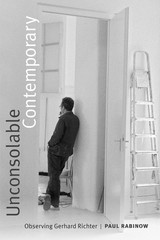 Unconsolable Contemporary: Observing Gerhard Richter
Paul Rabinow
Duke University Press, 2017 In Unconsolable Contemporary Paul Rabinow continues his explorations of "a philosophic anthropology of the contemporary." Defining the contemporary as a moving ratio in which the modern becomes historical, Rabinow shows how an anthropological ethos of the contemporary can be realized by drawing on the work of art historians, cultural critics, social theorists, and others, thereby inventing a methodology he calls anthropological assemblage. He focuses on the work and persona of German painter Gerhard Richter, demonstrating how reflecting on Richter's work provides rich insights into the practices and stylization of what, following Aby Warburg, one might call "the afterlife of the modern." Rabinow opens with analyses of Richter's recent Birkenau exhibit: both the artwork and its critical framing. He then chronicles Richter's experiments in image-making as well as his subtle inclusion of art historical and critical discourses about the modern. This, Rabinow contends, enables Richter to signal his awareness of the stakes of such theorizing while refusing the positioning of his work by modernist critical theorists. In this innovative work, Rabinow elucidates the ways meaning is created within the contemporary.
|
|

